#you can’t choose in relation to whom you form a connection
Explore tagged Tumblr posts
Text
Aromantic*
(Alternate Title: Schrödinger’s Romantic)
I keep wondering if “aromantic” is really a good word to describe my romantic orientation. I have plenty of reasons for why it is, but also plenty of reasons for why it might not be. Schrödinger’s romantic.
In order to know whether you experience romantic attraction or not, you first have to have a solid definition of what romantic attraction is. A definition which is clear, and also distinct from other forms of emotional attraction. I don’t think such a definition exists, or at least, it’s not commonplace.
“Romantic attraction: attraction that makes people desire romantic contact or interaction with another person or persons.” - UNC Chapel Hill LGBT Center
But what is romantic contact or interaction? Is it contact which is culturally considered romantic? In that case, the ways in which romantic attraction is defined would vary by culture, and even by gender. Or is it contact which one intends to be romantic? That would make sense, but is incredibly subjective. How do you know where to draw the line? What if you haven’t drawn one?
“[Romantic attraction] involves a combination of physical, sexual, and emotional feelings toward someone.” - WebMD
This definition is ridiculously vague, especially for a page which defines multiple other types of attraction in relation to romance. What physical feelings? What sexual feelings? What emotional feelings? What about alloromantic asexual people, or other varioriented people, who don’t necessarily experience sexual feelings as part of their romantic feelings?
But the article also defines aromanticism as “when you don’t have any desire for a romantic relationship,” so I can’t count on it for accuracy regardless.
“Romantic attraction is the internal pull that you experience when you are with someone with whom you internally feel connected, comfortable and interested in spending more of your life with.” - Choosing Therapy
Do people not feel connected to their friends? Do people not feel comfortable with their friends? Are people not interested in spending more of their life with their friends? Why else would people find time to connect with their friends, to confide in them, to engage with them? What about these feelings is distinctly romantic?
The article goes on to say this:
“Romantic relationships are relationships intentionally initiated and maintained for experiencing sexual and romantic feelings together, whereas platonic relationships are usually centered on another purpose like hobbies, friendship, support, work, etc. Romantic relationships can also include these purposes as well, but the platonic relationship excludes the romance and sexual feelings.” - Choosing Therapy
I ask again, what about alloaces and other varioriented people? What about people who have sex with their friends? Even when it’s taboo, it’s not unheard of. The distinction can’t be sex, so it has to be romance. So, what is romance?
Later in the article, it defines romance once again:
“Romantic attraction: The internal pull that draws your attention to the other person’s positive qualities, and your internal reaction to connect, love, share and spend time with them to have more romance.” - Choosing Therapy
I feel like I’m running in circles here. People draw their attention to the positive qualities of not just romantic interests, but to friends, family, and other people with whom they’d have no romantic interest. Connection, love, and spent time are not exclusive to romance either. If the goal is to have more romance… What is that?
Every answer I find fails to say what romance is on its own. The definitions always rely on presence or absence of sex, or other things which can just as easily be present in platonic or otherwise non-romantic contexts. Romantic attraction is consistently defined by things which are not distinctly romantic.
Is it even a real thing? I mean, I feel like it’s clearly not, but it’s also clearly very real to most people. Most people don’t think about it this hard. It’s like they were given a manual that I can never possess. It comes naturally to them. They feel romantic attraction, and they know, intuitively, that that’s what it is.
Is my lack of intuition evidence that I don’t experience romantic attraction, or am I just autistic? Maybe it’s both. When I described to my aunts my emotional attraction, they described my way of experiencing and perceiving attraction as very “intellectual,” which I initially rejected. But I think they were right. I lack the intuition to understand my feelings in any way that doesn’t involve a literal or metaphorical chart. It’s something I can’t just feel and then know like other people do.
Is romantic attraction always a “you’ll know it when you feel it” sort of thing? It seems like it. Even when I search “romantic attraction” on Google, many results either come from queer Fandom Wiki pages, discussions amongst a-spec people, Reddit, or Quora. Some results aren’t even relevant to the question, including multiple results which just describe what “aromantic” means. The opposite of what I intended to search for.
The thing is, I do have feelings which would likely be perceived as romantic to most people. I have a deep desire for commitment and companionship. To touch and be touched. To love and be loved. To be emotionally and physically intimate with other people. To feel the warmth of other people as we lay in bed together. To live out our mundane lives together. Things that most people would find incredibly romantic.
But are these things romantic if I don’t explicitly intend for them to be? Is it romantic for me to be open to it being romantic, without actively wanting that?
When I’ve described my feelings online, I’ve gotten mixed responses from other people, but I’ve generally been given similar advice from different strangers, and similar labels thrown at me, even when I hadn’t asked for advice or labels.
“I think you’d enjoy a queerplatonic relationship.”
“You might be cupioromantic.”
“You might be bellusromantic.”
And I can understand where they’re coming from. I don’t think they’re entirely wrong, either. I would enjoy a queerplatonic relationship… But not for any reason that wouldn’t apply to other committed relationship types. Queerplatonic relationships, platonic relationships, romantic relationships, and whatever else there is are the same to me in all but label.
Cupioromanticism is something I have considered. I made the flag for it when I was 15 years old as well (yes, the peach one with five stripes; I always asked to be credited anonymously), so I’m biased towards liking the flag. But the definition is “being aromantic, and also wanting a romantic relationship.”
I don’t specifically want a romantic relationship, but I do want committed relationships in general, and romantic relationships are included in that. So, maybe?
Bellusromantic is something I have also considered, and it also has a pretty flag. But I think it’s less accurate than cupioromantic. The definition is “being aromantic, and enjoying traditionally romantic things, but not wanting a romantic relationship (or not wanting a committed relationship, depending on the definition used).”
I do enjoy traditionally romantic things in a way which is not explicitly romantic, and I don’t explicitly want a romantic relationship. But I’m not opposed to romantic relationships, and I do explicitly want committed relationships.
I took some aro-spec tests, and my results had a tendency to skew towards cupioromantic, bellusromantic, and quoiromantic. Quoiromantic is another orientation which I have considered, and it might be the most accurate.
Quoiromantic is also aptly known as “whatromantic” or “WTFromantic” because the defining trait is that romantic attraction as a concept doesn’t make sense to you.
“[Quoiromantic], also known as [whatromantic] or [WTFromantic], is a [romantic] orientation defined by confusion, vagueness, and/or obscurity. A [quoiromantic] person may not understand or relate to the concepts of [romantic] attraction and/or [romantic] orientation. [Quoiromanticism] may involve confusion related to what [romance] is, whether or not one experiences [romantic attraction], and how to differentiate it from other forms of attraction. [Quoiromanticism] can also feel blurry and unclear, and may center around general confusion around one's identity and attraction. It can also refer to a lack of identification with [romantic] orientation as a concept, and can additionally serve as a label for people who cannot fit into more specific identities. [Quoiromanticism] can also refer to when one does not experience [romantic] attraction in a "traditional" manner. It is sometimes used as a catch-all term for people who know they're somewhere on the [aromantic] spectrum, but aren't sure where.” - An LGBTQIA+ Wiki (originally about quoisexuality; I changed some words.)
In a similar vein, pomoromantic (“pomo” being literally taken from “postmodern”) would also fit. My romantic orientation exists from a post-romantic perspective, where romance is understood to be made up bogus which isn’t actually fundamentally different from any other form of emotional connection.
“[Pomoromanticism] is defined as refusing, avoiding, or not fitting any [romantic] orientation label in terms of conventional labels or classifications, such as gay, lesbian, [biromantic], or [aromantic]. It challenges categorizations in favor of largely unmapped possibility and the intense charge that comes with transgression. Some [pomoromantic] people may be queer or questioning, and others may not be.” - Another LGBTQIA+ Wiki (originally about pomosexuality; I changed some words.)
But at that point, is it even worth labeling my romantic orientation? Should I just be bisexual/omnisexual? Maybe with a little asterisk at the end? Does any of this matter? Am I thinking too much? (I am.)
I think that continuing to identify as aromantic will probably close me off to potential relationships. I feel like the word gives people the wrong idea. At the same time, the way that I think about romance is fundamentally different than the way other people tend to, and I do consider my aromanticism to be a notable part of who I am and how I experience the world. Maybe I should just send this to whoever ends up being a potential partner. Probably more useful than any label.
#I originally typed this up as a google doc#and then I decided I wanted to put it here too#especially with the other posts I've been making lol#side note: the cupioromantic flag might be the flag I'm most proud of making. it's a really pretty flag#I originally shared it in an LGBTQ+ discord server in 2020#very happy every time I see people use it#except for Pride Palace because FUCK Pride Palace.#they started selling the cupioromantic pride flag I made and I AM NOT happy about it lol#I'm fine with people using the flag for commercial reasons but I REALLY don't like Pride Palace#I'm not about to ask them to stop selling it though.#just know that their “free flags” are a SCAM and the reviews are obviously fake if you look at the ones on their website#and they're obviously just trying to cash into the LGBTQ+ community without knowing anything about us#anyway cupioromantic pride flag rant = over. tag time#aspec#aromantic#aro#arospec#aro spec#aro spectrum#aromantic spectrum#aromanticism#aromanticity#quoiromantic#cupioromantic#bellusromantic#pomoromantic#queerplatonic#questioning#unlabeled#lgbt
66 notes
·
View notes
Text
a lot of people from older generations are shocked when they see how much our generation cares about those living across the world. they simply can’t conceptualize caring that deeply about people with whom we have such little in common. we can see it in the way ukraine was presented in western media (“they’re europeans, they look like us, this sort of thing doesn’t happen in the west and in places outside the middle east and africa”). the media wanted ukrainians to appear sympathetic to westerners, and it worked.
but when the same plight befalls palestinians, and all these young people care so deeply about them as we did ukrainians, older folks are startled. we’re not supposed to relate so much to a small group from the middle east. we’re not supposed to tie our oppression to theirs. we’re supposed to sympathize with the western-backed military force with all the munition, power, and leeway it could possibly want. because we’re supposed to have empathy only for those who most resemble us.
but what they fail to comprehend is that we see ourselves in others not because of the way we look or what part of the world we’re from, but because of what we love and are passionate about. we, unlike our parents, grew up connected to one another. we made friends around the globe from very young ages, because we didn’t connect with other kids based on how far they lived from us, but rather because of our interests. a boy from england could become best friends with a guy from india in a pokémon chat room. a jewish girl from the US could befriend a muslim girl from palestine in a star wars discord. as we grew up, being fed beliefs about people from other places, the sheer reality of our friendships superseded the stereotypes and bigotry.
so when we became adults and started to obtain power of our own, it became impossible not to care about the very real people who played such pivotal roles in forming of our identities. we see ourselves in them, in their struggles, and their fight becomes just as important as our own fight.
and that’s why those in power have always been so scared of globalization. the more unified we are, the less the arbitrary differences between us can divide us. they matter, because culture and ethnicity and language and belief systems matter. but the place where these things overlap is no longer a sticking point or a barrier, but rather an intersection, where we can come together and share in our dreams of collective liberation.
this realization is nothing new. it is the crux of intersectionality. it is something that anyone who has fought for liberation across history has emphasized as the critical point of their fight. but its imperative to remind ourselves of it nonetheless.
each friendship you make from across the world is another hit at the wall meant to separate us, to keep us from realizing how similar we truly are. each time you empathize with a struggle that is not your own, you’re another voice showing solidarity with the oppressed around the world. every day, choose to live with love and passion as your motivations for every action you take. love as hard as you can, regardless of distance or differences; it’s the radical choice.
#politics#palestine#ukraine#intersectionality#just rambling#bc i j want people to love each other as hard we can#bc that’s how we will guide the next generation into a better world
21 notes
·
View notes
Text
a line that stuck out to me in the new song is “but don’t forget with whom you are associated, which sounds unfair but fair play is overrated”.
because in context it’s referring to olya: yura is threatening to make things worse for olya if dima and anya don’t comply, and is acknowledging that he’s playing dirty, as well as that he is not sorry for that.
but, there is a sort of double meaning to that line, in how it can be applied more broadly, in this song specifically to the siblinghood of yura and anya.
after all, what saves yura from being hurt is anya’s presence, and more specifically their association: he is her brother. that association is involuntary, and therefore kind of unfair, but they can’t do anything about it. it reminds me of the question: “would you be close to your family were you not family? would you ever befriend them, or want to hang out with them or otherwise harbor any positive feelings towards them, were they not your family?”.
familial bond is simultaneously very shallow and very deep. you don’t choose your family, all that unites you is biological or legal relations, you could be completely different people and you could dislike each other but you’re tied together by association you can never truly escape. you may hate your parents and cut them off forever but you’ll still have some quirks or mannerisms that can be tied all the way back to them, and you can’t do anything about it. you may be incredibly close to your sibling and love each other deeply but get the feeling in the back of your mind that were you not born to the same parents you would never want to get to know each other or be friends at all.
and this applies to anya and yura: they don’t really hang out with each other. they know little about each other’s lives and seem to have some distaste for each other. they both befriend mutants from the facility and try to keep them safe, and seemingly are the only ones who could understand each other’s wants and motivations, and yet they do not, because the circumstances of their situations are just too different. they both grew up in the same home situation, and yet their outlooks on it are completely different. yura is comfortable with playing out a certain routine to avoid confronting everything that’s wrong with his life, and after meeting katya he becomes practically desperate to break out of it. anya is frustrated with her life and wants to break out of the routines she’s in, and after meeting dima she becomes practically desperate to preserve them. they prioritize other people in their lives over each other, and yet they are still siblings, so anya cannot watch her brother get hurt, even if he intends to potentially hurt her and dima.
it is unfair. unfair that she still cares about this boy who disregards her safety, wishes and feelings, just because of an involuntary association she can’t break. but it just is.
deep yet shallow connections are everywhere in pafl: katya and dima are both mutants that broke free, both share an understanding of each other’s struggle. she can read him easily and when he sees what he thinks is katya getting attacked, his first reflex is to jump in and protect her. and yet they don’t know each other, their shared escape was purely circumstantial. yura and katya are so deeply bonded to the point where she becomes his primary motivation for like most the things he does, and yet they’ve only known each other for two weeks, and the form their relationship took was unsustainable - there was no way for katya to stay hidden for long. yura and sanya have been friends for a long time, and have both have had influences on each other throughout their friendship. and yet she does not understand him, fails multiple times to see beyond his façade, and several times misinterprets his words or actions.
there are definitely more of these “deep yet shallow” connections between characters, the way they are deeply interconnected yet alienated between each other tying in the way they are alienated from life itself and are dissatisfied with their situations.
and this isn’t even to mention the way mutants are associated with the zone and therefore face negative consequences, which is unfair in itself: the entire reason dima is in this mess is because he is ‘associated’ with the zone, as proven by the glowing cube.
so, the line can be applied to the entire series in general terms: the characters cannot escape association and, by extension, a level of care towards those they might not want to care about. and they cannot escape association, meaning simple association instead of a deeper connection, towards those they actually want to be deeply connected to. and that is unfair.
because, overall, pafl is about the fact that the machinations of a cruel universe don’t really care what’s fair. and how that doesn’t stop any of the characters from desperately struggling against it.
#pafl#parties are for losers#meta#analysis#convergence#ferry#vocaloid#pafl dima#pafl yura#pafl anya#pafl olya#pafl sanya#pafl katya
263 notes
·
View notes
Note
Hello! Thanks for all your insights. I have a question about the nature of Sara’s relationship with Hank. Do you think they had sex, or was it more just do on dates?
hi, anon!
oh, they absolutely have sex!
remember: sara and hank date for over a year in show-time. there's no way that a scoundrel like hank would hang around for that long if all he were getting out of the arrangement were (chaste) nights at the movies or dinners out. after all, he could've had those things with his other girlfriend, elaine, and not gone through all of the trouble of maintaining a complicated and potentially dangerous "double life" where he was stringing two women along otherwise. for him, the whole point of being with sara—i.e., of having a second girlfriend—is so that he can have another woman to have sex with.
and, frankly, while sara downplays that aspect of their relationship in grissom's presence in episode 03x02 "the accused is entitled," the truth is that, for her, her and hank's relationship is largely just about the sex, too.
let’s face it: hank’s pretty, but he ain’t smart enough for the likes of sara sidle. he’s not interesting enough for her, either. he lacks emotional depth. has no poet’s soul. he’s not half the man that gil grissom is.
sara is not dating him for the conversation.
she’s also not dating him for any kind of “love match.”
let’s be real: she’s in the relationship for the companionship—both of the “night out on the town” AND the “between the sheets” kinds.
—because, really, those are the things that she’s not getting from grissom atm.
as i talk about here,
in sara’s mind, she’s been waiting around for grissom to act on their mutual feelings for each other for two and a half years now. she moved to vegas expressly for the purpose of being with him, and he knows it, and she knows it. she thought they were going to date, but then they didn’t, and, ever since, she’s been clinging to that old hope, keeping herself “available” to grissom and trying to be patient until he comes around. she’s been playing the part of the good “work girlfriend” to him, but nothing has come of it. grissom keeps evading her and giving her the runaround, so what choice does she have but to accept that he has no interest in having a romantic relationship with her outside the lab, you know? she can’t keep starving herself of the things she really needs on the off-chance that maybe someday grissom will work up the courage to make a move.
she’s got to live her life.
hank seems like a nice enough guy, and he obviously wants to be with her, so why not go for it with him? it seems like he can give her everything that grissom can’t or won’t: i.e., he can be there for her outside of work, be open about how he feels about her, do activities with her, have sex with her, share a life with her, etc.
sara’s connection with hank remains largely superficial, despite going on for a fairly long time—and, honestly, that’s how sara prefers things.
as i talk about here,
outside of with grissom, sara tends to form shallow—mostly physical—relationships with good-looking guys to whom she does not very deeply relate, either on an intellectual level or a personal one. her m.o. seems to be “find somebody who’s pretty to look at and not altogether intolerable. stay with him until he disappoints you, and then move on. wash, rinse, repeat.”
one might look at this pattern and say that sara simply has poor relationship skills (or, as warrick quips in episode 07x17 “fallen idols,” has bad taste in men), but while that observation isn’t untrue, i think there’s more to the issue than perhaps first meets the eye.
in episode 05x13 “nesting dolls,” sara mentions that she tends to “choose men who are emotionally unavailable”—and my thought is that she does so in order to protect herself from having to be vulnerable with them, and specifically so that she won’t have to talk about her past.
while of course sara has no idea that hank is living a double life and keeping her as his “woman on the side” when she first starts dating him, my sense is that sara is nevertheless on some level aware that hank isn’t going to push her to disclose more than she wants to—that he isn’t really interested in forming a deep, emotional bond.
i gather that what sara says in episode 03x02 “the accused is entitled” about her relationship with hank being mostly about “going to the movies” isn’t altogether a lie (though she does certainly downplay the sexual component to the relationship because grissom is standing right there).
her relationship with hank is mostly a “go to the movies together” kind of relationship—“go to the movies” and have sex, but not necessarily build a life together or bare their souls to each other in any meaningful way. they fit each other in around their busy professional schedules (and, in hank’s case, his relationship with elaine alcott), but there is no sense that their relationship will ever progress or intensify. it’s not as if either one of them anticipates an engagement or marriage to come.
it’s worth noting that, in show time, sara and hank’s relationship spans from january ’02 to may ’03, and yet they never move in together, even though they date for over a year.
that both hank and sara are able to hide big, important parts of their lives from each other with relative ease—hank, the truth about his other girlfriend; sara, the truth about her family background—speaks to the fact that their relationship does remain mostly superficial, right through to the very end.
this arrangement, of course, suits hank because it allows him to keep his two lives—and two girlfriends—very separate from each other. that sara is so aloof makes it easy for him to balance his more domestic life with elaine with his more “fun-based” fling with her. but sara also benefits from this compartmentalization, as she is able to have companionship outside of work (which, in s2 and s3, is something she wants but knows she cannot get from grissom, who would be her first choice to go to otherwise) without ever having to worry that hank will delve too deeply into who she is or where she comes from. because he doesn’t really ask, she doesn’t even have to lie, per se; just keep quiet. as long as their relationship remains focused on sex and shared activities, there is little danger that she will ever have to disclose those truths which she would rather keep private.
while i can’t substantiate my claim, i speculate that had hank ever started to express serious curiosity about sara’s past or seek to deepen their connection, sara would have panicked and immediately ended the relationship.
not just with hank, but with her college boyfriend, doug wilson, and taylor wynard, as well, sara chooses men who are emotionally unavailable as a safeguard against having to become emotionally intimate and/or disclose her past. she so fears that anyone who were to learn the truth about her childhood and family history would reject and think badly of her that she preemptively prevents this from happening by choosing to partner with men who are only too happy to keep their relationships with her at the surface level and based mostly on sex.
to continue from this post,
the same kinds of evasive, aloof behavior that might make another woman start seriously side-eyeing hank and wondering what he was up to are exactly what makes sara feel like it’s okay to be with him for so long.
that he never wants anything more from her than to go out to eat or to the movies, grab a drink, and then head back to her place for some sex before bidding her goodbye for the night is what she considers ideal.
she doesn’t have to worry about him falling in love with her and her being unable to reciprocate (as there is nothing in his comportment that would suggest that his feelings for her run more than skin-deep or even someday could). she also doesn’t have to lie to him because he isn’t curious about or embedded in her life enough to brush up against the topics that she has deigned off-limits for him and everyone else in the world.
if he were a more involved boyfriend or his feelings for her were more serious, she might have to start generating excuses as to why he couldn’t meet her bff from college and staving off his questions about her childhood hopes and dreams and straight-up lying to him about why she doesn’t have a single photograph of her parents displayed anywhere in her apartment. she might also have to examine the moral implications of dating him while knowing full-well that she was still in love with grissom.
that she doesn’t have to do any of those things—and that their relationship remains at the same low level of emotional and social intimacy from start to finish—is the only thing that keeps her with hank for so long, to be honest.
when sara and hank break up, it’s telling that her primary reaction is embarrassment rather than heartache.
to continue from the above-linked post,
she isn’t actually heartbroken about losing hank, as she wasn’t really attached to him to begin with, but him misusing her so heinously—playing her for a fool, treating her like a toy, using her own tendencies against her—does cause her to feel pretty bad about herself and contributes to her already extant sense that something is deeply wrong with her.
she’s not dumb: in hindsight, she realizes that there were a million red flags in their relationship, but she ignored them all because she liked the color.
now she wonders: what kind of fucked-up person is actually happy with an absentee boyfriend? really, what does it say about her that her ideal relationship is one where the guy she’s with is cheating on her and she’s essentially enabling him to do so due to her massive commitment issues?
she realizes, in retrospect, that she was so content with having a relationship that was based pretty much solely in the physical that she “allowed” hank to use her.
the ironic thing, of course, is that prior to finding out about elaine, sara had actually felt somewhat guilty for dating hank while still very much being in love with grissom; it never occurred to her that the road of “i’m using you to get mine because you’re not interested in any kind of deeper connection” could be a two-way street. she had thought she was the one who was being unfair.
it’s a shock to her system when she realizes that hank was being even less emotionally honest than she was the whole time they were together.
anyway.
i’m letting this answer run long now, but the bottom line is: yes, sara and hank absolutely sleep together! they wouldn’t ever had stayed together for so long if not for the sex, in fact.
thanks for the question! please feel welcome to send another any time.
14 notes
·
View notes
Text
On Allegory, Imperfection, and Inadvertent Subversion: A small essay about Akimi Yoshida’s Banana Fish and Salinger’s “A Perfect Day For Bananafish”.
In the story of Banana Fish, Yoshida references Salinger’s short story “A Perfect Day For Bananafish” (which henceforth shall be addressed as “Perfect Day” simply for ease of reading) several different ways, both in-universe and out. It is exceedingly evident that the character of Ash Lynx is heavily based on Seymour Glass, and one might surmise that Banana Fish is an allegorical retelling of “Perfect Day”, especially given that in the original story, Ash Lynx dies of what is arguably a “passive suicide” – that is, when faced with an injury that isn’t immediately fatal, he chooses to bleed out rather than seek help, which when framed as a suicide, parallels the much more violent and sudden suicide of Seymour Glass.
However, this surface-level allegorical reading ignores a very important variable in the story of Banana Fish, namely the counterpart to Ash’s Seymour: Eiji’s Sybil. While Ash and Seymour share many similarities (both are traumatized, troubled geniuses with partly-Irish roots who grew up in New York City), the similarities between Eiji and Sybil are very few. Eiji does symbolize a world of innocence to contrast with Ash’s world of horrors, but unlike Sybil, Eiji is an adult with agency of his own, and though he retains some of Sybil’s childlike innocence and is able to connect deeply with Ash as a result of it, Eiji’s agency and decisions ultimately change the narrative and its meaning.
That is to say, by introducing Eiji as an imperfect Sybil, one who has agency and can actually provide Ash with understanding and support of the kind that Seymour never got from Muriel or others around him (and which Sybil, being three years old, was in no way equipped to provide), Banana Fish directly subverts “Perfect Day”’s original message of cynicism in the face of a material world unconcerned with the horror of lost innocence and its resulting isolation.
To understand what this means, it’s important to first understand the meaning and context of “Perfect Day” and the circumstances in which it was written. “Perfect Day” is a story written first and foremost as a critique of American materialism in the wake of WWII; Salinger echoes the concerns of the Lost Generation before him, in a way, by really driving home the alienation from modern adult life felt by those who were exposed to the horrors and traumas of the battlefields in wartorn Europe, only to return home and find a culture completely removed from it all. Seymour Glass is a stand-in for Salinger himself—Kenneth Slawenski, in his 2010 biography of Salinger, notes that on returning from the European theater, Salinger “found it impossible to fit into a society that ignored the truth that he now knew.”
If that sounds familiar, good, because it should! This is precisely the motif of “Perfect Day” (as well as some of Salinger’s other work featuring members of the Glass family, such as Seymour’s younger brother Buddy, which, as an aside, is a name that might stick out to Banana Fish fans. Whether this is an intentional reference or a coincidence, I can’t say for certain, but given the depth of other references within this allegory, I’m inclined to think it’s intentional).
As a quick summary for those who may need a refresher, “Perfect Day” is a story about a deeply traumatized man who feels isolated from the rest of society because of the weight of the horrors he has been exposed to. Muriel Glass, Seymour’s wife, is the epitome of this: she represents the materialistic culture that Seymour feels so alienated from, always talking about brand-name things and luxuries and upward mobility. Seymour rejects her company in favor of playing the piano for children and spending time on the beach, where he tells three-year-old Sybil Carpenter a story about bananafish, fish that gorge themselves on bananas in holes under the sea until they’re too fat to escape the entrances to these little banana dens, and then they die. Instead of dismissing this story as something bizarre, Sybil claims she sees a bananafish in the water, which endears her to Seymour, until she leaves, at which point he returns to his hotel room and shoots himself in the head.
In “Perfect Day”, this interaction (between Sybil and Seymour) is the center of a set of dualities. Sybil represents the state of childlike innocence that Seymour longs to return to, and because of her innocence, she can “understand” him in ways that the material adults like her mother or Muriel do not. Seymour’s isolation is a product of his society and the lack of support and understanding for traumatized veterans returning from war, and it shows in the way that adults his age cannot connect with him, and he cannot connect with them. This disconnect between worlds is what eventually results in Seymour’s suicide—he can fit neither in the world in which he wishes to be, nor in the one in which he must reside, and it ends in his death.
The question is, then, how does this relate to Banana Fish?
As mentioned previously, Ash Lynx is a very clear parallel to Seymour Glass. He’s a young man faced with immeasurable trauma from which he believes he can never recover, and there is a clear motif of duality in his entire character arc: his world (one of violence and trauma) versus the “normal” world (where innocent people who have “regular” lives may reside). Like Seymour, Ash feels trapped in a world he can’t escape, knowing “the truth” that he knows, about the horrors that people are capable of.
It follows, then, that Eiji Okumura is a parallel to Sybil Carpenter, who represents childlike innocence and a world that Ash longs to be part of but can’t reach. And to an extent, this is true: Eiji is sheltered and innocent, comparing real-life to TV shows and being completely unexposed to kidnappings, drugs, guns, and violence. However, there is a sharp contrast between Eiji and Sybil, one that fundamentally changes the relationship between Eiji and Ash and makes it radically different from that between Sybil and Seymour:
Eiji is an adult, and as such, he has agency of his own.
Unlike Sybil with Seymour, Eiji can make his own choices and face Ash as an equal. Where Sybil is a child who runs back to her mother after playing with Seymour at the beach, Eiji actively and consistently chooses to stay with Ash, over and over. He even explicitly tells Ash “you are not alone”, which is a huge and direct contrast to the message of inevitable, devastating isolation from “Perfect Day”. Whereas Sybil’s innocence serves as a reminder to Seymour of what he’s lost and cannot regain, Eiji’s innocence is a beacon of comfort and companionship to Ash. Eiji is someone with whom Ash can relax and be playful like a boy his own age, as noted by Max and Ibe watching them interact.
This communication and connection are present between Sybil and Seymour, but in a very different way. Seymour prefers to play make-believe and tell silly stories to kids, because he went from being a wide-eyed innocent to being traumatized and longing for a place to belong, and Sybil as a child represents what he wishes he had, while the adults around him (most notably Muriel, his wife) are a world he doesn’t understand that feels false.
This is not the dichotomy of worlds that Ash faces. Ash faces a world of trauma and suffering that he sees himself as trapped in, and a world of peace and security that he thinks is beyond his reach. Where Seymour yearns for a return to innocence, Ash yearns to escape his pain, and the combination of this subtle difference with the effect of Eiji’s agency and the narrative structure of Banana Fish results in a subversion of the themes in “Perfect Day”.
Banana Fish is a long-form narrative, while “Perfect Day” is a short story. Part of the inherent structure of a long-form narrative is character growth and development, which for obvious reasons is much less prominent in short stories. As a result, Eiji’s impact on Ash is clearly visible over the course of the narrative, and it becomes impossible to declare that Ash is firmly rooted in the world he sees himself as trapped in. By the end of the story, even Ash wavers on this assertion; although he ultimately succumbs to suicide, a narrative choice that been criticized ever since its publication, in the moments leading up to his stabbing, he does believe that Eiji is right, or at least right enough that he wants to see him one last time (this is ambiguous and open to interpretation, of course).
Why did this narrative choice spark so much controversy and outcry from fans? Not every story that ends in tragedy is criticized as poorly written for it; examples range from Shakespearean tragedies to “Rogue One: A Star Wars Story”, a film in which the entire cast dies in the climax. Yet just about all fans agree that it fit the narrative. Clearly, then, it is possible to craft a story that ends in death and tragedy but still feels well-written. What makes Banana Fish different?
I would argue that the answer lies in this imperfect allegory. By creating a Sybil-esque character that can interact with the Seymour-esque character as equals, can stay with him, and can listen to him and support him through his grief and pain, Akimi Yoshida inadvertently turned “Perfect Day”’s message on its head. The tragedy of “Perfect Day” is Seymour’s isolation. By giving Ash a warm, compassionate relationship in which he is assured over and over that he is not alone, Yoshida upturns this entirely.
Ash is led to believe in this dichotomy mostly by his isolation. He believes that since Eiji is in mortal danger as a result of being special to him, he needs to send Eiji to safety, i.e. somewhere far from him and far from the reach of those who would hurt them both. This isn’t a miscommunication issue or anything of the sort; this is Ash being afraid for Eiji’s life; Eiji isn’t averse to returning to Japan itself. Eiji is averse to returning to Japan without Ash, as he mentions when he talks about how Ash could be a model, and tells him about kami. In establishing this as a consistent tenet of Eiji’s character, Yoshida ensures that Ash is not isolated in the same way that Seymour was.
In addition, Eiji can move freely between both worlds set up in Ash’s perceived dichotomy, a motif made explicitly clear when Eiji leaps the wall to freedom and light at the beginning, leaving Ash (and Skipper) behind in captivity in the dark. Despite this escape from the world of violence and crime, Eiji returns of his own volition and stays with Ash, experiences his own fair share of horrific traumas, and still leaves in the end to return to his world. This makes it clear that the dichotomy is less stark than Ash is led to believe, unlike the repeated validation of his isolation that Seymour receives, and is another reason that the ending of “Perfect Day” is inconsistent with the ending of Banana Fish
A quick sidebar: Banana Fish has no real Muriel, but if pressed, I would posit that the closest parallel to Muriel that exists is Blanca, whose main purpose in the narrative seems to be to reinforce to Ash that he can’t escape the world he feels trapped in and longs to leave. But where in “Perfect Day” Muriel symbolized the materialism of American society after WWII, Blanca has no real established reason to be so invested in keeping Ash down, and in conjunction with the fact that despite his own traumas, he can retire peacefully to the Caribbean, his role in the story falls to pieces entirely. Where Muriel represented a lifestyle that Seymour fundamentally could not reach, thereby reinforcing his isolation, Blanca is supposed to parallel Ash to a degree, but his words to Ash do not match his actions whatsoever.
Therefore, if anything, Blanca’s assertions serve only to strike a contrast with Eiji’s (and Max’s, to an extent, since Max and Eiji both agree that Ash can escape this and they want him to heal). Moreover, Blanca’s relationship with Ash is that of a mentor and a student, a relationship that is shown to be fundamentally unhealthy, given that Blanca willingly worked for Ash’s abuser, a mafia don who he knew trafficked children. Some argue that Blanca was blackmailed into this service, but given that Blanca chose to betray Golzine at the end and work with Ash with seemingly no real provocation or change in his relationship with Golzine, this supposition seems flawed. Blanca’s assertions about Ash and his ability to forge bonds and leave his world the way Eiji does, and indeed the way Blanca himself does, are simply incorrect, and the narrative itself provides us all the tools we need to realize that Blanca is wrong, even without the extended context of a parallel to Muriel Glass.
Returning to the main issue at hand, i.e. that of the imperfect allegorical connections between Sybil and Eiji, and the dichotomy between worlds that Ash perceives, it’s clear that in creating a positive, nurturing relationship between Ash and Eiji rather than a one-off encounter, Yoshida inadvertently created a story about connections rather than isolation. Ash’s attempts to keep Eiji safe from harm by sending him home are countered by Eiji’s assertion that he only wants to go to Japan if Ash comes with him, which is a kind of selfless devotion that reaches through Ash’s isolation until he decides that he won’t try and separate himself from Eiji anymore, which is a massive blow to the dichotomy of his supposed two worlds. This is the narrative acknowledging that both worlds can coexist.
Not only this, but also Eiji, who has his own trauma—he’s kidnapped several times, shot at, drugged, sexually assaulted, attacked with a knife by a drugged friend, exposed to several deaths, shot at people in fights himself, and ultimately nearly killed by a gunshot wound—despite all of this, Eiji is still allowed to exist in the world of peace and regularity. Eiji’s innocence is sharply tempered by traumatic experiences, and he can still walk between worlds. If Eiji, Max, Ibe, Jessica, Sing, Cain, and Blanca can all experience traumas, why is Ash the only one who cannot escape? Is there some kind of magical bar of “too much” trauma, like an event horizon on a black hole?
Obviously, no.
So it comes to this: Essentially, the reason that the ending is so controversial, and why I personally believe that the open ending of the anime is an improvement to the original story, is that the allegory between Banana Fish and “Perfect Day” falls apart because of Eiji’s agency. Ash wants to protect Eiji, and to protect Eiji’s innocence and light, because he feels that it’s beyond his own reach, but Eiji forges a bond with him that is rooted in mutual respect and care, and in doing so, undoes the devastating, painful isolation that led to Seymour’s suicide. This is why Ash’s death can feel so hollow—it doesn’t follow the pattern of “Perfect Day”; after the entire story is about Ash’s bonds and those who love him unconditionally, it feels almost like a shock-value plot twist tacked on, rather than a tragic inevitability.
I don’t believe that Yoshida intended Banana Fish to be a subversion of “Perfect Day”. I believe she meant it as a one-to-one allegory, and this is why she kept the ending as Ash choosing death. However, due to the changes in themes because of the characters and their relationships, Ash is not isolated in the profound way Seymour was, and his death is therefore not nearly as impactful.
#this is 2600 words i am so fucking sorry but also im not sorry im just verbose#banana fish#banana fish meta#asheiji#ash lynx#eiji okumura
286 notes
·
View notes
Text
On the Creature’s early influences and how they affected his view of relationships.
(Two TL;DRs at the bottom; one as a detailed summary, one as a far briefer summary.)
I will refer to Frankenstein’s creation as the Creature rather than Adam in this essay, as A) not all people call him Adam, and B) it will avoid confusion with Adam from Paradise Lost.
When thinking about the maturity and motives of the Creature, I was compelled to think on his request for a bride, and his early influences. My thoughts on the matter follow:
The Creature grew up (though his body was adult, his mind was arguably reset and had to grow like a child’s) with no guidance from any parental figure or friend. Instead of being shown the ways of the world by someone, he had to find his way himself; and of the few human things that influenced him, three stand out: Society’s reaction to him, the epic poem Paradise Lost, and the De Lacey family.
Society’s reaction to the Creature was the first, and arguably most important, human factor that affected the development of his worldview. He is immediately abandoned by his creator, and shunned and attacked by the people he stumbles across. Later, Felix De Lacey attacks him violently. All this shows the Creature that he is unaccepted by humanity, and the constant denial of the kindness and love which should come with family (his father, Victor) or familiarity (the family he helped and grew to love) is sure to make him wonder if he’s unworthy of it. His experiences subtly teach him that he is incapable of being loved by humanity, however much he is capable of loving them, and however much he longs for it.
The second factor I’ll address is Paradise Lost, which the Creature says had a profound effect on him. I’ve not read Paradise Lost myself, but I’ve gained the best impression I can from plot summaries and thematic analyses online.
(It is worth mentioning that the Creature relates to Satan – “I ought to be thy Adam; but I am rather the fallen angel, whom thou drivest from joy for no misdeed. In Paradise Lost, when Satan comes to Earth to take revenge on God by causing the downfall of his newest and most favoured creations, he is moved to great envy at the sight of Adam and Eve’s innocent happiness; a feeling the Creature will come to know all too well.)
In Paradise Lost, there is no depiction of familial love; only of divine love (of God) and romantic love, and the former is presented as more important than the latter. But the Creature has been shunned by God’s creations, and has been denied the love of his creator, whom he might compare to Adam and Eve’s God – so perhaps the Creature sees divine love as inaccessible to him, and romantic love his only remaining option in a theoretical companion.
Furthermore, when Eve eats the fruit of the Tree of Knowledge, Adam chooses to do so too, because he feels his connection to Eve is so strong that they must share each other’s fate, whatever it may be. The Creature has never experienced this kind of devoted connection himself, nor has anyone sacrificed anything for him. Reading about this connection, he must have longed for such a thing himself – a thing, he sees, which has its source in romantic love.
And finally, when Adam and Eve leave their paradise, they are horrified at what they have doomed humanity to, but are comforted by the knowledge that their offspring will have revenge on Satan, and by each other’s love. While Adam’s choice to eat the fruit as well, valuing romantic love over divine love, is depicted as bad in Paradise Lost, Adam and Eve’s romantic connection is shown to be strong enough to keep them happy when they are expelled from their home and the favour of their creator. The Creature might see in this, that if he had a partner like Adam had Eve, he would be able to live with and even enjoy his own exile from humanity.
And thirdly, the De Laceys. Here is the Creature’s only source of what familial love is – and while he sees it to be a comfort to the family, it cannot truly combat the sadness and despondency that hangs over them. They spend evenings listening to the father’s music or reading aloud, but the happiness it affords them, and the happiness it affords the Creature, both fade soon after.
When Safie – Felix’s romantic love – comes along, however, the family’s spirits are brightly restored and their despair disappears. They teach and welcome her – and by doing so teach and, in a way, welcome the Creature too; everything is better for Safie’s presence. Where familial love was inadequate, this appearance of romantic love banishes the family’s sorrow.
Regardless of the true meanings and causes behind the De Lacey’s sorrow and return to happiness, these were the first impressions the Creature got, and so must have shaped his view of the world.
The Creature might be compared to children raised on classic Disney movies of princesses and princes and the portrayal of romantic love in modern media – seeking to enter a romantic relationship before they know what it truly means, or before they are ready, or even before they know true friendship. He grew up an outcast from society, and with sources that taught him of the power of romance, and not its nuances, or what else is possible and just as powerful.
As a result, he sees the only chance of gaining happiness to lie in romantic love. He no longer wishes for the acceptance of his creator – which he has come to see will never be granted to him, and perhaps even begins to believe that he does not deserve it – and instead demands the creation of another like him, so he can have this romantic love which he has been taught, inadvertently, is the only thing that can lift him from his despair.
In short, he's a child who is misguided about relationships: Paradise Lost showed blissful harmony (something which does not occur perfectly in most romances), and the imbalance of power and knowledge between woman and man. While somewhat in keeping with the sexist views of the time, this is a bad starting point for forming romantic relationships when one has had barely any contact with people, let alone the personal interactions necessary for forming one's own opinions on the difference, or lack thereof, in qualities between genders. Not only this, but he is simply not ready for a romantic relationship, especially with someone of an adult age, given his incredibly small experience of relationships and of the world as a whole – and therefore shouldn't be pushed into romantic relationships until he gains more experience as he grows, just like any other child.
Thank you for reading. :)
(TL;DRs beneath cut.)
TL;DR 1:
The Creature was raised with three main human influences: neglect from humanity, Paradise Lost, and the De Lacey family.
The neglect he experienced (Victor's abandonment, the villagers' attacks, Felix's attack) taught him that he is only going to be denied the kindness and love that should come with family (Victor) or familiarity (the family he helped for so long).
Paradise Lost contains only divine love (of God) and romantic love, and since the Creature has been denied the love of his own creator, he might see that romantic love is all that is left to him. The connection between Adam and Eve is strong – the Creature, who surely longs for such a connection, would see its source in romantic love. When Adam and Eve leave their paradise, their love makes it bearable – if the Creature had that love, perhaps, he might think, his own shunned existence would be easier, or even enjoyable.
The De Laceys' familial love is present, but seems inadequate to combat the sadness and despair that hangs over them. But when Safie, a romantic love, arrives, everything gets better and the happiness is restored. Romantic love seems, to the developing Creature’s mind, stronger than familial, whether it be true or not.
The Creature was raised with the concept of romance as a cure for sadness, perhaps similarly to how children grow up on the presentation of love in the modern media. He has come to see romantic love as the only thing that can give him happiness, without knowing its nuances or even what friendship is.
He's a child who is misguided about romantic relationships, and who simply can't be ready for them, given his incredibly small experience of the world and the people that inhabit it.
TL;DR 2:
The Creature’s view of the world was shaped by the few distant human influences he had in his developmental early age – the neglect of humanity, Paradise Lost, and the De Lacey family. All of these contributed towards the idea that romantic love was the Creature’s only remaining chance at happiness, while not teaching him the values of friendship and the subtleties of romance and love in any form.
He was misguided by his influences and convinced that romance was the only thing that could grant him happiness; but with so few experiences of people and the world as a whole, he is not only drastically ill-suited for a romantic relationship, especially with someone of an adult age, he is simply not ready, and therefore shouldn't be pushed into romantic relationships until he gains more experience as he grows, just like any other child.
#frankenstein#frankenstein book#frankenstein adam#adam frankenstein#frankensteins creature#character study#character thoughts#long post#long text post#essay#victor frankenstein#adam#paradise lost#analysis#book analysis#character analysis#character ramblings
104 notes
·
View notes
Note
Do you think that making Chinese food is cultural appropriation? I'm white and started making some of the foods I saw in the shows I've watched since the untamed, but now I'm worried I'm appropriating the culture.
Hi anon,
As a fellow white person, I am also someone who needs to critically reflect on how I engage with different cultures. I can't give you the definitive answer you seek, the clear absolution from any potential wrongdoings; in its stead, I can only offer to share my current thought process on this topic. I’d still encourage you to seek other perspectives, and many people have written or spoken on this topic.
I believe we must first acknowledge that, on the terrain of the internet, discussions regarding cultural appropriation have reached a certain... extreme where some people view all forms of cultural exchanges as inherently suspect. They purport that so long as you stay within the bounds of ‘your’ culture, you will problematic behaviours. That perspective is inherent flawed. That is, it relies on a vision of culture as ‘bounded entities’ that exist in themselves. In reality, the ‘stuff’ that makes culture is emergent, existing only relationally, dialectically--it is a not a ‘thing’ that moves through time but an idea which is constantly negotiated and reproduced in relation to power and changing material realities to remain relevant and intelligible. The boundaries of cultural and ethnic groups are fuzzy, overlapping, and constantly being reworked and made meaningful. As an illustration, many of the food I grew up eating was influenced by ingredients and recipes immigrants brought in the 19th and 20th centuries, yet these dishes were understood as 'typically ours’. And it needs to be acknowledged that most of what is currently considered ‘white people food’ relies on ingredients that were introduced to our diet through colonialism and the violent dispossession of indigenous peoples (and, often, the current day exploitation of workers in the South and of migrant workers). No food can be truly ‘traditionally ours’, whatever the purported ‘we’ ends up being brought into the equation, and no eating behaviours can avoid the historical legacy and continuity of violence and power.
Of course, as people who exist in the world, we know that there are cultural differences. Bakhtin’s insights on language through the tensions between centripedal (ie towards uniformity, a common meaning) and centrifugal (toward diversity and change) forces can be expanded to help us conceptualise how we make sense of the way a ‘culture’ is perpetuated through time as something meaningful in our daily lives. Uniformity allows intelligibility, sense-making, but diversity and change are inescapable by-products of individuals and groups repeatedly going through life, meeting and trying to create intelligibility and sense together in a world that cannot stay the same. It is at the intersection of these two conflicting forces that something can be different yet considered the same--that we can create continuity out of change. But something perhaps less emphasized in Bakhtin’s discussions is how much power and material realities work on these forces. Power influences both centripedal and centrifugal forces, if only in orchestrating circumstances that shape how one encounters ‘different cultures’ or reproduces their 'own' culture.
We live at a moment where the world seems to have reached an apex of connectivity--where goods, people, ideas (and viruses) move across distance and borders at speeds that defy comprehension. Yet the way goods, people and ideas move (through which canals and systems? in which direction? to the benefits of whom? at the expense of whom? to what reception or use? in the service of which institutions and ideologies?) or are, inversely, incapable or unwilling to move, is influenced by power and material realities. It is inescapable.
In a roundabout way, what I’m trying to say is that it's useless to try to live life in 'your lane' by turning to a baseline 'culture' because we simply do not have a baseline culture to return to that is 'safe' from the influences of other cultures or the taint of the historical legacy and continuity of violence. So how do I personally reconcile that with how I engage with content that is produced from different cultural contexts, and how I engage with cooking food that is influenced by different cultural contexts? For me the guidelines I take into consideration are respect, attribution and avoiding forms of dehumanisation. These emerged out of witnessing how other white people have acted as well as critically reflecting on how I have acted in the past, and trying to do better (including of course, by listening to different perspectives on the topic). [just in case, warning for examples of racism/micro-agressions] I've been in China with white people who would praise the cooking we were eating in the same breath they were making jokes about dog meat. I've witnessed in Japan a dude decide not to come to an izakaya with Japanese colleagues, fucking off on his own to Akihabara instead, because he was disappointed he couldn’t talk about anime with them--too obsessed with the idealised version of Japan he’d created in his head to treat the Japanese people he met as people. The internet is full of white people telling you how to cook food from places they've never been and taking credit for 'popularising' that dish or 'making it better'. That's not even talking about the tendency for food to become a mark of a cosmopolitan, metropolitan identity in the West--the open-minded, the liberal, the traveler, the hip white person up with the times and beyond the mainstream. Hell, I've even seen people who act as if eating ‘ethnic’ food prepared by immigrants is the singular proof that they were people who cared about immigrants' well-being.
Food is rarely just about food, even when consumed at home. At the same time, we’d be remiss in all these discussions of power to dismiss how food is also one of oldest things we, as humans, want to share with others--including strangers. Feeding is nourishing and giving, eating is accepting into ourselves something made by others. Most people appreciate it when the value of a dish that holds importance for them is recognised by others--although, of course, many might understandably also resent that they have been discriminated against or mocked for eating that same food. Every time I’ve been invited in an immigrant household or at events with mostly immigrants, I’ve felt this sense of almost trepidation emanating from them, waiting for my reaction, and satisfaction once I was seen eating and appreciating the food they had served me--as if the acceptance of the food that was tied to their identity was a form of acceptance of who they were. Of course this can’t be disentangled from past experiences where other people might have been disrespectful, dismissive or outright racist: but the excitement they had in sharing food that had meaning to them and seeing others appreciate it was genuine.
Beyond situations of clear cultural sharing, where we get closer to what appears to be ‘cultural appropriation’, I believe that we cannot act as if there is something inherently sacrilegious in the idea of adapting recipes or using a specific ingredients in new ways--that’s centrifugal forces at play, and they have provided us with many dishes we love today: from immigrant creations like butter chicken to things like spicy kimchi. We cannot work with the assumption that people will only react with hostility at the idea of other people cooking the food they grew with, even in ways that are different from how they’re traditionally used and are thus “not authentic”. I still remember an interaction I had in a Korean grocery store, once upon a time when I lived in a metropolitan city. A man in front of me at the cash register who had been buying snacks and chatting with the employee in Korean looked at my stuff and suddenly asked me if I knew the name of the leafy green I was buying. I wasn’t necessarily surprised because I had overheard in the past customers and employees commenting in Korean about being surprised about the ingredients I, a white person, was purchasing, thinking I couldn’t understand them. I confirmed to him that I knew I was buying mustard greens. He then asked me what I was planning to do with them, and I explained that while I didn’t think it’s a traditional or common way of using it, I personally liked to add them to kimchi jjigae because it compliments their bitter/strong taste and I like leafy greens in my soups and stews. He said it was interesting, and that he was kind of impressed. The employee chimed to tell me I should be honoured at the compliment because the man was actually a chef who owned famous Korean fusion restaurants in the city. That was clearly someone who took Korean food very seriously and clearly had a certain degree of suspicion regarding how white people interacted with it, but he was also curious and interested in seeing how I approached ingredients without having grown up eating them.
Another point of contention is also that we cannot ignore that food is a sensual experience and that, while tastes are greatly influenced by our environment, they are not solely so. I grew up hating most of the food my parents would serve me, and started cooking in my early teens to avoid having to eat it. Before I started cooking, I would often just eat rice with (in hindsight horrible) western-brand soy sauce instead of the meal my mom had made. When I ate Indian food for the first time during a trip at the ripe age of 16, it blew my mind that food could taste like this. Of course I never wanted to look back, and with each years I discovered that a lot of Asian cuisines fit my palate better than what I grew up eating or other cuisines I had tried. When I was a teenager we visited my mom’s friend in France and I hated what she served us so much I’d simply choose to nibble on bread, prompting her to try to stage an intervention for my ‘obvious’ anorexia. Yet, being in China made me realise ingredients I thought I hated had just been cooked in ways I disliked. Do my taste buds absolve me from any need to think critically about how I interact with food? Of course not. But sometimes the reason we want to cook certain recipes and foods is just that it tastes great to us, and we want to reproduce the recipes we enjoyed with the ingredients and the skills we have. Or, really, sometimes we just want to try new tastes because we do a lot of eating throughout our lives, and it seems a waste to limit ourselves to a narrow number of dishes for decades to come.
So that’s where I currently am in my thinking about this topic, as a white person who cooks dishes influenced by a number of different places but who is also not trying to cook in a way that is necessarily authentic. Some things that I keep in mind that you can ask yourself now that cdramas and cnovels have made you interested in Chinese cooking is: are you taking this as an opportunity to support immigrant businesses when getting your ingredients? are you supporting white creators when looking for chinese recipes (some suggestion of youtube channels: Made with Lau, Chinese cooking Demystified, Family in Northwest China, 西北小强 Xibeixiaoqiang, 小高姐的 Magic Ingredients)? are you being respectful (not reproducing harmful stereotypes in how you talk about chinese food and the people who eat it)? do you use your interest in Chinese food to create a narrative about China and Chinese people that denies them, in some way, of their complexity and humanity? are you using your interest in Chinese food to create a narrative about yourself?
In conclusion I will leave you with a picture of some misshapen baozi I’ve made.
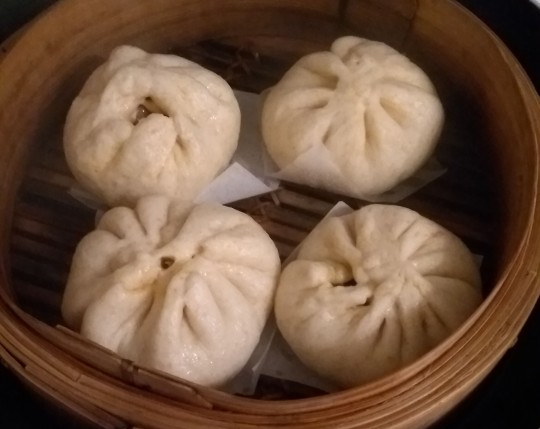
63 notes
·
View notes
Text
Ginko and Adashino: a study in Daoist perspectivism
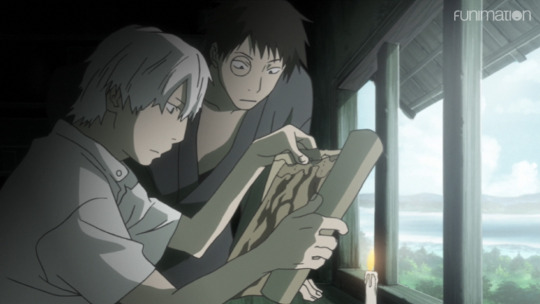
Huizi said, “I am not you, to be sure, so I don’t know what it is to be you. But by the same token, since you are certainly not a fish, my point about your inability to know the happiness of fish stands intact.”
Zhuangzi said, “Let’s go back to the starting point. You said, ‘Whence do you know the happiness of fish?’ Since your question was premised on your knowing that I know it, I must have known it from here, up above the Hao River.”
—Zhuangzi: Essential Writings, pg. 76
It would be criminally neglectful to talk extensively about Mushishi without discussing Ginko and Adashino’s friendship. Apart from Ginko himself, Adashino is the most frequently recurring character in the stories, and he and Ginko obviously share a connection that goes well beyond trading in mushi-related goods.
In contrast to Ginko’s other significant relationship, this one is not with someone who shares his degree of centeredness. Adashino’s focus is markedly external, his habits of life and outlook very much out of line with the teachings of Lao Tzu. Most obviously, he stockpiles a wealth of mushi-related treasures and is always on the lookout for more, while Ginko’s possessions are pretty much what he has in his backpack. The storing up of wealth and possessions, the Dao De Jing warns, can only bring grief: "Amass a store of gold and jade,” it says in verse #9, “and no one can protect it.” And indeed, Adashino’s storehouse is invaded with dire consequences no later than the tenth episode of the first season. His insatiable desire for interesting items persists nonetheless, leaving him open to a level of emotional excitability Ginko never displays even at his most distressed.
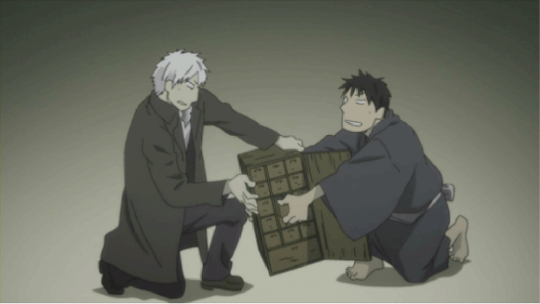
(Still, a man’s gotta protect his property...)
This is hardly the only particular in which Adashino and Ginko are decidedly unalike. S2 E8 "Wind Raiser” especially develops their differences. When Adashino takes credit for Ginko’s cure, Ginko completely ignores it; when Adashino speculates about what the young man Ginko advises will do, Ginko responds with a laconic, “Who knows?” These simple interchanges point toward their fundamental contrast: Ginko’s mindset is Daoist, and Adashino’s is (mostly) not. In accord with multiple verses of the Dao De Jing (#2, #10, #30...), Ginko doesn’t care a damn about who gets credit for his work; neither does he care to speculate about future events, preferring to “move with the present” (Dao De Jing #14). His focus is centered; Adashino's is outward.
Given these divergent values and the fact that Ginko reguarly cheats Adashino—of which Adashino is well aware—an observer might wonder why these two have anything to do with each other, much less why they’re such good friends.
But their bond makes perfect sense through a Daoist eye.
Daoist perspectivism
To the Daoist mind, contrasts and differences are part of how the world functions—and this includes differences from the Daoist mind. Zhuangzi not only teaches followers of the dao to not disdain non-Daoist values but hold “perfectly to the differing allotments of things” (Zhuangzi: Essential Writings, pgs. 70–71); his own closest friend Huizi is a man with whom he trades debates and criticisms throughout the Zhuangzi (pgs. 8, 38, 112...). This worldview doesn’t seek the exclusion of others—the Daoist idea of “oneness” means that opposing views and forces are inherently one, without being made to unite or agree.
Along with this embracing of contrasts comes a firm belief in perspectivism: that anything that can be affirmed from one perspective can be negated from another and vice versa, and that each person and creature’s nature and experiences determine what is right from her/his/its own perspective. "The embrace of the same viewpoint,” says the Zhuangzi, “comes simply from being in the same position” (pg. 101).
Just as Ginko understands that the natures of the mushi are rightful parts of the world whether they’re valued by humans or not, he also understands the validity of differing human viewpoints. Though he scolds Adashino for the trouble his collection causes, he doesn’t consider him lesser or unworthy of friendship because of it, or because of any other contrasts between them. Through all the disparity in their values, they share a connection—and in true Daoist fashion, their differences are likely what brought them together in the first place. Ginko gathers mushi-related items, and Adashino wants them. Ginko has no desire to collect things or haul them around, so he’s happy to sell... if not always honestly.
Which raises the next point about their relationship: Ginko’s shady business ethics.
Perspectivism applies here too. As Zhuangzi tells us, “whatever might be [from some perspective] strange, grotesque, uncanny, or deceptive” (pg. 13) can be affirmed as right from another view, and this certainly applies to Ginko and Adashino’s exchanges. To an outsider, they’re questionable as all get out—but it’s not an outsider’s view that matters. Both Ginko and Adashino freely choose to associate with each other on their current terms, because that choice makes sense to them. Adashino knows from the start that Ginko isn’t always on the level—from his first appearance in S1 E5 “The Traveling Swamp,” he’s questioning Ginko’s story about the green sake cup. And as Ginko points out, Adashino is under no obligation to buy from him—he chooses to, knowing the odds, and continues to choose to. And we can see in “Wind Raiser” that Adashino values even the more questionable items Ginko’s sold him; he’s held on to all of it, even the stuff he's probably guessed is junk.
Whether this arrangement makes sense or seems right to an outsider is irrelevant. Ginko and Adashino accept each other as they are, and the only ones who need to validate those choices are themselves.
So, for all their differences, do Ginko and Adashino have anything in common?
In fact, they do—and one significant value they share is the very perspectivism that shapes their relationship. We can see as much in “The Traveling Swamp,” when Adashino asks Ginko why he’s so determined to save Io from becoming a mushi.
“If the girl said she wanted desperately to live,” he says, “I’d understand. But she wanted to become part of the swamp, right? That might be her happiness... Sometimes that’s the way it is in this world, though it sounds cruel...”
Adashino’s statement points to the path along which he and Ginko connect: No less than Ginko, Adashino is open to another’s perspective, even one that he acknowledges sounds terrible. He fully understands that “rightness” for one person is not the same as “rightness” for another.
Ginko’s reply underscores that he shares this value. In S1 E1 “The Green Throne,” he made a human a mushi because it was her choice—despite his own assessment that becoming a mushi is a terrible fate for a human. He seeks to prevent the same from happening to Io, not because he doesn’t value her choice, but because his observation of her has convinced him that she doesn’t understand what she’s giving up—that she’s making her choice without full knowledge.
Interestingly, in this sense, Ginko and Adashino’s exchange is reminiscent of one between Zhuangzi and Huizi. Crossing over a river with his friend, Zhuangzi comments on the happiness of the fish below. Huizi protests and asks, "Whence do you know the happiness of fish?” In his frequently smartass fashion, Zhuangzi replies that he knows it from the position where they stand, above the river, watching the fish (pg. 76).
Not simply a play on words, this exchange is an illustration of Daoist perspectivism. Zhuangzi’s point is that, while we truly can’t know the perspectives of anyone other than ourselves, we must proceed from our own—including our observations of what may or may not make others happy. Not able to consult Io on the matter, Ginko has to proceed from his own observations, which lead him to believe she still cherishes human feelings.
Like Zhuangzi and Huizi, Ginko and Adashino both know that perspective is individual, and they respect the choices others make from their own. Adashino respects that Io may, after all, want to become a mushi, and Ginko respects that, in his assessment, she probably doesn’t—just as, in Renzu’s case, he respects that she does.
By this same principle, they respect each other’s natures, Ginko accepting that Adashino is an outward-focused, obsessive collector of things, and Adashino accepting that Ginko will occasionally chastise him or sell him a bad coat.
On these multiple levels, their relationship is one of Daoist perspectivism. And in the same way that Ginko can guess what Io’s happiness might be, we can “know” from observing them that Ginko and Adashino value their relationship just as it is—with no need for any foundational “rightness” other than their own choices.
With all that said, there is another kind of rightness to their friendship. In their contrasts to each other, Ginko and Adashino fit together. This is even signaled visually: Adashino's light-reflecting monocle signifies the yang within his yin, just as the tokoyami in Ginko's opposite eye is the yin within his yang. Like Ginko and Tanyuu, Ginko and Adashino form a Taiji, interlinked and corresponding through their similarities and their differences alike.
117 notes
·
View notes
Text
EREN JAEGER AND THE ENNEAGRAM TYPE 6
First of all, to my followers, please excuse me. This account isn’t for SNK but it’s the one I have and I wanted to write this.
Secondly, I hope this post finds the fandom lol. But if you’re expecting this to be another meta to judge Eren’s actions, don’t waste your time. The enneagram is a tool of understanding, not judgement, and I just wanted to share one thing I appreciate immensely about Eren’s characterization.
Well, why don’t we start with chapter 137? There, Zeke states that life’s purpose is to propagate and it’s core fear is to be extinguished. In other words, from the moment we are born, our organisms need to survive. As humans, we are on our own: suddenly, you gotta breathe on your own; the food is no longer provided. Everything is scary. A baby cries because everything is hard and far away and something in their biology tells them to keep fighting to survive.

Now, onto a more spiritual approach. In El Eneagrama de la Sociedad, Claudio Naranjo says that several cultures have their own ideas and tales regarding a disconnection from a primordial state of wholeness. Once born, we become individuals and are separated from the Universe, as if we’re no longer in sync, and something is lost in the process. How can we survive? Our defense mechanisms start with that question. We need love, we need resources and we need to stand our ground in this cruel, but beautiful world. This, on the enneagram, is called “childhood trauma”.
What I want to do in this post is to break down Eren’s character development through the lens of the enneagram, but for that, I need to give you an overview of the system. It is cruel and beautiful, just like the SNK world. It sees us with care and understanding but it also exposes the harsh truths we don’t want to see.
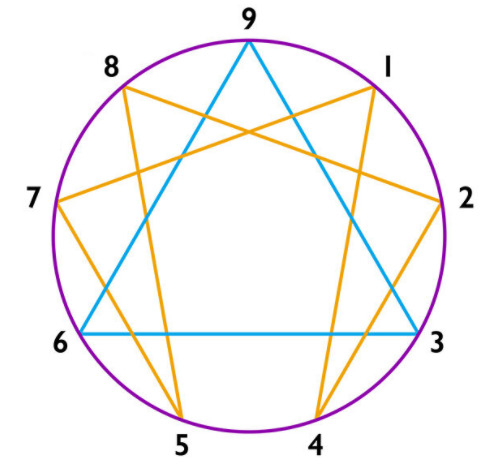
The enneagram, first and foremost, is an ancient symbol, a figure of nine points connected within a circle. There’s a lot of fascinating history to it, but I’m gonna focus on what matters to this post. The enneagram is a personality system that encompasses nine essences of the Universe, and once our childhood trauma sinks in, we attach to one type which defines our worldview. Here’s how each enneatype manifests itself:
Type 1, the reformer: this person seeks to not make mistakes. They are principled and meticulous in everything they do but highly critical of themselves and others.
Type 2, the helper: this person seeks to be needed. They are proud of their independence and helpfulness but believe they can only receive love if they give first.
Type 3, the achiever: this person seeks to be worthy. They are motivated and ambitious but shape themselves around what is expected of them.
Type 4, the individualist: this person seeks to build their identity. They are sensitive and creative but reject the ordinary and focus on what is harder to reach.
Type 5, the investigator: this person seeks to be a specialist. They are perceptive and curious but withhold themselves and their resources and worry they’re never prepared.
Type 6, the loyalist: we’ll talk about it in a moment.
Type 7, the enthusiast: this person seeks to avoid pain. They are joyful and spontaneous but afraid of facing hardships and being swallowed by negativity and sadness.
Type 8, the leader: this person seeks to be strong. They are fierce and protective but don’t allow themselves any vulnerability and need to be on top.
Type 9, the peacemaker: this person seeks to be in peace. They’re kind and their inner stability is unshakable, but have a hard time asserting themselves.
So what does it mean to be a type 6?
Some of you might not believe if I told you that Eren is moved by fear. But that’s what it is. The type 6 represents fear itself. It’s our search for safety and support. The person who is a type 6 has disconnected from their inner guide and they don’t believe they have the same capability to make decisions as everyone else. That is more of an unconscious state, which manifests through an overly alert stance. Sixes are always on the lookout for threats and danger, their minds work predicting things that can go wrong, so they can be prepared. In other words, the type 6 fears how imprevisible life is, because they truly don’t find in themselves the compass to the answers they need “in this very moment”. They have to be one step ahead and they have to find outside structures for support, people in whom to trust and who’ll give them the guidelines and sense of balance. Fellowship and loyalty are essential to the type 6 as they look for reassurance in their concerns.
In Personality Types: Using the Enneagram for Self-Discovery (1996), Don Richard Riso has described nine levels of development for the enneatypes. They are the path from our healthy, healed state where we’re closer to wholeness again (Level 1) down to our most broken state where we’ve abandoned ourselves (Level 9).
When we start Attack on Titan, Eren is on Level 6. Here’s what Riso says:
“In its innocent forms, counterphobia is well employed by people to master their fears — for example, children who are afraid of the dark might purposefully go to a dark room to overcome their fear.”
Eren, too, wanted to overcome his fear since he was a kid. He wanted to go outside and face those faceless titans. He wanted people around him to be prepared, but since the Garrison was incompetent and lazy, he needed to be prepared. Grisha seems to be Eren’s first authority figure. From what we know, Grisha allowed Eren to have his own thoughts and didn’t impose anything on him, which is a kind of reassurance. Thus, with his father, Eren felt more understood.
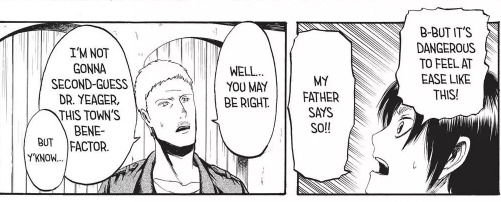
Carla, on the other hand, wished for Eren’s immediate safety and cared about him living a quiet life. But that also means she couldn’t understand his concerns, and the type 6 interprets that demeanor as vulnerability — his mother is more exposed to the threat. If the type 6 is a room where nobody is vigilant, the only option they see is to step up and become hypervigilant.
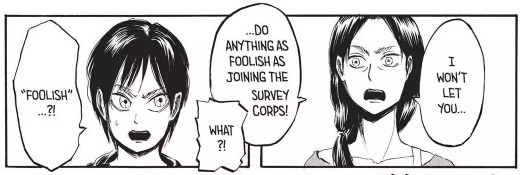
This relation to an authority is very specific for the type 6 as they search for people and systems in whom to rely on. Since the Garrison aren’t the most reliable soldiers around, Eren turns to the Survey Corps. That section of the military consists of the rebels, those who want to explore the unknown, understand the titans and figure out the best way to fight the enemy. The SC wants to be free, so they become Eren’s next “authority figure”.
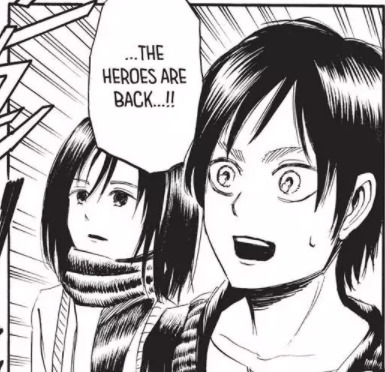
Riso also says that the type 6 in Level 6 has a more aggressive stance and wants to prove to others that he isn’t indecisive and can’t be pushed around.
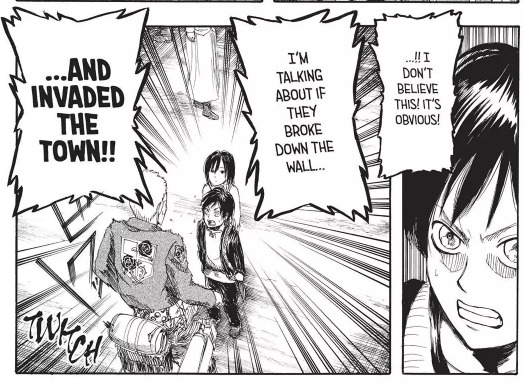
“They blame and berate whatever threatens them. They become rebellious… and are desperate to latch onto a position or stance that will make them feel stronger and dispel their feelings of inferiority.”
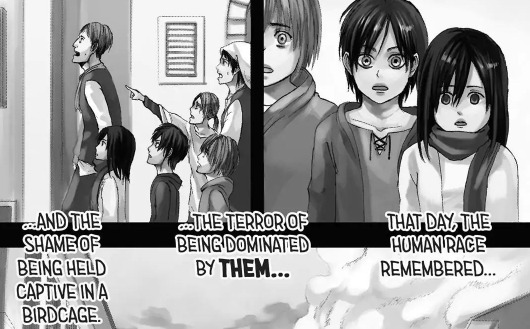
The type 6 feels inferior because they feel lost inside. Eren, too, knows that the threat lurking behind those walls is much bigger than him and a single human doesn’t stand a chance. And he berates people around him for not seeing what he sees, or for disrespecting his “heroes”.
Eren will be back to Level 6 later, embodying other aspects of it, but let’s talk about the moment he joins the army.
At this point, Eren reaches the stable position he has been eager for. He is part of a group and working towards his goals, he feels more confident because he’s preparing for the next attack. He has climbed to Level 4:
“The security which groups and institutions provide far exceeds the strength of any individual members...”
As we know, Eren sees his mission to eradicate all titans also as a social responsibility. The type 6 can easily fall into “us versus them” mentality where they are putting effort into something and will trust only the people who understand the importance of it. Eren’s bickering with Jean, as well as his admiration for Reiner starts from there.
“And even within their own group, average Sixes make it their business to find out who is pulling the weight and who is not... If others are not loyal or committed, it not only makes them angry, it threatens them.”
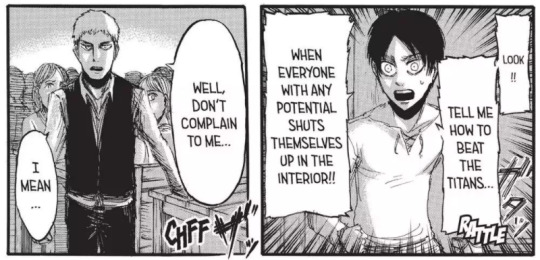
Eren talks over and over about how he’s going to join the suicide squad, to the point people start making fun of him. But he is testing everyone’s commitment to the cause of “fighting titans” and he finds people like Jean, who only really want their safe life, as well as Reiner, who is dedicated and understands him immediately. Reiner becomes his new “authority figure”: whenever Eren’s failing, Reiner is there to understand him, to offer help and to remind him of why he’s there.

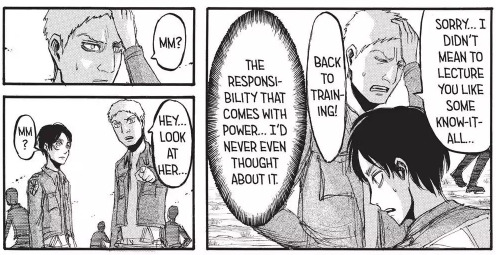
“The loyalty of average Sixes for the people with whom they have identified is almost without bounds. They find it extremely difficult to break their emotional bonds, even should they desire to do so… Their love may, in time, turn to hatred but never to indifference.”
That one speaks for itself. It’s exactly how Eren felt upon RBA’s betrayal. He’s in total denial about Annie, while for Reiner/Berthold all he has left is rage.
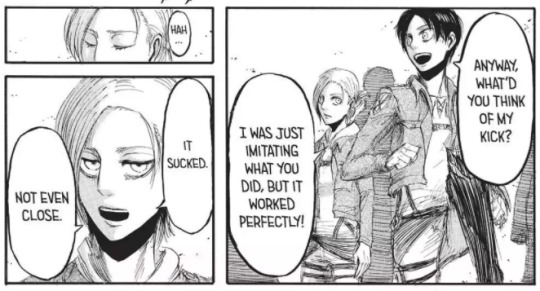
Choosing who to trust is part of the type 6 identity. All of their beliefs, all their inner world is shaken if they are betrayed, because the network they build is how they find a safe space for themselves in the world and how they orient themselves. Annie was Eren’s parameter of fighter, Reiner was Eren’s parameter of leadership. The first backstab is too hard for him to process, we see it all unfold. He can’t admit she’s a traitor, and he doesn’t even have the will to transform and fight her.

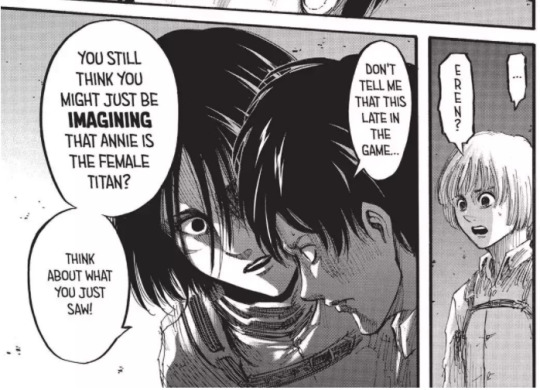
The second one, however, is embraced somewhat faster and he’s even able to contain himself and play along. But it doesn’t change how deeply it affected him and how vengeful he gets. Years later, that hatred would dissipate, but never to indifference — Eren still feels a need for some closure between them.

I got ahead of myself on the timeline, so I’m going to rewind to the moment Eren joins the Survey Corps, which is his childhood dream. Erwin is his main authority figure now and you see that, even though Erwin locked him up, he trusts the guy. As Don Riso explains, the type 6 on Level 4 plays by the rules of his group because he strongly believes in those rules and they bring comfort to their minds. In reality, the SC doesn’t really know what they’re doing. Erwin himself doesn’t know how he’s gonna cross the walls and find out the truth. But Eren is devoted to them. Their cause is his cause and he knows how hard it is but what matters is they’re trying. Besides, they embrace him. They want to reach the basement and want to defend him on the court and want to investigate/use his titan power. Thus, for Eren, the SC is the most solid and welcoming place to be. He’ll do whatever they want from him.
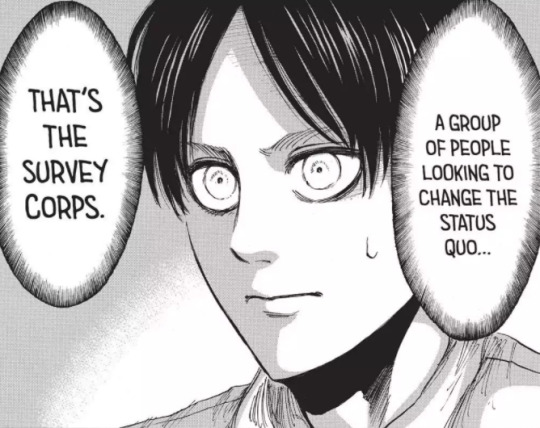
However, Eren was about to find out that things were far from glorious out there. Although the Survey Corps work under strict “plans” that soldiers are supposed to follow blindly, Eren can’t just watch people being sacrificed to protect him. Especially when he has enough power to act in a more significant way than those individual humans. But how much control does he have over his own power? Eren can’t answer that, and he feels immensely conflicted as soldiers continue to drop dead.
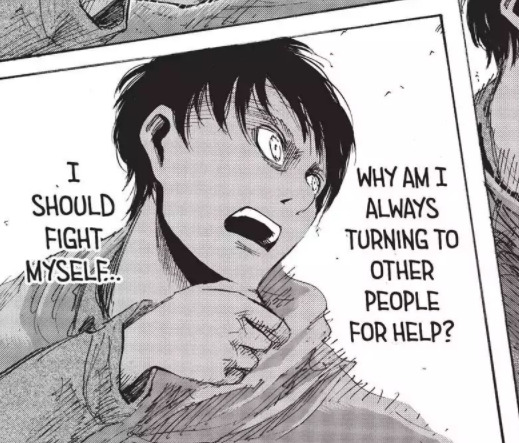
In that moment, Levi could’ve forced him to follow his orders, and perhaps that would’ve eased his mind when he chose not to transform. But the captain is a different kind of leader than Erwin, and he challenges Eren instead:
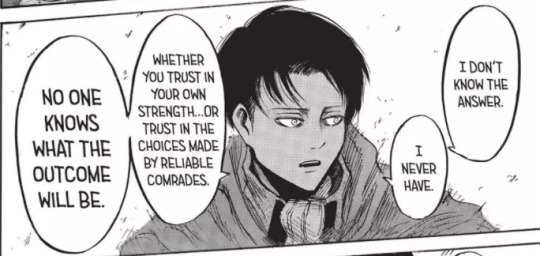
And I really appreciate how fitting that is to the type 6 conflit. It’s very difficult for them to accept it, sometimes there simply isn’t a clear path, sometimes it is okay to trust yourself and act on your own. But this is what Eren’s thinking:
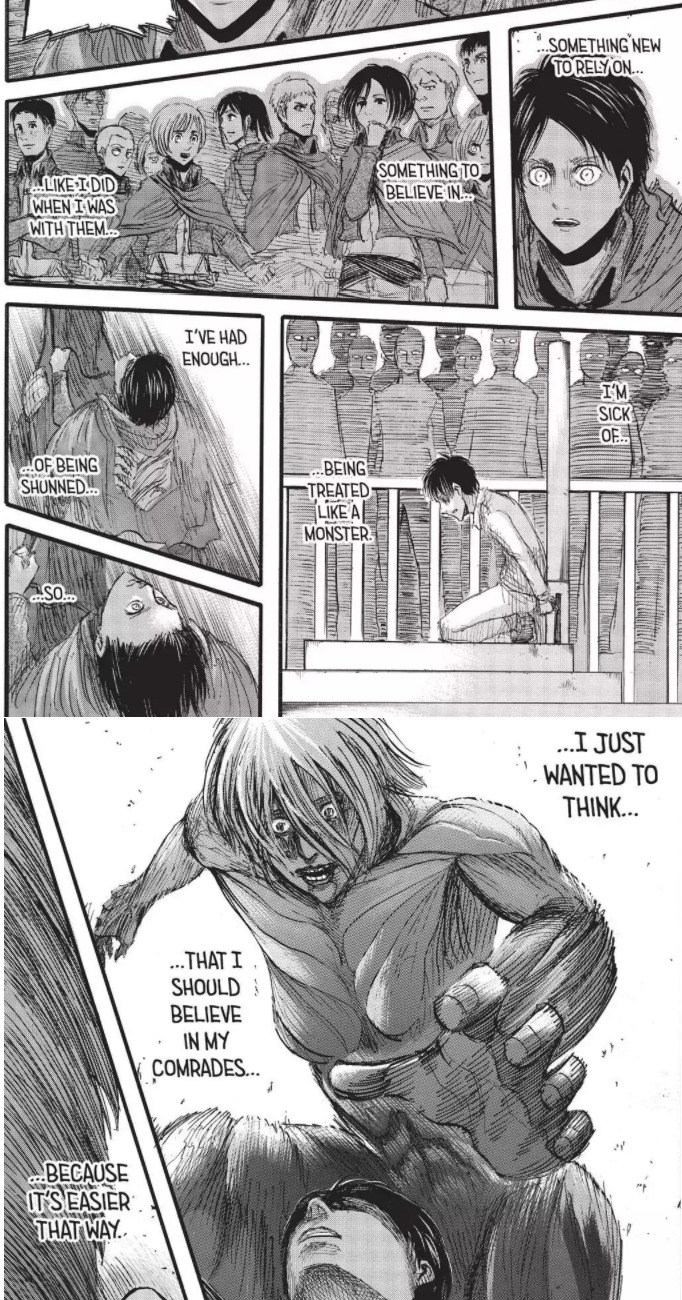
That didn’t turn out very well, did it? At the end of the expedition, Eren is forced to admit that the SC don’t have all the answers and that all his power and training can’t always keep everyone safe. He’s once again reminded of that after activating the Coordinate — not even the power to control titans can avoid sacrifices.
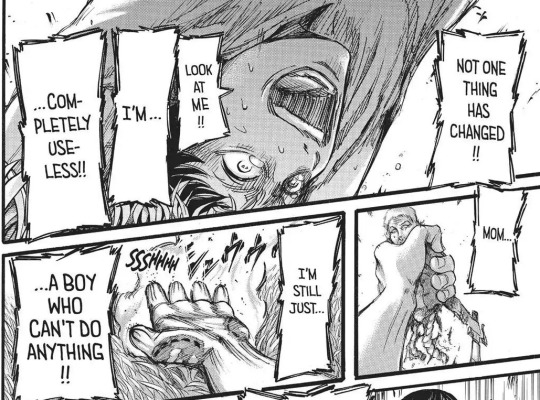
Ideally, the type 6 can only reach the safety they seek once they allow themselves to move in the chaos with the courage to face it step by step, instead of predicting it. This may sound easy for others but not for them, especially if they are inserted in a reality where the cost of a mistake is lives.
So we get to the Uprising arc. It starts with the Survey Corps planning the retake of Wall Maria while they put Eren through hardening experiments. Time is not on their side and Eren’s determined to go beyond his limits during the tests.
“They consequently try to further strengthen their ‘social security’ systems by working harder to be accepted and approved by their allies and authorities… Others wonder if they resent the workloads and pressures they seem to be under, yet Sixes seem eager to fulfill their obligations and duties...”
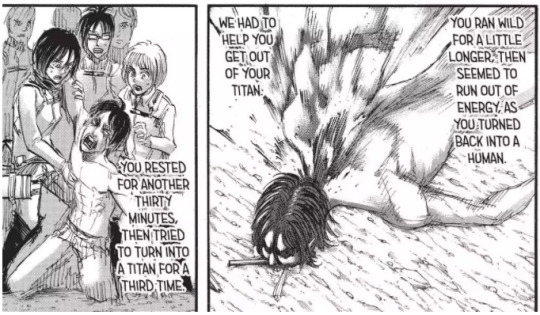
Eren’s entire world would fall apart again once he’s kidnapped by Rod Reiss and discovers the truth of his father’s sin. Like I said earlier, Grisha was one of Eren’s authority figures, and even though he was absent, the basement key and the promised truth kept son and father connected. Wherever Grisha was, Eren could still count on the answers he’d left behind.
That is, until he is hit by a trainwreck of a revelation that his father killed an entire family and sacrificed himself to pass on the titans to him. Eren’s left completely lost, he no longer knows what to think of himself, of the world, of his father.
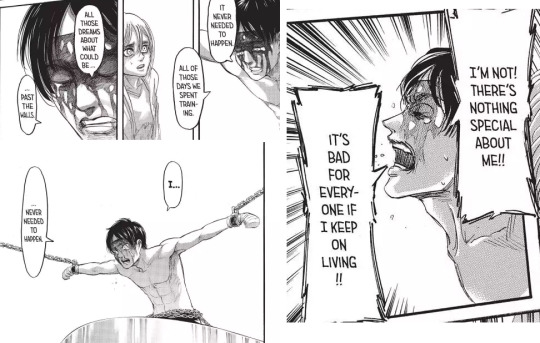
He falls from Level 4 to Level 7:
“Sixes become trapped in an unhealthy pattern of self-disparagement and massive insecurity which reinforces feelings of inferiority and worthlessness, a marked deterioration from the indecision and evasiveness we saw [before].”
This shift to a much more confused and self-loathing state doesn’t last long because Eren has his friend’s support for now. Historia chooses to see his worth and let him live. Levi once again challenges him to make his own decision, and Eren manages to save the day.

As Eren becomes aware of those destructive feelings, he tries to get rid of them by “fighting” himself, in an attempt to put himself back up.

He realizes he isn’t alone and he doesn’t have to do everything on his own, people around him are also strong enough to stand up for themselves. That helps him return to a more average stage and it could have been the beginning of his growth...
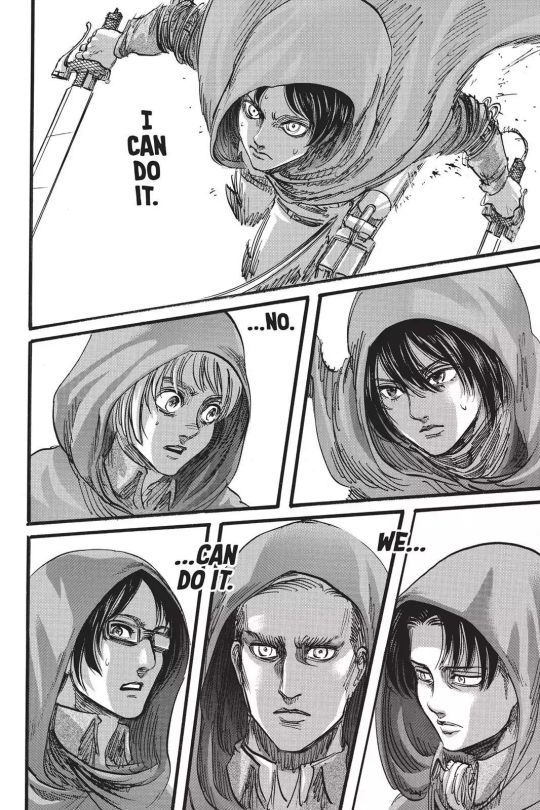
Well, if only life wouldn’t have a surprise waiting for him at every corner.
I hope you’re being able to follow and understand that we all have ups and downs in life. The levels of development represent exactly that, so it is common to find yourself in the same stage in different periods of your life. Nevertheless, after Eren learns the truth about the world and sees his future memories, it all goes downhill for him, no turning back anymore.

Here is what Riso comments on the ambivalence of the type 6 on Level 5:
“Sixes begin to follow the narrow path between the expectations of their allies and authorities and their need to resist having any further demands placed on them.”
Eren is overwhelmed by the view of the outside world. He has experienced his father’s memories first hand and it’s nothing like what he expected. No one around him has the same perspective. A lot of self-awareness and self-doubt emerge from the future memories he saw through Historia. Riso explains that on Level 5 the person starts to become more worried about how their allies feel about them.
“They become skeptical of new views and ideas, feeling that they have already put a lot of effort into understanding the perspectives and approaches they already know.”

Eren went from “I HATE TITANS ALL TITANS ARE MY ENEMIES DESTROY ‘EM ALL” to “titans are my people and they haven’t chosen this horrible outcome”. And that’s A LOT to process when you wrapped your life around that initial idea. But things are changing even faster, and his friends are talking about how the enemy could be reached out too. This thought needs to coexist in Eren with the clear image he has of the enemy, one that only he has accessed. Add to that how Eren was kept away from the Marleyan prisoners as Paradis also feared some kind of betrayal. As long as there’s people out there against them, he can’t so easily rest.
Who knows at what point Eren returns to Level 6. The time skip is covered very loosely. But probably when he is feeling so lost that he actually comes to Historia to vent.
“As in other types, to be functioning in this Level or lower usually indicates that there were extremely dysfunctional elements in the child’s environment.”
Self-explanatory. It’s even hard to talk about Level 6 because it is a point where Sixes start to overthink threats that aren’t that big, but in Eren’s case, the threat is 100% REAL and there’s a world isolating them and wishing for his people to die and throwing gigantic creatures at them. No big deal at all.

Eren turns to the people who actually understand the urgency he feels. Floch is eager to follow him, while Zeke and Yelena have an actual plan. Eren says he’s acting out of his own decisions, and he sure is, but he has also left it in Zeke’s hands to set the course. At this point, it no longer is a positive thing for the type 6 to have reassurance instead of a grounding support, it’ll only leave them trapped in the current mentality.
What would be more appropriate would be a balance between rejection…

…and full acceptance.

(By the way, I can’t even know where Historia stands, since she let him do his thing, but I’m still using her here because of how immediate her reaction was, which could lead Eren to think he can’t risk telling anyone else. Unhealthy Sixes are just that paranoid.)
Zeke could have been Eren’s new “authority figure“ if their goals were the same. But more and more the only thing Eren is starting to rely on are the future memories.
Riso talks about how a violent environment would lead to violent actions and “they end up using the same aggressive tactics on others”. And I can draw a parallel with how Eren has been facing titans for so long and watched them take people from him, that he just feels aggression arise whenever he thinks of all the injustice he has witnessed. Same would happen later on, when he sees Ymir’s memories and finally decides to unleash this pain on the world.

“It’s hard for Sixes to work for something. Instead, their energies are galvanized by being against people and things.”
Despite being highly conflicted and problematic, Eren so far has waited. It’s too hard at this point to fully engage with those dreams, but he has watched things unfold and allowed the Survey Corps to do their stuff and try to contact the outside world. On Level 7, the type 6 is just going through the day with little hope. When the SC reaches Marley and Eren meets the boy of his memories, he can no longer escape from facing himself.
“Tearful and obsequious, they are disgusted with themselves for not having been tough enough to stand on their own two feet, to defend themselves, to be independent.”
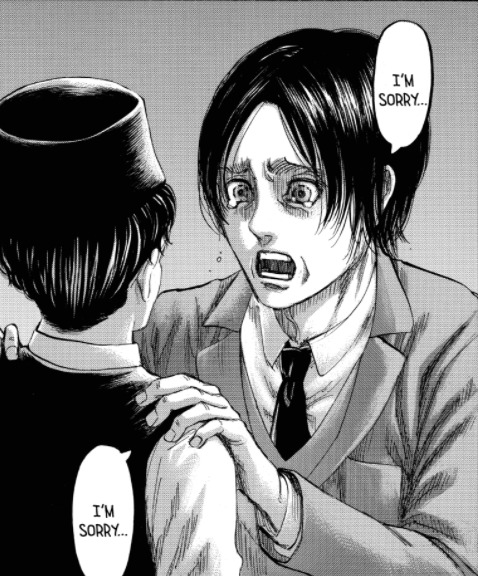
Not only Eren, but Paradis as a whole, have been unable to be independent in a much bigger world, or this is how he sees it after Kyiomi monopolizes the resources and the pro-Eldians group rejects the island. Finally, Eren recognizes in himself the person who would be capable of trampling the kid he currently wants to save, and that leaves him disgusted.
“They do not necessarily deceive others maliciously, but to escape punishment or abandonment. They believe they may be able to repair the damage they have caused...”
What Riso is saying here is that the type 6 feel the need to hide (themselves) so their loved ones won’t abandon them. And again, in Eren’s case, he has a damn good reason to think his loved ones might not be super happy if he said he was going to destroy the whole world. Let’s not forget they are the people who counted on him to save the world this whole time, and he is the person several people have been sacrificed for.
All this pressure has brought him this low, but Eren reaches rock bottom when he allows himself to admit he wished for it all to be destroyed. Now, he can no longer face his family (as he would tell Falco) and he has little faith in himself.
Again, Eren’s paranoias aren’t so far from reality because there is, indeed, a world against them, and that keeps feeding into his anxiety. Paradis’s progress is little and the future is uncertain. When the type 6 reaches Level 9, they can no longer get out of this spiral. They know it’s only a matter of time until the threat comes to them. So they call the threat upon themselves.


Eren allowed himself to go as far as understanding his enemies and accepting that they’re the same, but with the declaration of war, he can’t wait anymore.
I already told you the reason: the type 6 needs to be able to predict. That’s the very core of their beings, their minds seek to control events. Striking first is their final attempt to make sure they won’t be taken by surprise. Ultimately, they are lost and desperate to find support again. Here’s what Riso says about the type 6 on Level 9:
“They may drop out, abasing themselves as vagrants and living in skid row conditions, thus allowing their health and minds to deteriorate to the point of no return.”
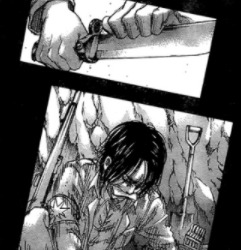
It almost feels like Isayama has read this book, I swear to God. Yeah, that’s word by word what Eren does. He goes to enemy territory, injures himself and throws himself in war. Despite resisting for so long to a new perspective of his enemies, Eren allows himself to see them with his own eyes. All because he’s desperate to understand his enemy, desperate to understand himself (and what would lead to his decision) and desperate to run away from his friends. He is ashamed of choosing those future memories as his new authority figure, get it? They are the most certain thing in his life now. As much as he waited and as much as the SC tried, they don’t have any guaranteed future and it’s just too hard for the type 6, especially unhealthy Sixes, to wait. It’s impossible.
Remember I said that Sixes want to feel understood? Well, I think Eren feels understood, to some degree, when he’s among those broken soldiers. They are relatable, more than anyone else.
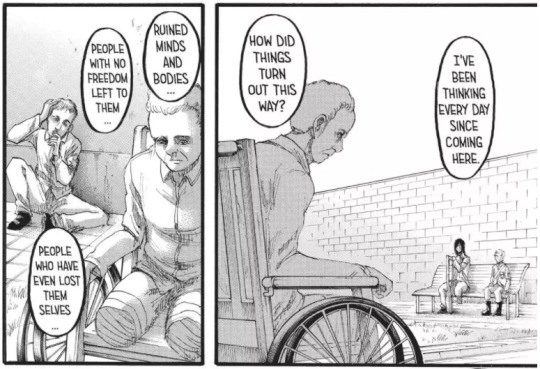
“Neurotic Sixes bring disaster of some sort upon themselves not to end their relationship with authority figures, but to reestablish a protective one. [...] It is also important to notice that neurotic Sixes are masochist not because they take pleasure in suffering as such, but because they hope their suffering will bring someone to their side who’ll save them… as if to say, ‘Punish me, because I’ve been bad. Then you can love me again.’”
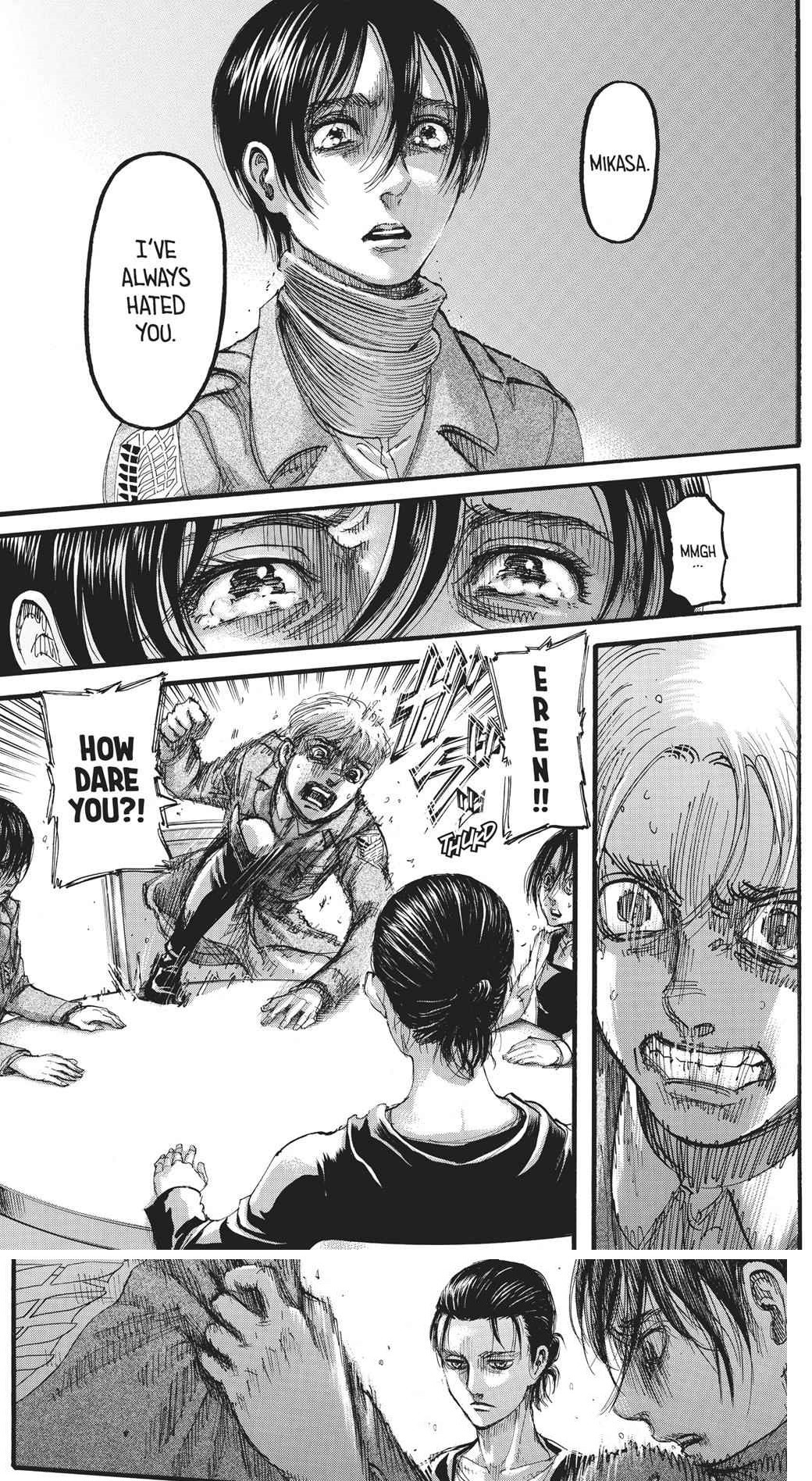
In the mind of the unhealthy type 6, if he can’t find the answers, he can’t be there for his allies. If he fails his allies, he doesn’t deserve their support. But even when he feels he doesn’t deserve it and feels they won’t forgive him, he desperately needs it — the type 6 doesn’t know how to live without support. He is completely aware of his cowardice, he may unleash his despair in innocent people, he seeks punishment for his behavior and hopes for someone to end his pain.
“Unhealthy Sixes are self-defeating persons who are their worst enemies. If they persist in their masochist behavior, neurotic Sixes will drive away everyone on whom they depend. They will be abandoned and alone, the very things they most fear.”
Eren pushed everyone away, but deep down he waited for them to come to his rescue. He knew he was a lost cause, but still couldn’t let go of what he saw as a compromise, a duty to them. His completely cruel and extreme actions are, in enneagram terms, his way to not leave his allies adrift. But aren’t all his actions for his own freedom? I don’t think so, not entirely. There’s a reason the type 6 has been named “the loyalist” — they always, always see themselves as part of a group. And in the end, he saw himself in Ymir, someone who was trapped and waiting to be rescued, understood. Don Riso says the worst part of coming this low is how much Sixes hurt others while they hurt themselves, both because they want to harm everyone who doesn’t understand and to show people the worst in themselves; they want to punish and be punished at same the time.

That is what I wanted to break down — Eren’s inner process. Yes, the type 6 is an ambivalent, contradicting personality type, precisely because that’s how they feel inside. Other enneagram types don’t escape from their own personal conflicts, that’s also important to point out. The enneagram does not define integrity, people capable of causing great harm exist in all types and no one from type 6 is fated to destroying the world — just in case that isn’t obvious.
This post is heavy, I know. One of the things I love about SNK are the emotions it evokes and how human characters are. I’m so thankful to have followed Eren’s fascinating journey. He has never hit me as a one-dimensional character as some people claim. To me, Eren is not a chad, he’s not a monster, either. He’s just human.
I’m thankful for this fandom as well. We’re a total mess but the monthly wait would’ve killed me without the crazy theories and the heated discussions.
#snk 137#snk 138#snk 139#Eren Jaeger analysis#attack on titan manga and anime#enneagram#LONG post#eren jaeger#snk analysis
58 notes
·
View notes
Text
Sixth Sense - Chapter 3
Paring: Loki x Female!Reader
Word Count: 2,255
Warnings: Accidental violence/injury. Mental health (Loki).
Posted: 03/01/2021
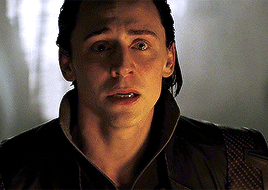
Odin wasn’t particularly fond of you staying in Asgard. But you had insisted to keep a close eye on Loki. You had told him it was to make sure the darkness didn’t get stronger. But there was something else, after reading him so deeply, so intimately. Something changed. You no longer feared him, but you felt as if you wanted to save him. You needed to save him. From his thoughts, from the entity that harmed him before his forced attack on Earth. You knew he was tortured before his attack, you saw the footage, keeping tabs on what was happening during the battle. But now, you just felt worse. He thought he was the very monster his father despised. He had been lied to his whole life, even by his mother- whom he trusted the most.
Getting lost in your thoughts you didn’t hear Thor entering the room. He was worried for you, he had seen you read auras before but you had never acted like this afterwards. He hoped he hadn’t caused you harm letting you come here. He stared at your figure for a moment. You were facing away from him but your facial features seemed stressed and concerned. Your eyes were narrowed, facing the ground. Your right hand rested on your face while your left draped over your knees. You were unmoving. Completely still until you felt something and your head jerked up and your eyes met Thors. Your eyes narrowed, you had never sensed someone’s presence before. Was your being here helping you tap into your powers. The endless possibilities of being in a magic realm, would that make you more powerful, dangerous?
“Thor- I didn’t hear you come in.”
“You seemed deep in thought” You couldn’t tell him about Loki if he knew his feelings- from what you understood- it would break him.
“Yes, I think my pow- my abilities, I think they’re evolving” It wasn’t exactly a lie. But not the whole truth of what was on your mind.
“Evolving? How so?”
“Before I could only read auras. But now, I can sense them. Not straight away obviously. But what if- what if being here, is making me more powerful? Compared to earth, this realm is one of magic.” You stated, wanting his opinion on the matter.
“It’s possible. So you could sense my presence without knowing I was there?”
“Yes, and-”
“And?”
“And- and I feel a connection- to Loki I mean. I had never read that deep into someone. I felt like his therapist, but it’s more than that. A man like that, he wouldn’t willingly let me read his emotions. But I still felt them. I cant tell emotions from peoples auras, Thor. But with Loki. I did. Is it my being here? “
“We need to tell my father about this” Thor turned to leave but you grabbed his arm holding him back from walking further.
“Don’t. Don’t tell him yet. He doesn’t trust me, not yet. Wait until I gain his trust, then you can tell him” Thor turned to face you again, as your arms fell to your side.
“What if being here causes you harm, Y/N?”
“And what if it doesn’t? If Odin finds out- He will banish me from Asgard for eternity. Thor, trust me on this. There are things you don’t know, about Loki, about your father. Thor, please. Give me a month.”
“One month. No more, no less.”
“Yes! Thank you, Thor” You pulled him into a hug in which he accepted. After pulling away you knew you had to ask Loki about it. You began walking and Thor automatically followed- being you protector here. You memorised the way to the prisons, once Thor had realised your destination he held a hand out in front of you stopping you.
“Are you sure this is wise?” He looked down at your smaller form, concern filling his eyes.
“His speciality is magic, who else could I ask about this?” He frowned, knowing he was the only one that you could ask for answers. A sigh escaped his lips, lowering his hand, letting you continue. Once in the prison you had asked the guards to leave, they denied until Thor had ordered them to. Loki looked up confused with your visit. Sitting up from his laying position on the bed he was given.
“To what do I owe the pleasure?” His voice was dull. He knew there was no point in being strong around you, you could read him as easily as the books he reads.
“I have a question, related to magic.” His eyebrows perked in curiosity.
“Magic? Well, you’ve come to the right place.”
“My abilities are evolving. I assume it’s my being here. I can now, not only read auras but sense them. And I think they’re still growing.”
“Well, this is the realm of magic, my dear. There are endless possibilities for the reasoning of your growth. But I would say your assumption is correct.”
“Would I be in any danger being here? Will my body be able to handle the change in my abilities.”
“That all depends on you. If you’re strong enough to sustain it, you will be fine. But if not, there is a certain danger to it.”
“Thor let me into the cell. I need to test something”
“Are you sure? He just said it’s dangerous”
“Only if I can’t handle it. I’ll stop before any permanent damage is done. Don’t worry so much. I’m stronger than I look.” Thor was hesitant but complied. Loki didn’t make a move to hurt you even with Thor on the outside. You sat in from of Loki with a chair, much like last time.
“Look, I’ve never done this before so if it hurts I’m sorry.”
“What are you going to do to me?”
“Just relax” You placed your fingers on his temples gently, closing your eyes. You tried to concentrate on him, his pain. You wanted to understand him more. Then you saw the tesseract and a purple titan with a deceiving smile. A tear rolled down your cheek as you searched for the cause of his pain. You saw auras within his memories. Those of his adopted family in happy memories turned sour. He believed his life was a lie. He didn’t want to love anymore, in fear he would get hurt again. He-.
You were brought back to reality, your hands were no longer on Loki’s temple but within his hands. You had caused him pain. Making him relive those memories. Thor had entered the room at this point. You still didn’t notice the tear on your cheek until Loki wiped it away.
“How- how did I see that?”
“That I’m not entirely sure of. It seems you hold abilities even more than you already possess”
“But I read auras, not emotions and memories.”
“I’m afraid you might be wrong there.”
“You are not doing that again” Thor demanded, voice deep.
“Why not? This would be the best way to heal your brother”
“Y/N you screamed as you cried. I do not think its best for you to continue. I shall call Stark and-”
“No! I- I need to continue”
“Y/N it will harm you”
“No, you don’t understand. I need to continue Thor. Not only am I helping Loki, but I’m expanding my knowledge of my powers. Who knows what other abilities I possess.” Excitement and urgency filled your tone, making Thor rethink his decisions. Was it wise to keep you here, letting you continue? Without his father’s knowledge? What was he thinking? He trusted you. He had to let you do this. You know the dangers, yet still want to continue, who was he to deny that.
“I shall not stop you if this is the path you choose. You cannot stop. You must continue forward until the very end” He lectured you as if you were entering battle.
“I know. But I trust my gut, Thor. This is something I have to do. There are no choices in this, no decisions that will change my mind. Its something I know that must be done” Thor nodded saying nothing more. You turned your attention back to Loki. He stayed silent, knowing exactly what you saw.
“Thor, leave us. Can you mute the cell? The barrier would have that ability I assume?” Thor huffed but nodded, answering your question as he left. He gave a thumbs up showing that he could no longer hear you, but you had to check. You knew what he was like. You turned and yelled.
“Thor is a giant asshole with an ego bigger than Tony!” Thor didn’t budge, but Loki stifled a laugh. You turned towards him and let out a giggle yourself.
“I had to check. He’s not very fond of us being alone together. Even if he can see us, he thinks you’ll manipulate me if he cant hear us.”
“And what makes you think I won’t.” He tried to shield himself again, going back to his trickster persona.
“I’ve seen your pain, your memories, Loki. You don’t have to hide anymore. Not with me. You hold no hatred for attacking my planet. I know you had no choice. That thing. The purple titan. He forced you to do it. I know you're not the monster they think you are.” You held his hand in a comforting way. Letting him know that he could trust you. His eyes searched yours for deceit. Anything that would show him that you would betray him like the rest of them. But he found nothing. He began to break.
“I didn’t want to do it. I thought I killed Thor. And I hated it. But I had to prove to him- to Thanos-”
“His name is Thanos?” His eyes shut briefly as he sighed.
“Yes. I had to prove my loyalty. He tortured me after he saved me. He needed me. The god presumed dead by his brother. No one would see me coming.” You nodded your head, listening to every word diligently. He poured his heart out, for the first time in his life. He was vulnerable. He told a Midgardian everything that was eating at his conscious. And during that whole ordeal, you didn’t say a word. You let him vent. It seemed as though you were a therapist of some kind to him. Once he stopped, he noticed your tears. You felt empathy, for him. No one had cared enough to ever listen to his words. But now, here you were, sat in front of him, crying. He didn’t know what to feel.
Thor was stood outside Loki’s cell the whole time. Not being able to hear a word. He saw that Loki was the only one speaking. He feared that Loki was trying to manipulate you, he went to interrupt before he saw your hand signalling him to calm down. You sensed his tension. You had to let him know you were okay. Loki wouldn’t open up if Thor interrupted. But when Loki stopped speaking and Thor saw your lips move, with tears in your eyes. He couldn’t take it anymore. He burst into the cell. You stood in defence at the sudden sound.
“What did you say to her Loki?!” Thor had misread the situation. You had to calm him down. You walked towards him, putting your hands up to try and calm him.
“Thor, I’m fine. He didn’t do anything” Thor barged passed you and went to punch Loki but you jumped in front of him taking the hit. You grunted as the force threw you to the wall. Thor pulled back, seeing your figure leaning against the wall. He resented himself for striking you, even if it was by accident. You looked up, holding your waist. The force you hit the wall at caused some more physical damage than the broken and bloody nose. Your other hand made it up to your nose to examine the damage. With the force of a god, you were lucky you were still conscious. Loki had come to your aid, helping you up while Thor was frozen, unable to believe his actions.
“Are you alright?” Loki’s voice showed concern. You kept hold of Loki’s shoulders to keep your balance. The thumping in your head didn’t stop you from yelling.
“You idiot! Thor, when will you learn that your actions have consequences! Stop and listen before attacking someone. It will get you out of so many unnecessary situations!” You removed your hand from your waist, placing it on your head. The shouting had made it worse.
“Damn it, Thor. I told you to trust me.”
“You were crying what was I suppose-”
“I was crying because he told me everything! I got so sad thinking ‘How could he live like that? How did he last so long?’ I cried because I have empathy, Thor.”
“I’m so sorry Y/N I-”
“Save it. I’m not mad. Just hurt.” You groaned in pain as you shifted your weight.
“Let me take you to a healer” Thor’s hands reached out to help you.
“Fine.” You removed your arm from Loki’s shoulders as Thor placed a hand under your knees, and the other on the small of your back before he lifted you. You looked at Loki and saw how hurt he was of your pain. He wanted to take you himself and check on you whenever he could. But as a prisoner, he wasn’t granted that freedom.
Taglist: @lovermrjokerr @lord-byron @lucywrites02 @violetica
#loki#loki lafeyson#loki odinson#mcu#mcu loki#tom hiddleston#loki imagine#loki (marvel)#loki x reader#loki series#loki fic series#mcu fanfiction#mcu fic#marvel mcu#cazza writes
74 notes
·
View notes
Note
I apologize if you’ve already written about this before, but one thing I’ve been wondering about your Indelicate version of Eddie is in regard to his occasional tendency toward more (for lack of a better/less serious-sounding term) “aggresive” actions (e.g., throwing the lotion bottle, throwing the water, etc.) directed toward Richie. I know it was hinted at that the urges to aggress may sometimes be/have been the result of repressed or misconstrued attraction, but I’m wondering if some of it is also a result of Eddie’s injury and the related feelings of a lack of control over his own body? Like hypothetically, if Eddie were never injured or if we fast-forward to him completely healed, do you think that moments like that would still happen? Or am I just really reading too much into the fic and making up this aspect of it? Hope that makes sense - I just love your characterization of Eddie and I want to make sure I’m understanding as much as I can!
I actually haven’t written about this before, and I think that it’s a good thing that I take the time to meditate on it now, because I don’t want the idea that throwing things at your romantic partner is, like, a good thing.
So a lot of my thoughts on Eddie’s aggression derive from two specific aspects of his portrayal. The first (chronologically in Eddie’s timeline) is the portrayal of Eddie as high-strung, snappy, and verbally combative in IT Chapter One (2017). Within the last year and a half I saw a post that pointed out that some of Eddie’s aggression--especially in interacting with Richie--probably derives from the high-stress situations of a) being hunted by an alien clown demon and b) being abused at home. I had a college professor discussing a history and trauma class point out that, “Traumatized people don’t always behave well.” There are the usual caveats that explanations are not excuses; however, I think that the constant knowledge that he has to return to Sonia’s house and the persistent alarms telling him when he has to take medication, so that even when he’s apart from her he can’t get away from her interference, means that Eddie’s under high pressure. And then you get to the point where all of the children in Derry are being hunted by an actual monster, and it’s a wonder that Eddie behaves as well as he does, because I certainly wouldn’t.
I usually like to incorporate some of book!Eddie’s dreamy introspection into his internal narrative in Indelicate, and I think that some of his pressures are relaxing now that he’s a) no longer living in a house with Sonia, b) acting specifically in ways that maximize his own agency (going where he wants with whom he wants, eating what he wants, actively rejecting much of her influence). However, he’s still got a lot on his plate, and some habits die hard. This is why I have moments of Eddie waiting with the perfect snappy comeback on his tongue, and then stopping himself because he knows it’s something he doesn’t mean. He doesn’t actually want Richie to never talk again, he loves it when Richie talks, and he’s struggling towards sincerity. I personally have a lot of difficulty letting go of the put-down jokes in favor of being sincere with the people I love, so I thought I’d give Eddie several moments of consciously choosing to be honest and kind with Richie.
The second influence on Eddie’s relationship to physically “lashing out” is his introductory scene from IT (1986), where he’s leaving home and Myra is chasing after him demanding explanations and wailing about how terrified she is. I know that there are lots of analyses of this scene and thoughts on Myra versus Sonia, and I’m not interested in those right now; however, what caught my eye was that Eddie sees Myra’s distress and his first thought is something along the lines of “you might as well hit her”--not that he wants to hit her and he has nothing to lose, but that his causing her emotional distress is as bad as physically abusing his wife. (I can’t recall at the moment whether Eddie’s section comes before or after Bev’s introduction, but I want to say that it’s before, and I don’t think that it’s a coincidence that Bev and Eddie’s very different home lives are contrasted.)
So I thought, that as a boy child without a father, raised and abused by his single mother--and considering his issues with (as I write it) suppressed gay feelings, and the sort of “glass closet” I write him with--Eddie’s concepts of masculinity are probably pretty toxic. I think that in order to maintain control over Eddie, Sonia probably got very emotionally manipulative when he resisted her at all, especially as he got older and taller and physically stronger than her, and that she probably cried out things like “Eddie, you’re hurting me, how can you hurt your mother like this?” and made Eddie feel like the abuser (which is, I’m given to understand, a frequent tactic of abusers: reversing the roles to make the victim feel apologetic and guilty). I’m specifically thinking of the way that Gillian Flynn writes manipulative white women who weaponize white women’s fragility--Adora in Sharp Objects, since that’s actually the only Gillian Flynn book I’ve read so far. I think that Eddie would be very conscious of what he perceives as his capacity to be an aggressor, and it would be one more way that Sonia could keep him docile.
Later, with Myra--and I’m writing Myra more sympathetically in Indelicate than I did in Things That Happen After Eddie Lives, so I’m not interested in getting into the “is Myra abusive?” conversation right now, because I’ve written her both ways--I think that Eddie likely had a sort of learned helplessness about his own agency with Sonia that he then transferred onto his relationship with Myra. In Indelicate, I write him with a lot of reluctance to volunteer any information towards her, or his emotional state, or to make any of his wishes known (frequently she shoots them down as too extravagant, the way that I talked about Eddie’s relationship to money and luxury and Myra refusing a larger bed).
I write Eddie as largely unaware of his attraction to men until his near-death-experience, but only because he did not allow himself to connect the dots between what he thought of as physical symptoms (tunnel vision on hot man in coffee shop = optic nerve impairment, see doctor); but I think that Eddie was profoundly aware of his unhappiness in his marriage and just tried to reason with himself that everyone felt like that, and everyone was miserable and suppressing their own wants and needs, because that’s just what marriage is, and any other approach to his marriage would make him abusive, so Eddie and Myra’s marriage was emotionally volatile and extremely stressful.
Which is to say that Indelicate Eddie is a powder keg when Richie gets to him.
Again, I don’t think that throwing things at your romantic partner is an acceptable mode of interaction and I don’t want any readers to get the idea that that’s the underlying message of Indelicate, because it’s not. The scene with the moisturizer is derived from something that happened to me years ago (I was Richie, the guy I had a crush on was Eddie) involving a wayward Frisbee; the scene where Eddie tries and fails to throw a drink at Richie is derived from an anecdote of the early days of my parents’ marriage (my mother was Eddie), one that my father’s coworkers and boss loved to talk about and his best friend still brings up when they hang out.
However, Eddie’s relationship to physicality is also deeply informed by a tumblr post I saw over a year ago that talked about how Eddie grew up being told that he was fragile and delicate and sickly, and how Richie did not give a shit about any of that and was more than willing to just grapple him. For this fic, I decided to lean into that idea: that Eddie longs to be treated as though he’s solid and healthy and strong, and he finds a lot of relief in Richie <i>not</i> treating him gently. But because Eddie is actually physically injured in Indelicate, Richie is being careful not to break him while also dealing with Eddie’s very real (and largely unvoiced) desire for physical contact. It’s not an accident that at the end of the chapter in which Richie and Eddie have a shouting match that Richie wrestles Eddie to the floor and pins him and blows a raspberry on his belly--which is incredibly juvenile at the same time that it’s a display of Richie’s physical capabilities and Eddie finds that bizarrely attractive.
So, on top of Eddie’s desire for physical contact, his extreme stressors, and his lifetime of maladaptive coping mechanisms--the other thing that I consider when I write his dynamic with Richie is that Richie is not physically intimidated by Eddie at all. This is not because Richie is stronger than Eddie (he is) or larger than Eddie (he is). This is because there was a time in which Richie and Eddie found it perfectly acceptable to grapple each other as a form of interactions, because Richie and Eddie have known each other since they were seven years old. I even like to think that at one point, Eddie was the taller of the two, because Richie hit a really ridiculous growth spurt somewhere around the start of puberty and Eddie was something of a “late-bloomer,” and Eddie silently seethed about it through their entire adolescence.
So when Richie and Eddie lash out at each other--largely Eddie, because I think Richie, with his fear of the werewolf and of losing control and hurting someone--they’re building on sort of a lifetime of informal physicality. Stitchy does something similar in their Richie/Eddie fic where elements of roleplay always appear in their romance, because they were kids who played pretend games together, and when you have a bond like that with someone, it does permanently shape what sort of interaction you do and do not find acceptable. I also included a flashback into childhood where Richie gets angry with Eddie and very deliberately and methodically pushes him down on the ground and Eddie cries, not because Richie physically hurt him (he didn’t), but because it wasn’t in good fun there, that was Richie deciding to throw him around because he knew it would upset him.
So there’s a lot going into Eddie’s physically aggressive responses in Indelicate--the toxic masculinity that dictates the way that men are allowed to express anger and the ways in which they are allowed to touch each other; the profound stress that Eddie has endured for his whole lifetime without getting many better coping mechanisms; the feeling of lack of control of his physical body; a regression to childhood habits; and a deep sense of relief that Richie (being big, strong, and a man) is not vulnerable to him in the way that Sonia convinced him she (and later Myra) were.
I hmm’d and haww’d over a scene in the most recent chapter in which Eddie strikes Richie with an open hand (it’s a little slap on the chest, and I wanted it to come across very like the sort of corrective smack to the back of the head that I can imagine any of the Losers issuing to Richie back in 1989 when he shoots off at the mouth), because that’s not something I’d be comfortable doing to a romantic partner myself. Richie thinks nothing of it and turns it into a dirty joke, but I do need to get more into Eddie’s decision to touch Richie in kind ways in direct refusal of that “you construct intricate rituals that allow you to touch other men” facet of toxic masculinity.
I know it’s a ridiculously long answer, but it’s a serious issue and I wanted to give it the greatest possible consideration instead of writing something flip. Because both the incidents you named (ones I didn’t even realize formed a pattern, to be honest) are drawn from real life, I can’t say that they’re moments that are influenced by Eddie’s physical disability, but I do think they’re more influenced by his emotional state. I also think that as some of his stressors come off his plate and he gets more comfortable having an adult relationship with Richie, he’s going to stop throwing things at him. I even had Eddie stop after throwing the water, not just because it was ridiculous but because he realized how out of line he was in that moment. Recognizing when you’re out of control in an argument is, I find, an important part of self-improvement; and learning to walk away or to reset is a valuable skill.
Thank you so much for reading!
17 notes
·
View notes
Link
youtube
Defying expectations, challenging Hollywood’s norms and facing one’s own fear of failing emerged as central themes when Michelle Pfeiffer, Kate Winslet, Rashida Jones, Vanessa Kirby and Andra Day met virtually in December for The Envelope’s Actress Roundtable. Collectively, they represent four decades in film and more wild experiences than we can fit in one discussion — and they’re also behind some of the most complex characters in film right now.
Pfeiffer is eccentric, wealthy New York widow Frances Price in the quirky drama “French Exit,” which opens this week in limited release. When Price blows through most of her inheritance, she flees to Paris, where she attracts an odd assortment of friends. Winslet is rough-hewn paleontologist Mary Anning in “Ammonite,” a period drama that explores the hardships of a female pioneer in 19th century England’s patriarchal science world and the challenges she faced hiding her love for another woman.
Jones is Laura, the dutiful daughter of an eccentric father in the comedy-drama “On the Rocks.” Despite their complicated history, daughter and father embark on a covert mission to find out if her husband is cheating, but self-discovery may just be the biggest reveal. Kirby conveys anger, sorrow and grief following the death of her newborn baby as Martha in the emotionally wrenching “Pieces of a Woman.” And singer Day makes her film debut in “The United States vs. Billie Holiday,” a period drama streaming on Hulu later this month that chronicles Holiday’s battles with law enforcement, drugs and the crush of systemic racism.
Their conversation here has been edited for length and clarity.
Your films are built around narratives of complex women, many of whom face challenges that aren’t often explored on screen. “Pieces of a Woman” is a great example of a film that is so specifically female, it would have never made it to the screen in the past.
Vanessa Kirby: It definitely feels like a different time right now ... we want to represent women that we identify as being us and the weird parts of us. In the movie, my biggest intention was to make it not a sanitized, movie version of a birth. So [she] felt super sick and burped a lot. She was really nauseous ... things that we might think are unpalatable or not comfortable. That’s all the facets of being human, and particularly being a women. I’ve read so many scripts where it was a version of a woman that I don’t know. It was a film version as opposed to my sister or my best mates or me.
Kate Winslet: That’s what is great about now ... the world is making space for all of these stories. We’ve always tried to tell these stories, but the world is more receptive to hearing them now. That is a shift.... It’s such a moving, seismic time to be doing this job.
Michelle, your character Frances Price is the perfect example of an imperfect female protaganist. She is a mess, and fantastic, and I couldn’t take my eyes off her.
Michelle Pfeiffer: I was just was so curious about this woman, and I thought she was so odd and not like a character that I had seen or that I had played. And then the dialogue is very stylized. So you have to give in to it but, at the same time, not too much. It was made up of these disparate tones of absurdism and melancholy, and it was funny, and it was tragic — these oddballs sort of living on the fringe of society and trying to make some sort of human connection, all of them, in some way.
Rashida, in “On the Rocks,” you play a reserved writer with a charming, flamboyant father. Your real father is Quincy Jones. What sort of parallels did you feel playing Laura?
Rashida Jones: I very much related to this idea of coming of age with a larger-than-life father who commands presence and changes the atmosphere of any room he walks into, and how that in itself can be something you have to untangle from. Because in order to be your own person, in order to find your life, in order to figure out who you are in the world, not relational to anybody else, you have to separate yourself from all that charm and the warm light of your father’s love. That part of it I very much related to. But Laura is unlike me in the sense that I’m pretty outspoken. This character, I think, has a lot of restraint. That was a challenge.
Andra, stepping into the shoes of Billie Holiday must have been a huge challenge, and this is your first film!
Andra Day: It was definitely terrifying. First of all, I’m a fan of hers. And I’ve always loved movies and had such a great respect for the craft of acting. My biggest terror was that I was going to suck. So I was like, “OK, I’m going to take two to three years off of music just to study and focus on acting.” I auditioned at the end of 2017, landed the role at the beginning of 2018, and then we shot at the end of 2019. So I had time to really live in her [shoes]. The film isn’t a sanitized version of Billie Holiday. She is raw. She is a fighter. She’s a hero, in all of her real humanness, even as a fractured figure. All of the emotional pain. It was the most challenging and rewarding thing I’ve done in my life — and the most terrifying.
Winslet: It never goes away.
Day: That’s actually my question. I mean, do you ever really, really shed all of it or let it go?
Winslet: Honestly, it does not go away. But I feel so excited for you, Andra, that in this moment you are connecting with other people, having these kinds of conversations, because we all learn on the job. All of these experiences that we are sharing are the things that will hold you up and buoy you through, and this is a time when we have to hold each other up. But it doesn’t get any easier. And I’m afraid you will always be terrified. I f—ing am.
Pfeiffer: When I first started acting, probably for the first 10 years, I literally on the first day would shake so terribly that I was sure you could see it on film. Fortunately, you couldn’t. I don’t shake any more, but I still have those jitters. I still think the first week of shooting I’m going to be fired and replaced.
Jones: Yeah. So congratulations on that, for a lifetime.
Day: This is a roundtable, but also a therapy session.
Let’s talk about the risks that jangle those nerves. Those of you who have been doing this a while have tackled a wide variety of characters and survived, and thrived. That’s unusual in Hollywood, especially for women.
Pfeiffer: Like all actors, you sort of choose the best of what is available to you, and go for as long as you can without working, until you need a paycheck. It’s also that thing where, depending on what your last role was, that’s how the industry sees you. It’s really up to you to try to find those things that shift it in the direction you want it to go. I did “Grease 2,” and that was one thing, and then was lucky enough a year later to get cast in “Scarface.” People were very upended, because nobody expected that turn. And then when I did “Married to the Mob,” that [was] another seismic shift, like, “Whoa, wait a minute; who’s that?” I remember when I met Marty Scorsese for the first time, he expected this dark-haired girl from New Jersey to walk in. That was one of the most flattering things anyone ever said about my work. It’s just looking for those opportunities, and sometimes they’re very small, but those small opportunities end up having the biggest impact on the direction that your career goes in.
Jones: I just want to interrupt and say how cool this is. Michelle, obviously, you’re an icon and a legend, but the fact that you did [those films] back to back; such different things, such different audiences, such different characters. To me, that is the success of the art form.
Pfeiffer: Well, thank you. I spent lots of time being unemployed and waiting and really stretching it out, but it is, for me, the most exciting thing about being an actor. And that’s why we’re always terrified, because we’re always trying to do something different.
Day: As music artists, people are always trying to put you in a box, like, “This is what you do,” and we’re constantly rebelling against that, because life’s not like that. I can’t be the same. This role changed me, and I wouldn’t have been the same [person] as three years ago anyway. As a fan of yours, [Michelle], it’s exciting not to know what you’re going to come out with next.
Kate, your recent leap into the unknown is playing Mary Anning.
Winslet: She was a woman of scientific brilliance who made pioneering discoveries in the fossil world. But she was an unsung hero, because she lived in the early 1800s, and the world of science and geology was, like so many worlds back then and still now, dominated by men. And those men would buy her finds and claim them as their own discoveries, actually put their names on them. But there was something incredibly stoic and accepting of her lot in life. Mary was self-taught. She was extremely working-class, actually impoverished, lived a very harsh life. I just loved her even though she is cantankerous at times and quite difficult.
Vanessa, in “Pieces of a Woman,” Martha is emotionally distant and hard to read even after going through significant trauma. Was that challenging?
Kirby: In her nature, [Martha] tries to never show anything she’s feeling. So I was really scared, because I thought, “Oh, my God, what if it looks like I’m feeling nothing or nothing’s going on?” I just had to trust that if I really felt it, and I really thought those thoughts [it would come through]. I’ve never given birth ... so a lot of women spoke to me about their experiences of miscarriage or stillbirth or losing children. I owe them everything, because they allowed me to sit with them and try and understand how it really felt. At the end of the shoot, I was like, “I hope it’s done them justice,” because it’s definitely something that’s not spoken about. There’s so much silence around it. I hope that the film will help start conversations that really need to start happening.
Andra, Billie had an exceptional life that was also quite brutal. How did you go about trying to convey that while still honoring her greatness?
Day: She is musically, my foremost inspiration. I already knew a lot about the government going after her. The early war on drugs, and the subsequent wars on drugs, were wholly entrenched in race. I was aware of that, but I didn’t know about how deeply they went after her, even up to her death. Yes, she was an addict and, yes, alcohol and drugs ... but they wanted her to die. And not just kill her, but to actually eradicate her legacy. It’s why I call her the godmother of civil rights, because she was doing it alone. Her singing “Strange Fruit” and the death of Emmett Till reinvigorated the civil rights movement. She was innately a fighter, a character with resilience and tenacity.
Kirby: Kate, can I ask what it was like being so young in “Titanic”? Did it like blow your mind after it came out and you realized that that many people were watching you in the cinema? Did you know at the time when you were making it —
Winslet: I didn’t. I was playing an American for the first time. And working with Leo, who I’d seen in "[What’s Eating] Gilbert Grape” and “Basketball Diaries.” So it was like, “Oh, my God, I’m Kate from Reading.” I was the overweight girl who would always be at the end of the line. And because my name was a W, sometimes I wouldn’t even get in the door of the audition because they’d run out of time before the Ws. And I was in “Titanic.” It’s mad.
Jones: How were you smart enough to know, even with all of that pressure and then getting hit with all of that fame, how did you know to back off and not take the big paychecks? You were so young. How did you know to shoot for longevity?
Winslet: The honest answer is I was scared of Hollywood. A big, scary place, where everyone had to be thin and look a certain way. And I knew that I did not look that way or feel like I fit there, so if I was ever going to belong, I had to earn my place. And to me, I hadn’t earned it. “Titanic” might have been a fluke. I had done “Heavenly Creatures.” I had done “Sense and Sensibility,” which I was nominated for an Academy Award for at the age of 19, but still I had this feeling of “maybe that was just luck.” When I became a mother at 25, all of that stuff evaporated completely. Then two years after she was born, I was asked to do “Eternal Sunshine [of the Spotless Mind].” I do believe that was a huge turning point in my career, because from then on people suddenly went, “Oh, she can do that?!”
Kate, what if anything did you learn from “Ammonite”?
Winslet: It really opened my eyes to wanting to take responsibility for this sort of shared voice that we have as women. To try harder to not be objectified.
Jones: But we take it for granted that things will be the way they’re supposed to be. And that’s what’s been cool about the last five years is there has been a complete and utter subversion of just having that existential moment of like, “Wait, what is it that I’m supposed to do? What are the societal norms? What are the professional norms that I’ve agreed upon that actually don’t feel comfortable?”
Kirby: I remember when I first started reading scripts, the character descriptions. The man, it would always be “articulate, intelligent, high-powered.” And then the woman would be “attractive, dark, beautiful hair, and all eyes look at her when she comes into the room.” It was so subtly objectifying. Often, the woman would be just ever so slightly moving the man’s story along, rather than necessarily having her own journey.
Day: I think we so often write this [young] generation off as like, “Oh, it’s the social media generation, and all they care about is selfies and dah, dah, dah.” But I think we can partly attribute this shift to them. I don’t think this generation wants the glossy, clean, the sanitized version of life. Also, with the internet and social media, everyone’s still connected; the globe is so much smaller now.
Rashida, you’ve not only acted, you’ve written, produced and directed. Do you think that kind of representation behind the camera is making a difference in what we are seeing?
Jones: The good news now is there definitely is an appetite, at least within Hollywood, for female content creators. And what’s nice is what all of you have been saying is the more women there are around, the more comfortable women feel advocating for themselves. If you don’t have that representation around, you’re less likely to speak up, because you don’t feel like you have any backup.
Day: One of the things we learned is that certain audiences would wince at [Billie] getting beat, but I was like, “If we don’t have that in there, then we’re continuing to retool her narrative, the thing that she’s been a victim of her entire life.” Suzan-Lori Parks cowrote this movie with Lee Daniels. Women’s stories have always been told through the lens of masculinity, through how they view us or how they want us to be. Most of our stories need to be told by women, written by women, done by women. Not to write men out of the picture, but for them to understand that it is a collaborative effort.
#Vanessa Kirby#Pieces of a Woman#Kate Winslet#Michelle Pfeiffer#Rashida Jones#Andra Day#Interview#Articles#Roundtable#Videos
12 notes
·
View notes
Text
HealPre Final Review: Not terrible but not entirely laudable either...
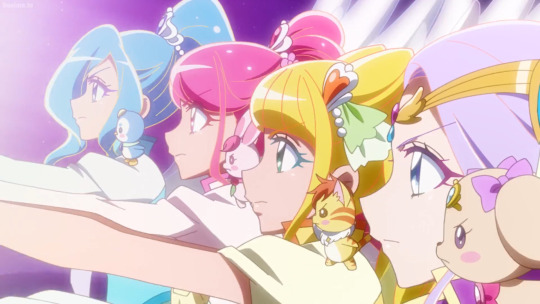
*sigh* Where do I start?
Well, one thing I’m pretty sure of is that COVID definitely affected production somehow. By that, I don’t just mean the show needing to go on hiatus, resulting in a shorter run compared to previous seasons. I’m also talking about any possible changes that might’ve been made to the original narrative, if there was one.
Much like how Suite’s story had to be altered in the wake of the 2011 Tohoku earthquake and tsunami disaster, I believe Heal underwent a similar treatment in response to the pandemic becoming more widespread as 2020 went on.
Especially since it dealt with health and nature, HealPre is probably the season that has come the closest in relevancy to real life events.
Frankly, that can be quite scary because this virus was and is still a fucking nightmare on a massive global scale. From that view, I can understand why the writers/producers would be concerned of the anime hitting too near home. At least for their main demographic’s (children) sake, maybe they were compelled to shift to something lighter and less edgier so that the kids could find some comfort and enjoyment in the midst of the world’s current crisis.
So I can’t fault Toei for that, if that’s really the case. Going through a pandemic is terrifying, infuriating and exhausting and UGH. We could use something that can help ease our worries or momentarily distract us even a little bit.
Though would it have killed them to dedicate one episode to the importance of wearing a mask or washing hands? (-_- ;;)
HOWEVER! Seeing as I am not a fragile child, I’ve still got several (oho~) criticisms to air out before I put this season behind me. This review isn’t particularly scathing but...there is a lot of discontent so you’ve been forewarned.
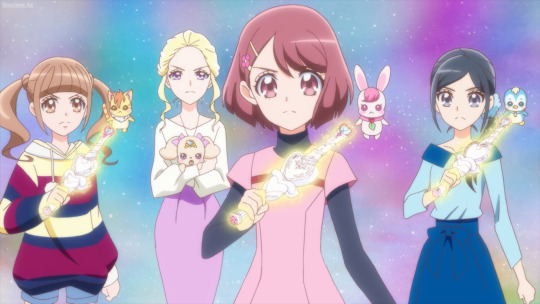
But first, let’s tediously review what structure means in Precure.
We all know that there are certain things that will forever (?) remain fixed in the series formula.
The plot is always going to be “magical girls fight evil doers threatening to ruin the world”.
There are plot points to indicate story progression but in reality, are put there to correspond with toy releases which are usually marked by these five: introductions, first power up, midseason Cure, second power up, and build-up to the climax + finale.
There is usually a specific message (a theme) to be told with every season and motifs (narrative tools) to aid in getting that across. For HealPre, the theme is “living is fighting” and its motifs are “health” and “nature”.
I left out “animals” b/c 1) it didn’t hold as much significance as the other two did, 2) animals are part of nature anyway and 3) let’s be real, it’s just a synonym for “mascots” which we already get every year. :P
Right. I’m probably forgetting something but for the most part, these are immovable pillars of Precure.
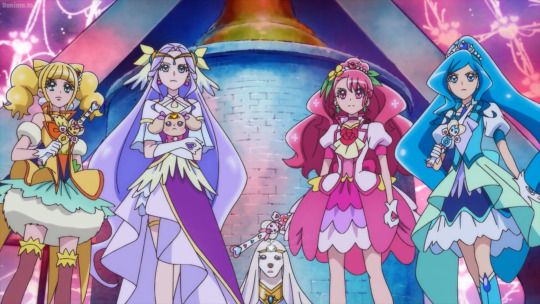
Story, on the other hand, has more variables you can work with.
Story is how you tell the plot, how you convey the message.
Precure, as a tv series, is unarguably carried by its main stars, the Cures. So it only makes sense that a huge percentage of a season’s success owes itself to how much of an impact its characters had on the audience as well as how effective their individual story arcs were as sub-plots tying back to the bigger picture (the message/theme).
Ideally, these arcs would shine the brightest in the filler episodes, where the plot (“good guys vs. bad guys”) is less of a focus so there is more space for personal development and growth.
Also, not all character arcs have to be directly related to the plot but they ought to be written well in order to support the overarching message (the theme).
Now, has HealPre done that? Has each girl’s story demonstrated a good example of what “living is fighting” means?
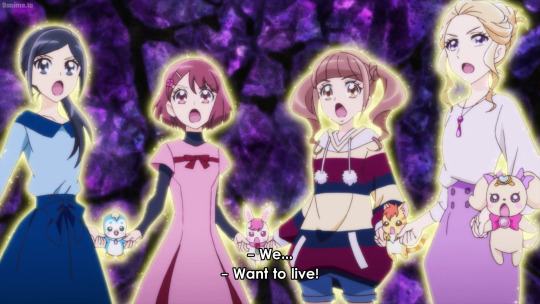
...nnnnnnyyeeee... look, even I can’t give a straightforward answer on that because while technically they did, by virtue of Nodoka’s observance in ep 44 recounting it as such, there’s also actually not enough to make it feel substantial from a viewer’s standpoint.
At least, that’s what I thought while watching HealPre.
With the exception of Nodoka’s, there was a lot of saying but not much doing to convincingly back the other girls’ arcs up. The fillers themselves were very weak, loosely composed in relation to the motifs and, if I may be so blunt, downright boring that if Nodoka didn’t phrase those episodes as things that counted towards the theme, I probably would put up more of a fight on disagreeing. so shoot me, I’m soft for her :P
And I know that sounds confusing right now but I will elaborate as I continue.
Before that though, to be utterly fair, some seasons keep their respective themes shrouded in vagueness until they’re given a more concrete form in words around the finale. So it’s not like we can do much except make educated guesses on what they really are. Most of the time, we’re just measuring everything against our perception of a standard in the fog. Or maybe that’s just me?
Nevertheless, you can just tell, y’know? By simply watching and observing the whole show, you can tell if the characterization, the development, and the outcome (essentially the content given) really live up to what the season claims is endgame.
So let’s go through that first then. The characters, starting with our lead Cure...
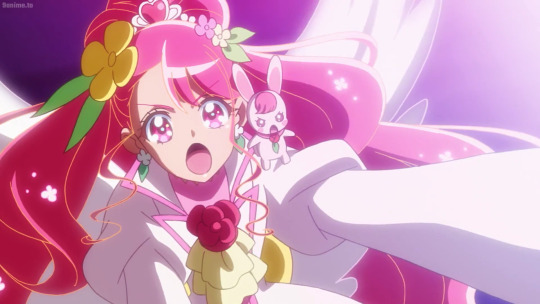
Nodoka being the only Cure in her team to have an arc deserving of the praise “exceptional” should come as a surprise to no one.
She was the most solid in terms of direction on how her story was going to proceed. Out of all the girls, her journey had the greatest connection to the subject “health”, repeatedly delved into it every time the spotlight was on her and fulfilled everything it seemed to promise from her debut in episode 1.
Her struggles on the road to recovery from a long-term illness and the strength she’s drawn from that traumatizing experience as well as her time as Precure did more than establish her as the strongest character in HealPre.
She has also rose to become one of the most memorable Pink Cures in the entire franchise (personally, I rank her in the top 5).
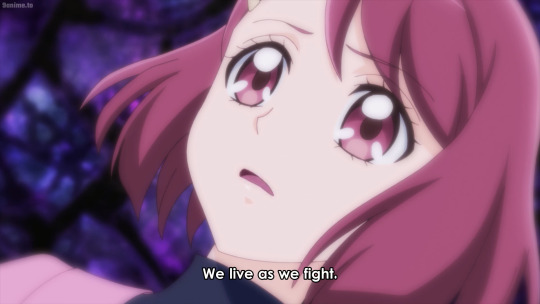
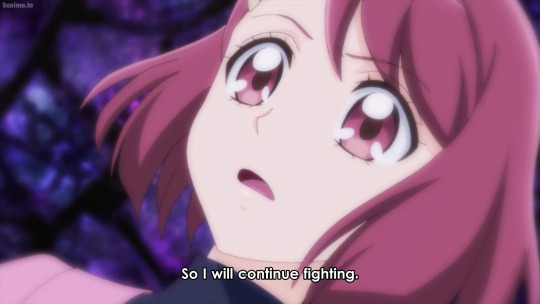
And it’s not hard to see why she’s earned such high regard in a lot of fans’ hearts.
The writers clearly worked a lot on her character composition to the point where she can pretty much embody the theme of “living is fighting” all on her own.
She came into HealPre fresh out of the hospital and full of earnest desire to make the most of her newfound freedom but she also wasn’t without knowledge on what hardship is. From there, she only got stronger, even when she was stumbling and trying to figure things out along the way. She grew more fortified in her beliefs on what it means to be truly live a healthy life.
She bravely defied the ones who attempted to take advantage of her and twist her cause against her. And she learned that taking care of herself is equally as important as wanting others to be safe from harm.
It was never about winning or coming out on top. It was about protecting a fundamental yet precious truth. That one thing any decent human being should never have to concede: the right to live well.
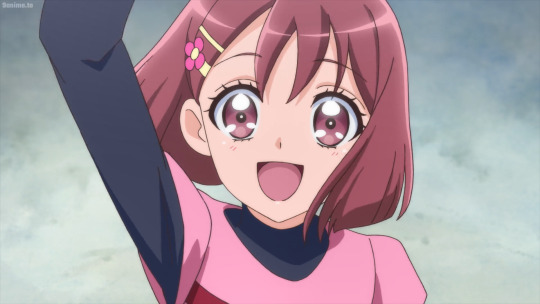
Honestly, Nodoka is absolutely inspiring all around, as a fictional character, a heroine and a normal everyday person.
Everything about her arc went satisfyingly right like it was meant to and the best thing is, we don’t need to question it because we saw how it all happened with our very own eyes.
I sincerely wished I could say the same for the others but sadly, they were just too flawed.
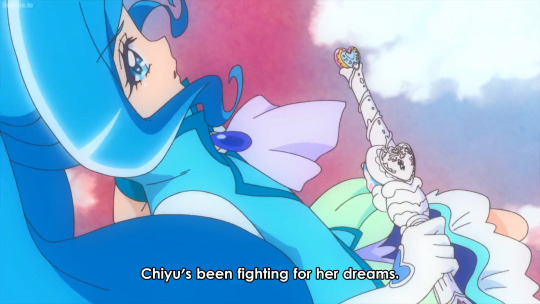
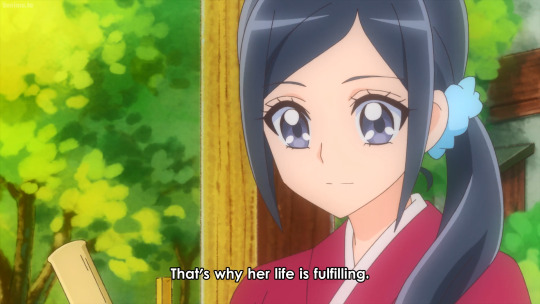
And Pegitan can throw flippers with me all day if he wants but as undeniable as the above statements are about Chiyu, her arc failed to leap over the increasingly mounting disappointment I had with every episode that’s been assigned solely to her.
Two of which weren’t even about Chiyu. One centered on Pegitan’s admiration for his partner and the other focused on her brother, Touji. Which, while nice to give to supporting/secondary characters, is a fat waste of valuable screentime and not what I’m here for.
It also didn’t help that the conflict of her arc (the indecision over choosing between two dreams) started really late in the game and was resolved so quickly within two episodes. There was no time for me to get invested into it, there was no powerful sense of conviction like how Go!Pri or Hugtto handled theirs and really, it just felt like Chiyu was only following what the script dictated for her rather than genuinely awakening to her own competitive passion towards track and field.
It was almost like it didn’t matter. Almost as if the writers procrastinated in thinking up something worthwhile to further her development...but then settled on grabbing an old idea off the shelf without refining it to suit Chiyu when they ran out of time.
This happened similarly with Minami in Go!Pri and Elena in StarPre, both of whom left me angry at how their arcs were executed. Yet theirs don’t compare to how pissed off I am about Chiyu’s. Because while Minami’s took a while to arrive, it wasn’t done poorly and linked back to Go!Pri’s theme well enough. And while Elena’s was over crammed last minute, at least it was unique to her character and had lots of potential ways to play out if they actually started it earlier on in StarPre.
Chiyu’s arc is like a discount version of the former with hardly any of the intriguing qualities of the latter. Sure, she had two early episodes that laid out the two most important aspects of her life (her family inn and her dedication to her sport) but after that, they weren’t brought up again until we were only weeks away from the ending. Y’know, just to fill up episode slots and meet the minimal requirement of saying they did give Chiyu some issue to resolve.
It was not engaging at all.
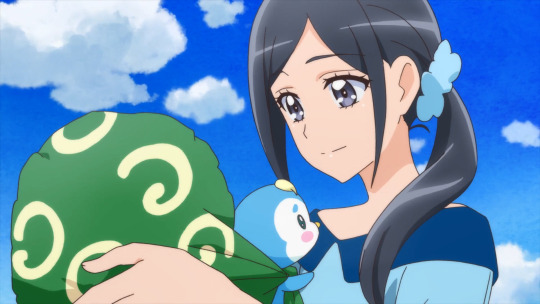
Furthermore, the fact that her arc had very little to no relation with either “health” or “nature” hurt my appreciation of her character somewhat. I just...don’t think her kind of story really matches with the central topics of HealPre?
...but maybe I’m being bitter about this all wrong and that’s screwing up my rational thinking on this matter.
Because Chiyu’s arc is valid under the logic of the overall theme, I would never say it isn’t. And again, character arcs don’t have to be close to the plot nor is it necessary to employ the “suffering builds character” method to make them interesting.
Chiyu always does her best every day. That’s sufficient argument on why her story does fit within the frame of HealPre’s premise.
Guess I’ll just have to wrangle my resistance into acceptance somehow.
...still, her arc could’ve been done so much better than what we were given. Chiyu at least deserved that much.
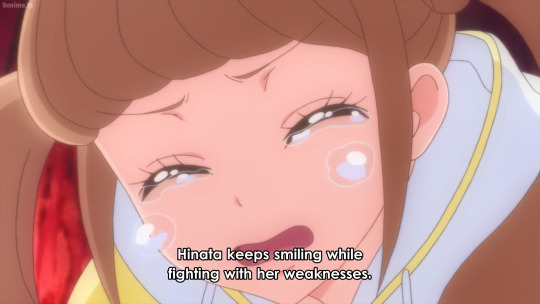
Next, Hinata.
Since the beginning, I knew she was gonna be runner-up to Nodoka for having the (for lack of better term atm) “best” arc because it was heavily implied that she has ADHD and therefore, immediately checked off the “health” trait. She was even more obvious about it than Nozomi was.
Difficulty paying attention, hyperactivity, impulsiveness. Hinata didn’t just display all those signs, she also showed how hard it was for her to deal with the downsides to them on a regular basis.
She kept apologizing and put herself down excessively for inconveniencing her friends even though they never blamed her for her condition. Got them annoyed a few times, yes, but didn’t stop them from staying friends with her and definitely didn’t make them hate her either.
Everybody was understanding of Hinata...except Hinata because she always took her failures to heart and considered quitting several times to avoid the crushing dejection of making mistakes over and over again.
She got better, though, and no one could have summed it up more heartwarmingly than Nyatoran with the encouraging words he gave her at the conclusion of her arc.
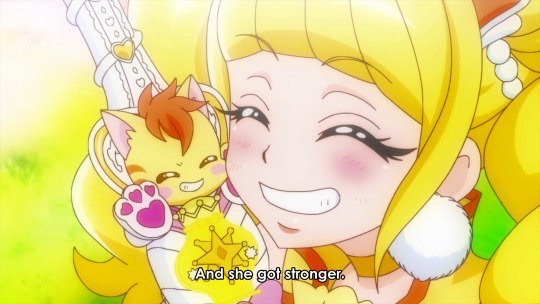
But it still feels like there’s a huge chunk of development missing between the start and finish. Or rather, it seemed like all of it occurred offscreen and we were only informed later that it did in fact, happen.
To recap, iirc, Hinata had around 5 episodes that focused on her (ep 9, 13, 23, 35 and 40). Ep 18 doesn’t count because that was a Nyatoran-centric filler more than anything.
Ep 9 and 13 did their jobs of introducing and highlighting the details of Hinata’s troubles while also suggesting she will eventually learn to overcome her insecurities. The ones after, though? They pushed those issues to the backseat.
In Ep 23, she had to share the (uneven) spotlight with Asumi. Hinata’s improvements were briefly mentioned but the majority of the ep went to teaching Asumi what “cute” meant and how to get along with puppies. I mean, I get that Asumi recently joined the group and bonding with her was mandatory by tradition. But since each Cure only gets a limited number of eps to herself, it would’ve been more beneficial for Hinata if she didn’t have to split screentime with someone else’s growth schedule.
Ep 35 is slightly better but not by a whole lot. Sure, Natasha was able to reconcile with Elizabeth which was very sweet and heck, it was the goal for that episode. But again, nothing was really done or addressed about Hinata’s main conflict. She tossed it back with the rest of her homework to deal with later. ahaha, a TroPre hint
Then ep 40 came to formally close the curtains on her story and apparently, Hinata screwed up lots of times since...whenever but she picked herself up every time after and kept on trying. Awesome. So WHY didn’t we get to see that?
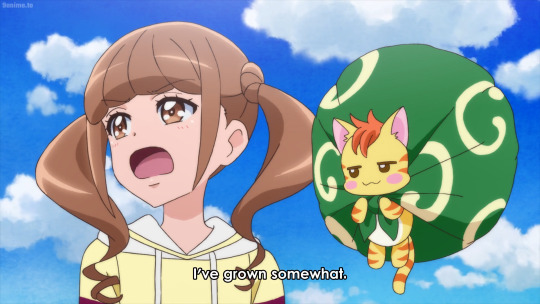
I’m not asking for the impossible here. I’m not asking for Hinata to be cured or anything miraculous like that. There is treatment available for ADHD but it is not curable.
Also, forcing Hinata to find a way to get better at studying, the thing she struggles with the most, is not the solution either because that would only make her more stressed and anxious over her own disorder.
What I want is to see how she moved from wailing “I can’t do it! I don’t wanna! I’m so scared of failing so why bother?!” to determinedly declaring “So what if I failed 1 or 100 times? So what if I fail another 1000 times? What matters is that I don’t let that stop me!”
That confidence is not something that can be built up overnight. It’s gradual and it takes numerous tries to reach from where Hinata was to where Hinata is now.
Telling me she grew emotionally stronger can only allow me to believe so much. I need to actually witness the changes as well.
If it weren’t for that, Hinata’s arc would have been a lot more impressive. Shame.
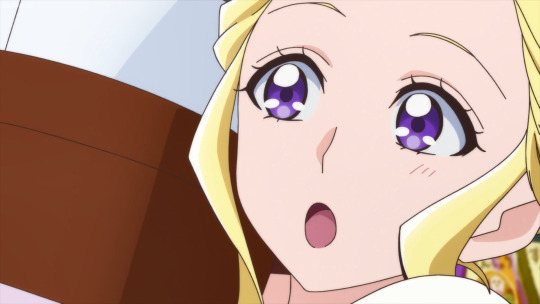
Finally............... Asumi.
Asumi, Asumi, Asumi, Asumi, Asumi, Asumi, Asumi... *sighs & drums fingers*
...she has no arc, ok? Seriously, what story is there to speak of, much less write a hefty analysis on?
A spirit born for the sake of Latte who just went along with the Precure ride because Latte didn’t want to abandon her duty. She made friends with those who aren’t Latte, extended her knowledge and understanding and gained valuable human experience during her stay on Earth. But ultimately, she will always define her entire existence around a puppy.
Nothing is more important than this puppy.
...... to be honest, Asumi not having a storyline isn’t what bothers me. It’s her lack of depth that does.
Hell, even the giant burger she ate had more depth than she did!
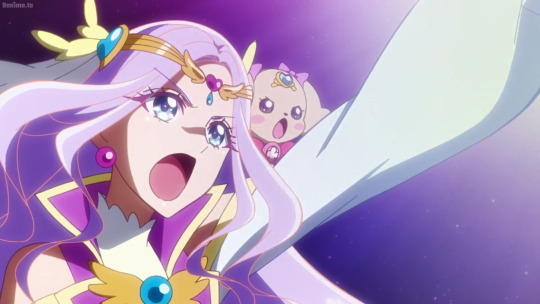
Oh, Asumi does have a personality alright. She’s consistently and unfailingly polite, utterly devoted to her raison d’être and in crucial moments, gives pearls of wisdom when the girls are in a pinch. She’s good.
But if that’s all she is, then she’s also painfully dull.
She has nothing to contribute to the discussion of health or nature, despite being created through an element of the Earth so you’d think she’d have an opinion of her own. At least worry about the planet that gave life to her as much as she frets over Latte all the time. But nope.
She shares the exact same face as Teatine’s past Precure partner so you’d think we’d explore that connection to see if it would influence or affect her in any way. But nope.
90% of the time, her role was just being Latte’s constant, fawning satellite.
Not only did that irritate the hell out of me but it just reinforced my stance that this type of character is one of the worst you can ever insert into any narrative.
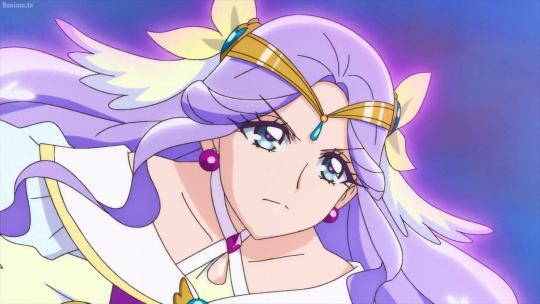
Because if someone keeps reiterating how much they’re obsessed with this one thing and seldom talks about anything else without bringing their obsession into it... then what’s so special about them on their own?
You’ve practically surrendered the different qualities you could have had for worship of something else. That’s not a fair trade-in.
Asumi’s character is so packed with Latte-related stuff that there’s not much space left for anything that can be considered uniquely Asumi.
I mean, maybe it’s because I can never see myself or any normal person comfortable with living like that.
Living for the sake of being together with the one you love? Okay. But living with your whole universe revolving around that one thing? Making most if not all decisions based on this one thing?
No. That’s absolutely crazy, alright? Nobody with a healthy amount of awareness and self-worth would live like that.
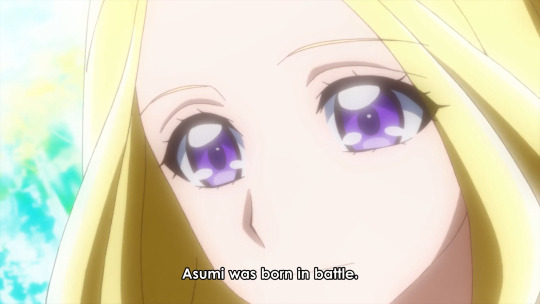
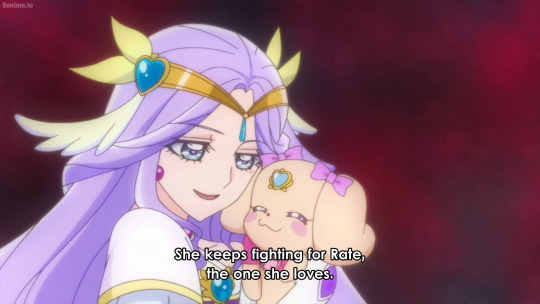
And you can counter that Asumi’s just born like that. That she can’t help her origins because Teatine’s wish to protect her daughter is essentially what brought Asumi into existence so of course, her biggest concern would be Latte. At least, she wasn’t forced into it, right? As long as Asumi chose of her own will to follow Latte, it should be fine, right?
You can even use the fact that Asumi isn’t human. That she’s a spirit and we shouldn’t apply our human standards too strictly to her.
Yea, but those are feeble defenses in the face of her being a good main character, a good main heroine.
There are many ways to make a decent MC. The way Asumi was written proves she certainly does not possess traits that can classify her as true protagonist material. A protagonist has to be more than one amplified feature, which Asumi is not.
For the record, I don’t hate Asumi (she’s not interesting enough to generate a feeling that intense). I'm just severely let down because even if I don’t end up loving the midseason Cure for whatever reason, I can usually count on them to bring something intriguing to the table to dissect and analyze. At least I should find something to care about them.
Didn’t happen with her. :(
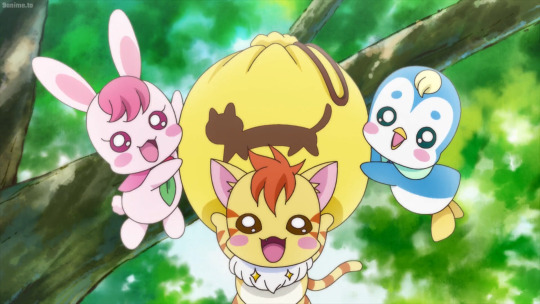
Oh god, I’ve been working on this post for days now and I’ve got a headache and with the baton pass happening in less than a few hours as I type this, I just really need to get it done and over with so please forgive me for speeding up through the rest, I’ll try to keep it as coherent as possible. NYARGH! (@_@ ;;)
Mascots.
Would you be surprised to hear that I’m not surprised that they were actually written very well?
Like I said early on, I suspected the return of fairy partnerships were going to improve the mascots’ significance in the story and, well, I was right.
This time, they didn’t just fill in the usual expectations of relaying exposition, serving as the Cures’ transformation devices and looking cute for the merchandise. The Healing Animals had to make progress on their own training to become doctors as well.
And they did through their relationships with their human partners.
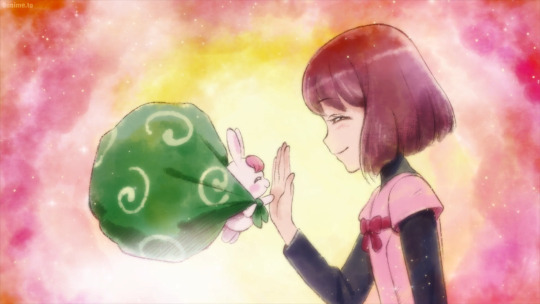
It was a refreshing take on the mascot aspect of the series because the friendships felt really symbiotic. When the trainees arrived on Earth, they relied on the girls to help them perform their jobs as well as provide them with shelter, food, the occasional peptalk about their trainee status, etc.
Then as the story continued and they got to know each other better, the mascots were able to return the favor by giving support when the Cures needed it. Rabirin when Nodoka was frightened and confused about how to deal with Daruizen, Pegitan when Chiyu was having trouble choosing between two dreams and Nyatoran who made sure to always lift Hinata’s spirits up when she got upset at herself.
In short, they achieved their objectives of learning what it means to be good doctors by being there for their friends! How wonderful! :D
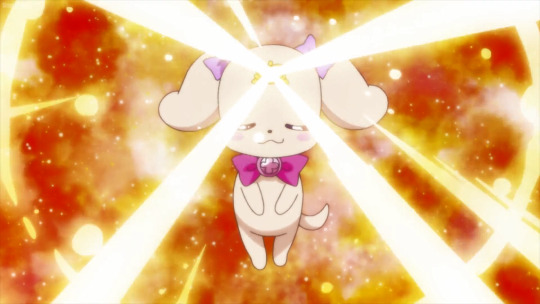
My memory for Latte is hazy, unfortunately, since she’s coddled by everyone all the time (can’t blame them, she’s friggin’ adorable! <3) but I’ll never forget how she stood firm on the battlefield to see things through, to fight for the Earth like she promised her mother. She started out so babie but showed us all there was enormous bravery behind her cute face and ugh, we should all be very proud of her! <3
The only major issues I had about the mascots were these:
1) Too many irrelevant fillers went to them. They only needed a maximum of two for their entire mascot group.
2) Latte kept getting sick even after she acquired a Precure partner of her own. I was hoping it wouldn’t hurt her as much as it did before Asumi arrived or that she would build up a stronger immunity but noooo, they insisted on torturing the poor pupper! T_T
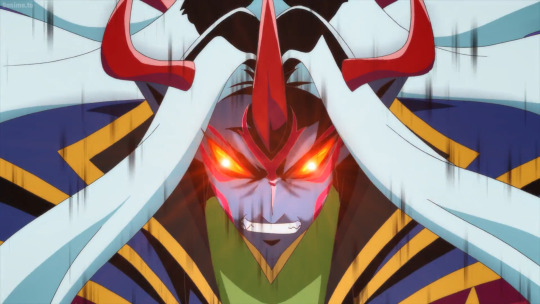
Villains + Finale Battle
Not a lot needs to be said for the first part. We’ve had mediocre antagonists before. HealPre’s just happened to be extra annoying as they were despicable.
Which is worse because jerks you can just leave in the trash but assholes won’t stop harassing you unless you pummel them into their graves, set fire to their corpses and leave no trace of them behind! >:(
Y’all know who I’m talking about. Opinions on him continue to vary depending on who you talk to and if they’re avid fans of his face or not but whatever. The son of a bitch served his purpose and is dead now. That’s all that matters to me.
Anyway, the King was flat like his two lesser generals. He was neither intimidating nor distinguished enough in the brand of evil to really make us think of him as a serious threat and because of that, it ended up making the boss fight look like any run of the mill boss fight.
I know, they tried so hard with all that shiny animation but it just didn’t have that glorious sense of vindication that previous seasons (or ep 42) gave and I blame it all on this Rumiko Takahashi reject.
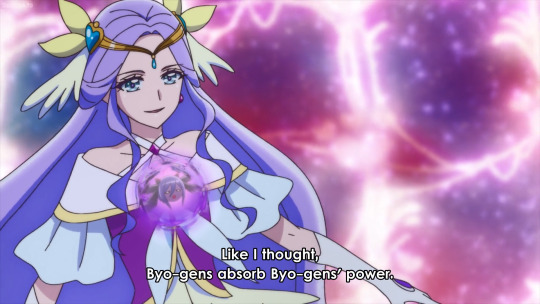
Also, this strategy was pretty useless?
They built it up like Earth was gonna sacrifice herself and die or something (she wouldn’t and even if she came close, deus ex machina would’ve kicked in to prevent that and COVID-induced caution too I guess).
But there were no signs of pain (well, that’s a relief) after absorbing Shindoi-ne and they really pissed King Byogen off more than they did any damage with the absorbed byo-gen power.
...so yea, this tactic was just to kill some time and budget, nothing more. Meh.
By the way, did Asumi eject Shindoi-ne’s pathogen out of her body yet or did they just leave it in there to bounce around until it eventually dissolves on its own?
Because that’s eww. I mean, it’s obviously not gonna hurt Asumi they can both relate on hyperfocusing their affection for someone so maybe the compatibility helps :P but still, ewwwww.
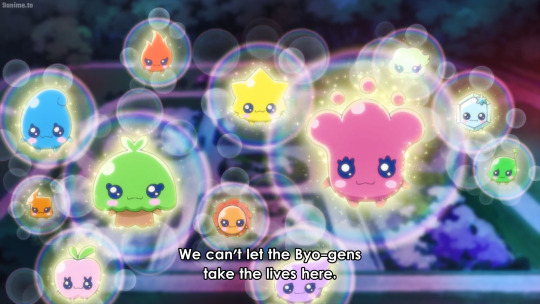
Fillers + Underused Motifs
In hindsight, perhaps HealPre didn’t exactly promise the content we I wanted about “health” and “nature” if their objective was to teach that any manner of “fighting” can count towards “living”.
......but fuck you Toei, you’re still cowards! >:/
Fillers will be fillers but it’s always better to try and make some of them as meaningful as possible. And they wasted the opportunity to inform an impressionable audience (during a very crucial period of our time, I must add) on a lot of things related to the HealPre’s motifs. Especially about the environment which for some ridiculous reason, they chose not to touch on for the main stretch of the overall story.
Proper hygiene, good diet plan and sleeping habits, regular exercise (already done by the girls a few times but could use another example), meditation, counseling/therapy (especially for mental health!), etc.
Real life pollution, climate change/global warming (IMPORTANT!!), deforestation, preservation vs conservation, endangered species, recycling, volunteering to clean up your community, etc.
These just came off the top of my head but yes, there’s more and no, I’m not saying that the writers need to cover all of them in extreme detail or replace the slice-of-life episodes.
But they should be able to mesh both serious and light-hearted together in harmony somehow. Like those fillers where the mascots saw people cleaning up littering at the park or that interaction with that arborist who taught them about wild animals and trees when the group went to visit a lake.
For health, maybe let the girls visit patients with chronic illness in the hospital or have them converse with a medical professional on some matter. Particularly if it’s got something to do with mental illness because stigma in Japan on those who are afflicted with such conditions is still prevalent and has caused a number of sad and shocking tragedies that could have otherwise been avoided if people didn’t have such outdated, judgmental mindsets.
That last part might be too dark for a children’s anime but there’s a lot more out there that is doable.
Do that without reducing it into a footnote, Toei. It is so necessary for your target audience to be aware of these issues at the age they are now. You have an almost 20-year old franchise to serve as a very effective platform. Make better use of it if you truly care about the message you’re conveying through your show!
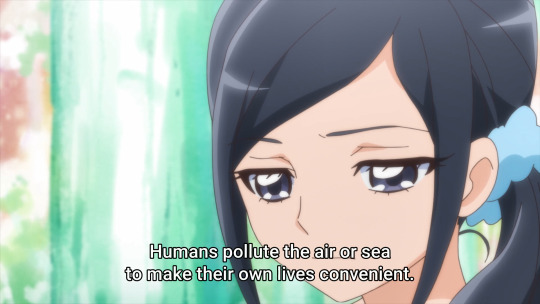
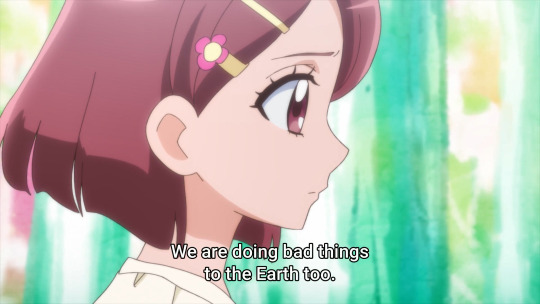
Also, what the fuck.
The last episode was a mess. Why are you only mentioning this now when the season is already over?
This should’ve been brought up months ago!
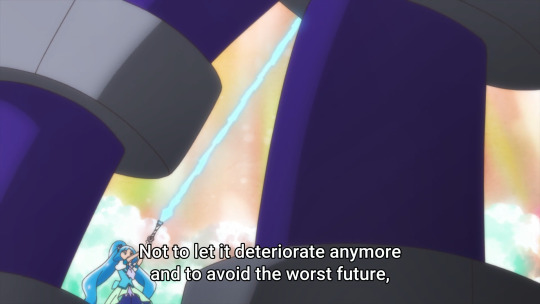
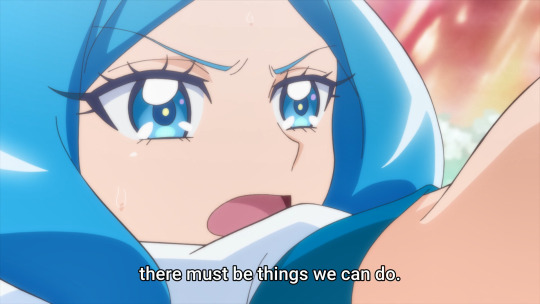
All the things we could’ve seen the Cures done to protect the Earth without magic.
The excuse of “I didn’t know humans were so horrible!” is a shit one because everybody knows humans are deplorable trash when it comes to abusing the Earth. All the more reason why you have to persistently drill it into people’s heads that they should not be like those who don’t care or choose not to care.
One crack episode isn’t going to cut that.
God, I so want to unsee this ep just so I don’t have to end HealPre on a more sour note than it already was. *big aggrieved sigh*
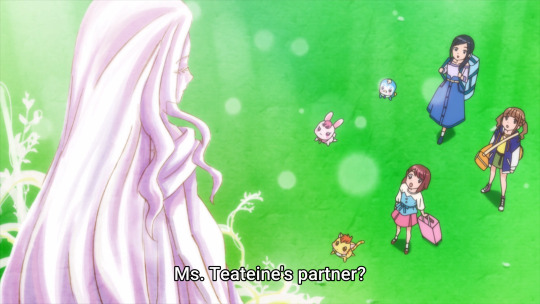
Lastly (and this really is the end of my long ranting, I promise), the missing undisclosed lore.
There are few Precure seasons without a past lore of its own in the recent years. Is it a wonder, though?
Lore is mysterious and fascinating. If it involves a past Precure, even more so.
Sometimes fans might just hang onto a show because they’re curious about what happened before the main story. We’d never get the full tale of those adventures but at least, it’s fun to imagine the “prequel”.
Also, past Precure are just badass. Fact.
Strangely enough, we didn’t get that for Heal. All we know is that she was called “Fuu” and was very close to Teatine.
Hmm. Probably one of those changes caused by COVID interference cuz I can’t imagine the writers choosing not to tell her past in the original draft.
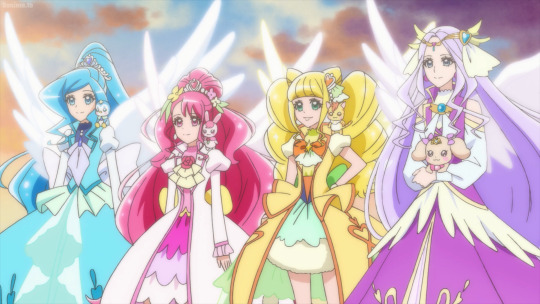
With all that finally off my chest, I’m ready to part ways with you girls until the next All Stars (Nodoka, I’m gonna miss you so much! T_T)
HealPre wasn’t the worst and it was nowhere near the best that it had the potential to be. But it’s passable. At least for those who loved it even with its flaws, I’m genuinely glad it was good for you.
For those who are thinking about picking it up (although why you would read this spoilery post before watching, I have no idea), if you’re looking for a standard magical girl anime to enjoy casually, then this is a safe pick. If you really want to invest your attention and heart into it, though? Then perhaps it would be in your interest to ask someone who saw it already to help you filter out the episodes that are worth watching. You don’t need to worry about the rest, they’re inconsequential. :P
Ok then! Thanks for reading as always, brave souls who have reached this point.
Stay healthy and safe out there and I’ll see you at the beach next week! Tropic underwater paradise here we coooooommmmmeeeeee!!!!!!!!!!!! xDDD
#i rage quit two drafts and an outline before i got anywhere with this#now if you'll excuse me i gotta catch up on my workout and play pokemon and eat pho later#and catch up on the ccs manga#livin' the healthy life oh yea~#healin' good precure#cure grace#cure fontaine#cure sparkle#cure earth#hanadera nodoka#sawaizumi chiyu#hiramitsu hinata#fuurin asumi#rabirin#pegitan#nyatoran#latte
10 notes
·
View notes
Link
Bandai Namco has released new information and screenshots for “Brain Punk” action RPG Scarlet Nexus introducing the game’s world, dual protagonists, and characters Arashi Spring, Shiden Ritter, Kyoka Eden, Kagero Donne, Naomi Randall, and Cullen Travers.
Get the details below.
■ World
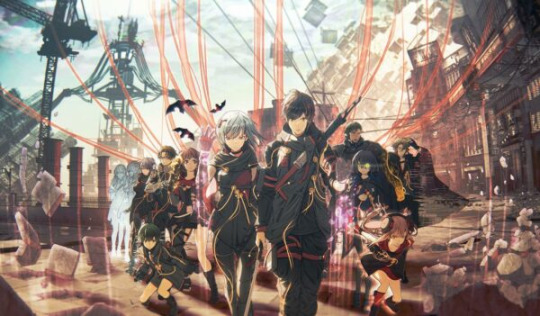
Long ago, deranged mutants known as “Others” began to descend from the sky with a hunger for human brains. Humanity had no choice but to lead an enclosed life on the earth’s surface, but thanks to highly developed science and technology based on “psionics,” extra-sensory abilities that everyone has by nature, all things in world were connected by a large-scale network.
In this world where brain science has developed beyond convention, an army to oppose the Others known as the “Others Suppression Force” (OSF) was formed in New Himuka.
The OSF is an army of soldiers that possess exceptionally powerful abilities called “powers,” and are the only ones with the strength to annihilate the Others.
For the people, the members of the OSF are heroes, stars, and role models. This era was long-lasting, and the Others are now perceived as a natural phenomenon in the vein of thunderstorms and typhoons in that battles against the Others are an unfortunate occurrence that exist as an extension of everyday life.
The OSF will be joined by new recruits against this year. They, too, are forced to fight on the frontlines of the never-ending battle between humanity and the Others.
Experience a deep story of human connection from Bandai Namco Studios and the developers behind the Tales of series.
—New Himuka: A near-future world developed by psionics.
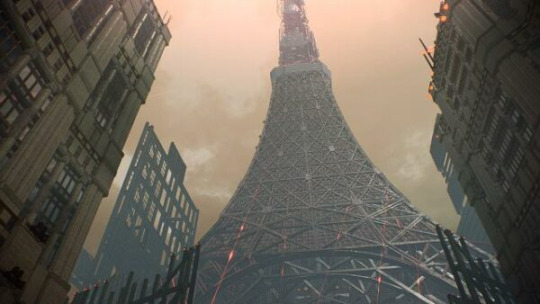
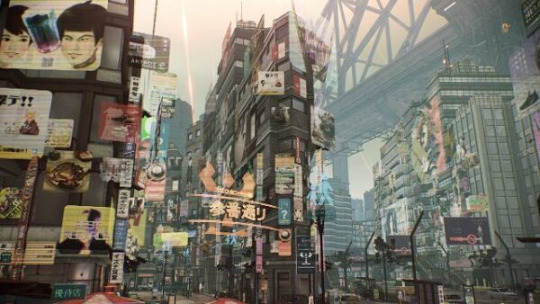
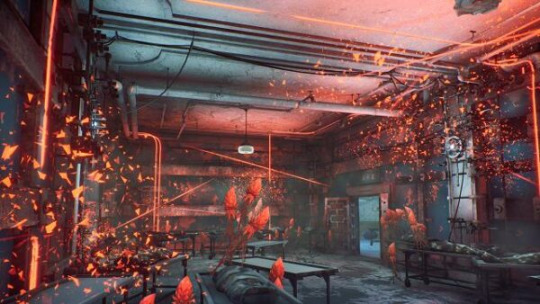
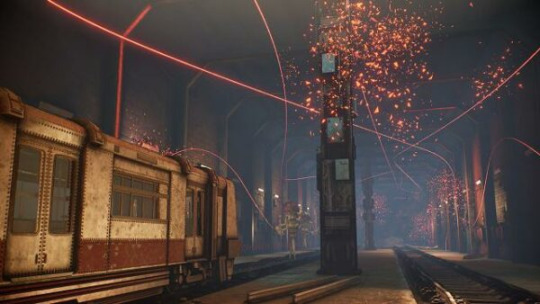
—The story of superpowered humans with particularly outstanding strength.
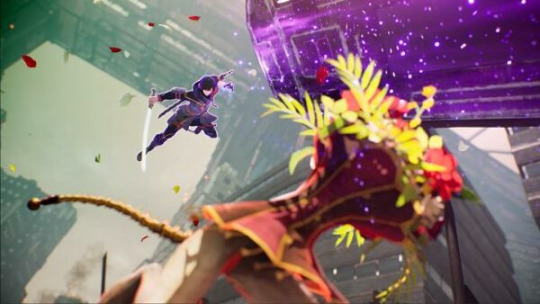
The Others
A threat to humanity that has existed since ancient times. Deranged mutants that descended from the sky with a hunger for human brains.
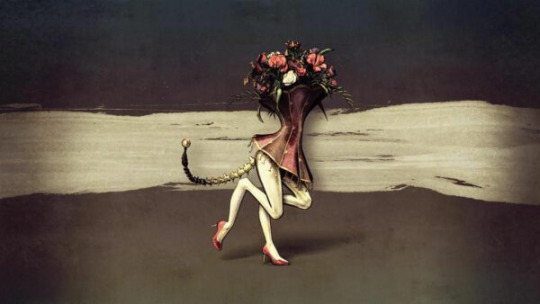
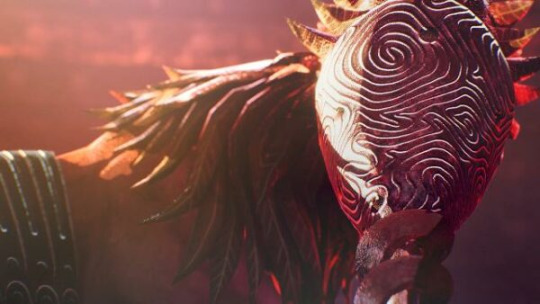
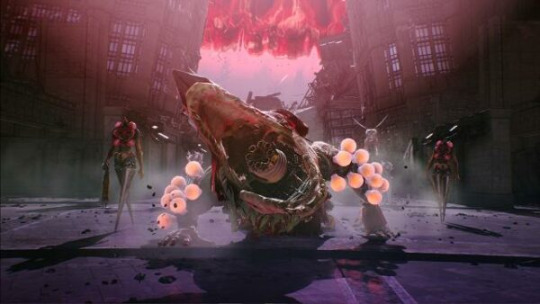
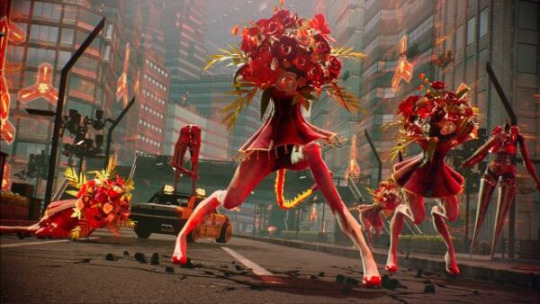
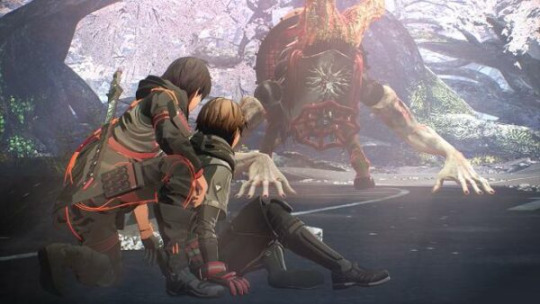
Others Suppression Force
A group of humans with powers formed to protect the people from the Others.
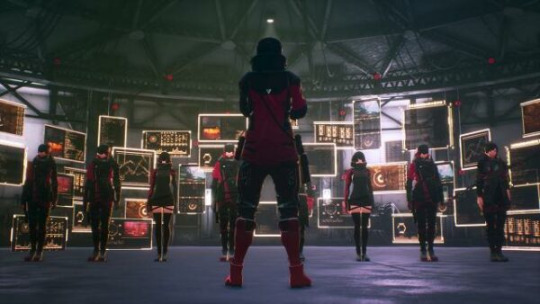
Their standout features are red cables and hoods. They are known as the “Scarlet Guardians.”
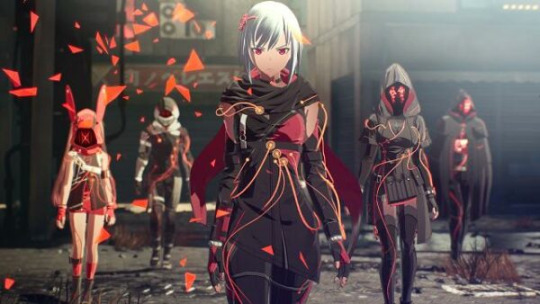
■ Dual Protagonists
Scarlet Nexus has two protagonists: Yuito Sumeragi, whose life was saved by a member of the OSF at a young age; and Kasane Randall, an elite scouted by the OSF who was always at the top of her class in training school. A dramatic story await players from the perspectives of two protagonists who have joined the OSF as new recruits.
Players will start the game by choosing one of the two protagonists. Which protagonist you choose is up to you. By playing as both protagonists, previously unseen truths behind certain events will come to light, such as conflicts between OSF soldiers and the “Red Strings” that hold the key to the story. The fate of the world is at hand.
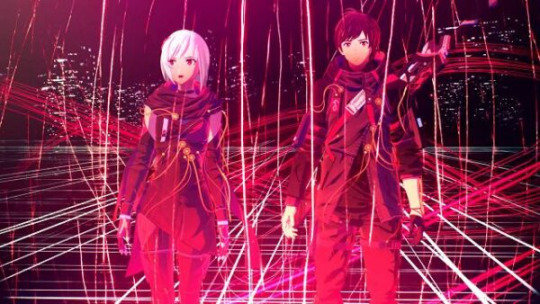
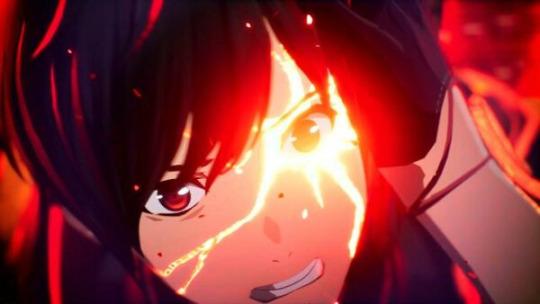
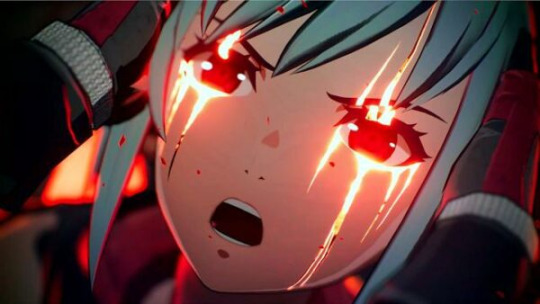
■ Characters
Arashi Spring (voiced by Yui Horie)
“Being able to selfishly slack off whenever I want is something a grownup gets to do.”
Power: Hypervelocity
Service Record in the OSF: 29 Years
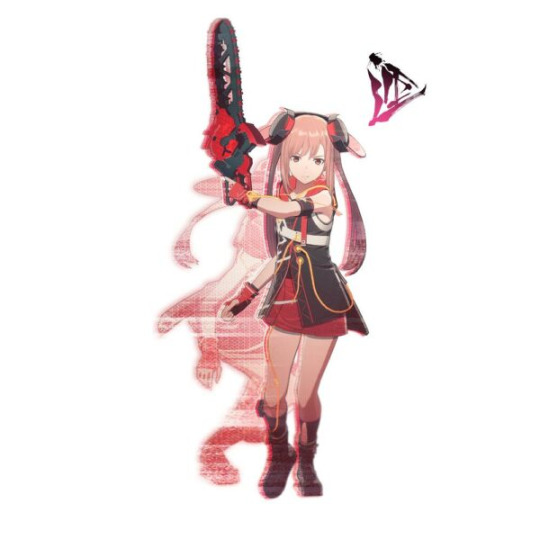
As the face of the OSF, she works as public relations and has enthusiastic fans of all ages and genders, but the hard working, cheerful, and sweet girl she plays on screen is only a persona for the camera. In truth, she is a sloth who is more enthusiastic about playing slacking off than she is working. Some of her teammates even tease her with the nickname “Lazy Ara” since as soon as the cameras go off, she loosens up and slacks off.
However, her true abilities are rumored to be on par with those of the “Septentrion,” and she is a also a gifted engineer. If she is motivated enough, her calmness and brilliant mind are extremely reliable assets. She is also the older sister of Fubuki Spring, the commander of the 1st Regiment of the OSF Arm. While she may seem younger than Fubuki at first glance due to the effects of anti-aging drugs, she is in fact the older one.
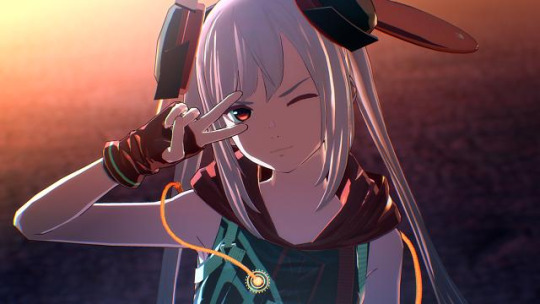
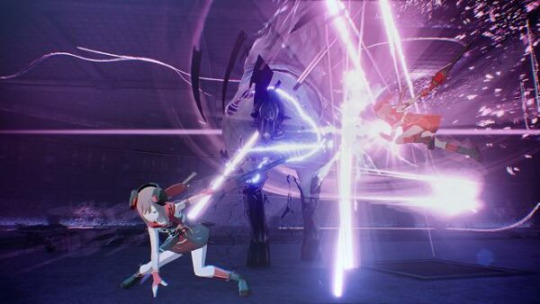
Shiden Ritter (voiced by Kengo Kawanishi)
“I don’t plan on being your friend.”
Power: Electrokinesis
Service Record in the OSF: 14 Years
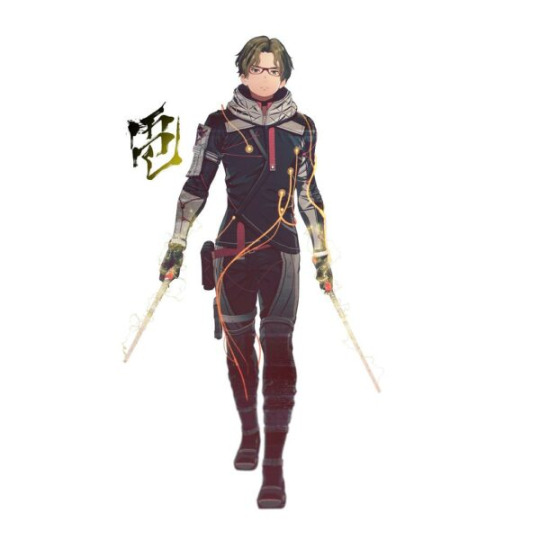
A twisted and cruel OSF soldier with a sharp tongue. His high sense of pride, slight negativity, and highly strict nature tend to cause problems for his teammates. He did not get along with the commanding officer of his previous platoon and was reassigned to a new platoon where he teamed up Kasane. His ability in combat, however, is outstanding, and his results on the battlefield make up for his bad attitude.
He does not shy away from complimenting those stronger than himself, and both admires and longs to become as strong as the seven members of the “Septentrion.” Above all, he has particular respect for Seto Narukami, who possesses the same “Electrokinesis” power as him.
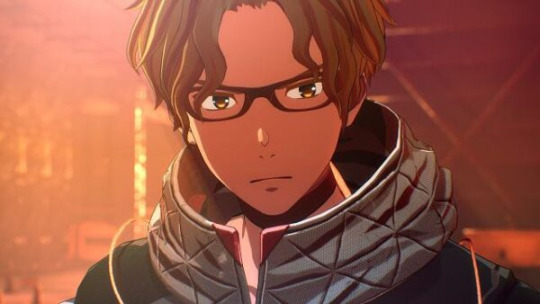
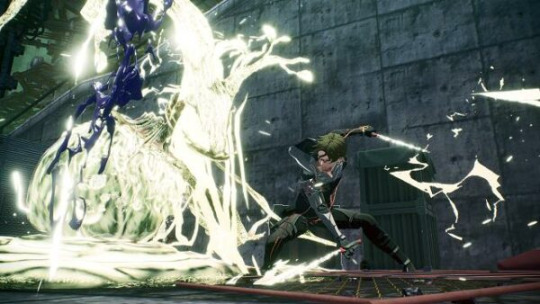
Kyoka Eden (voiced by Yumi Hara)
“We can’t just abandon people who need our help. Let’s do what we can.”
Power: Duplication
Service Record in the OSF: 29 Years
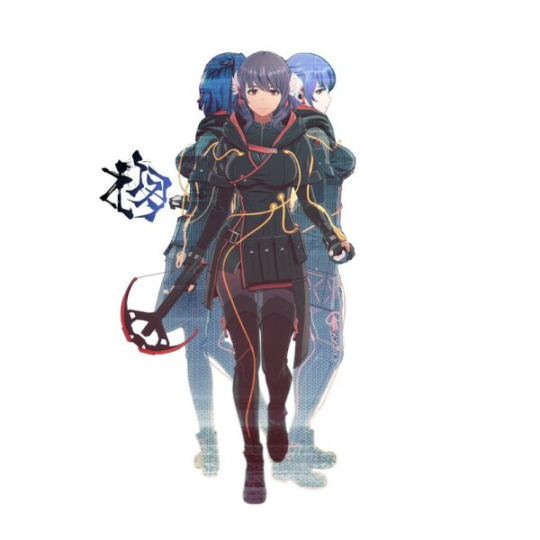
As an OSF member gifted with beauty and brains, Kyoka’s name is widely known. While she has many fans both inside and outside of the force, she herself does not seem very interested in her appearance. She is great at looking after her units and often oversees platoons as a result. She usually has a kind and gentle air about her, but becomes an entirely different and dauntless person in battle.
She considers the members of her unit to be like family, and shows a strong motherly side in that she is devoted to her comrades and subordinates to the point of nosiness. She loves things like jinxes, good-luck charms, and fortune-telling, and cannot help but try out each new one she discovers. She and Arashi graduated in the same class and know each other very well.
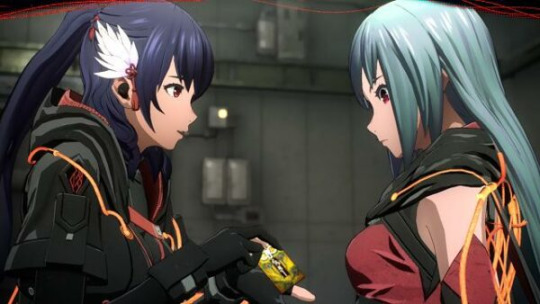
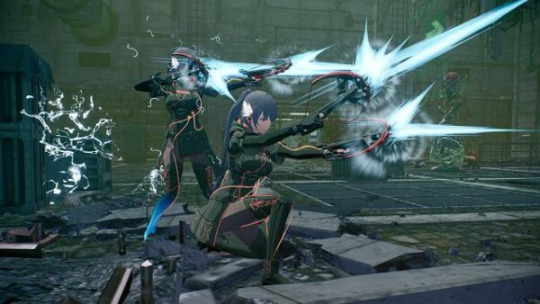
Kagero Donne (voiced by Daisuke Namikawa)
“Man, my invisibility power really saved the day!”
Power: Invisibility
Service Record in the OSF: 12 Years
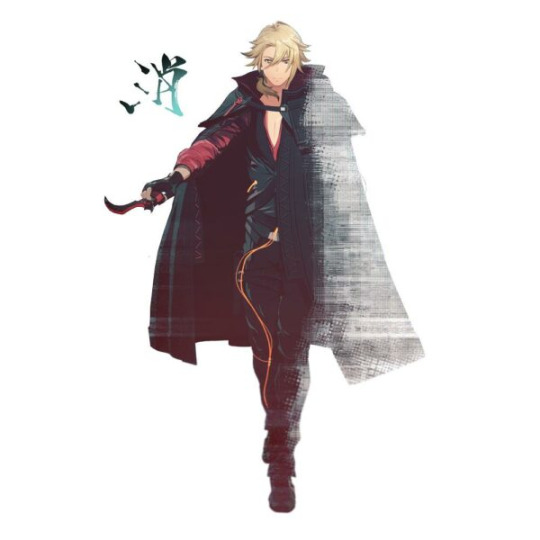
A sociable, somewhat frivolous young man. He was scouted by the OSF after becoming an adult, which is much later than usual, and is commonly referred to as the “adult enlistment.” With his handsome appearance and silver tongue, he can get along with anyone and get himself out of any situation. According to himself, he is especially popular with women. The mood maker of the party, he is calm in a pinch and jokes around even in the direst times, but never seems faltered. He is an immigrant from Togetsu, a priest of their faith. However, he does not appear interested in their teachings anymore. His past is the only aspect of his life that he is secretive about.
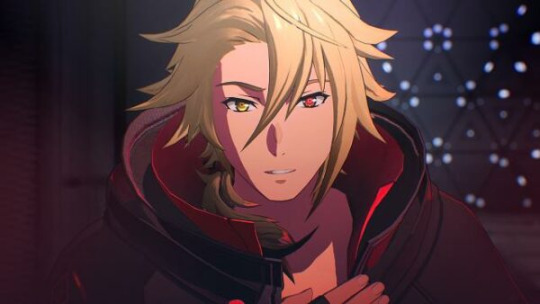
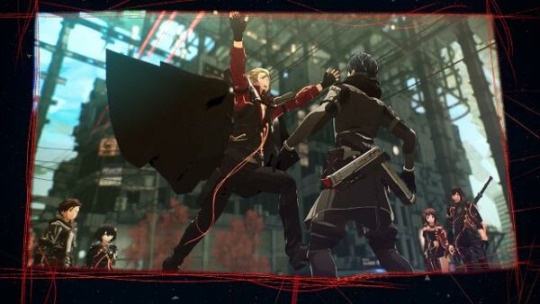
Naomi Randall (voiced by Asuka Nishi)
“Kasane is the type of person who is easily misunderstood, so I would worry if I’m not by her side.”
Power: Precognition
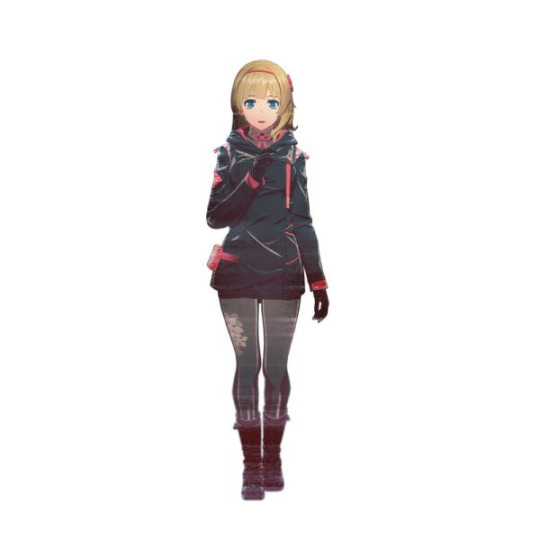
Kasane’s kind and somewhat reserved adoptive older sister. As the eldest daughter of the wealthy Randall family, she grew up comfortably as a princess doted on by her parents. However, she is selfless, treats everyone equally, and possesses the integrity and strength to side with the weak and crush the strong. Although she is the same age as Kasane, she treats the adopted Kasane like a younger sister. She loves Kasane like a real sister and shows her affection from the bottom of her heart. She supports Kasane often, who tends to clash with others.
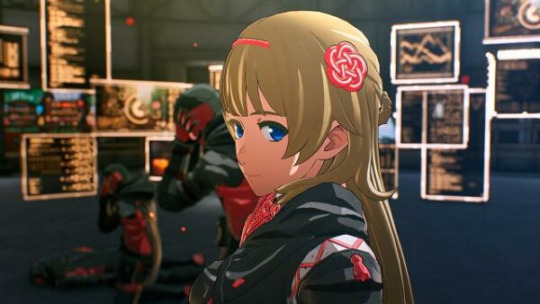
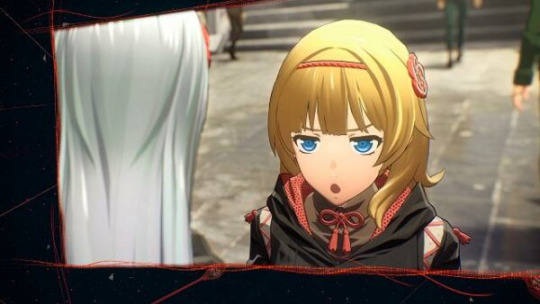
Cullen Travers (voiced by Nobuyuki Hiyama)
“Don’t waste my time.”
Power: ???
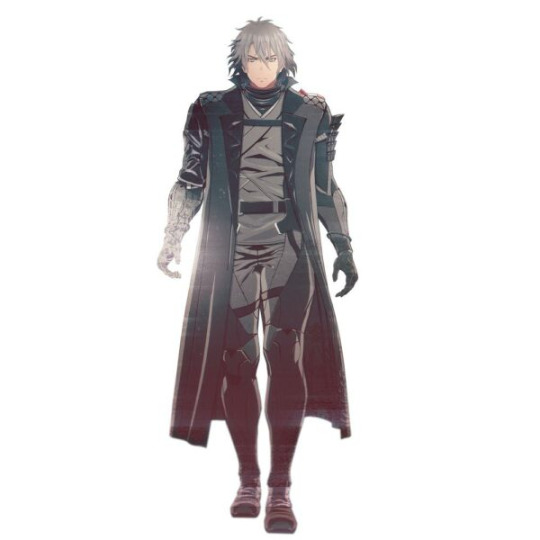
The commander of the 2nd Regiment of the OSF Army, and the order of the 1st class of the “Septentrion.” Even among the OSF’s most remarkable, his abilities are particularly outstanding. Since he is untalkative, self-confident, and does not mince words, he is sometimes described as arrogant. However, his overwhelming charisma and strength are irresistible assets that many members of the OSF admire.
As Luka’s older brother, they have lived together as siblings without other relatives. He is also childhood friends with Fubuki, the commander of the 1st Regiment of the OSF Army, with whom he graduated in the same class. Together, the two are known as the matchless duo of the OSF.
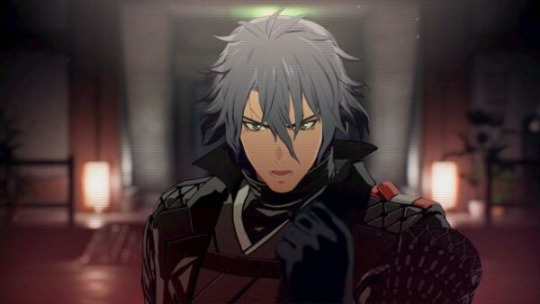
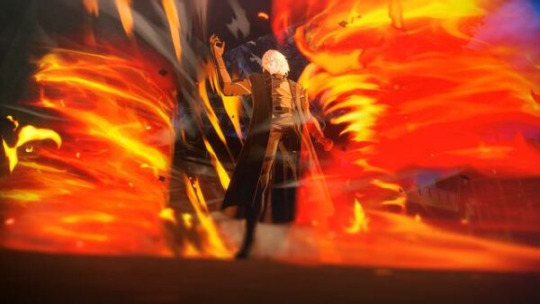
Scarlet Nexus is due out for PlayStation 5, Xbox Series X, PlayStation 4, Xbox One, and PC in summer 2021. Read more about the game here, here, here, and here. Read our in-depth preview here and watch the latest trailer here.
View the screenshots at the gallery.
9 notes
·
View notes
Text
Puppet Queen | Epilogue

ೃ‧₊› a b o u t t h i s p o s t° ➮ Pairing: Kayron x fem!reader ➮ Fandom: Epic Seven ➮ Series ➮ Tags: reincarnation ➮ Word Count: 383 ➮ Masterlist

You didn’t know how this happened or why it happened. It just happened. Years ago, you couldn’t have believed that this would happen, nor would you have wanted it to have happened. In fact, you would’ve done everything you could to change this. But now, there was nothing you wanted to change.
You didn’t think you’d find Kayron to be enjoyable around. You’d hated his entire existence for so long you couldn’t have thought otherwise and you didn’t think it was possible to. If there was something you learned from your mother recently, it was that revenge wasn’t always the way to go. She described how in wars in other continents, she heard that when one country took over another, they didn’t kill everyone. They may have killed those who threatened their power, but they didn’t kill those who couldn’t, even if they supported those who opposed them during the war. Instead, they took them in and took care of them, and the people there worked hard for their new country. Maybe it wasn’t better, living under another rule like that, but it was better than being killed, and many didn’t mind.
Sometimes, when you choose to defend rather than attack, you could gain something. Sometimes, you can’t tell a person’s true intentions under their actions. Maybe they were forced to; maybe they chose to. You weren’t a mind reader, nor was anyone else. You neer thought his weird interpretation of things you and everyone thought of normally could make you laugh, nor would you think you’d appreciate his blunt but sometimes mysterious ways of speaking. Perhaps the fact that you weren’t normal made you find those whom you could relate, and that made your heart vulnerable to him. Maybe it was pity, or the strong connection you had, be it negative or positive, that made that possible.
The winter festival was something you looked forward to again. Lots of good things happened during this time, and your career as one of Diche’s heirs felt like something from a fantasy novel.
Snow falling was something you used to perceive as annoying and something you preferred not to have. Now, though, sometimes they sparkled like diamonds.
“(Y/N), would you like to spend the rest of your eternity with me?”
“Yes, Kayron, of course.”

Taglist; @definetlynotseren
And that’s all! I hope this series was enjoyed by all who read it and I had fun writing it too! If you’d like to be tagged for my other works, feel free to fill out this form!
3 notes
·
View notes
Text
ink and coffee stains
a short fic loosely inspired by chatting with @bisidneycarter about secret love letters!
Sid x Sullivan (with mentioned Felicia x Flambeau!)
Pretty PG
Felicia reads a love letter that wasn’t intended for her, but it warms her soul anyway.
There’s been a body found on the edges of the Montague estate. Dastardly business, Felicia thinks to herself as Sid drives her to the police station at Kembleford.
She’s taking the maps of the grounds to the Inspector, and has volunteered to answer a few questions about the estate management to see if they might help find leads for the case.
Father Brown, of course, has also given her a second task of digging for any information she can find to help relating to the case. The Father is convinced it’s a murder connected to another in a neighbouring village, and needs all the information he can get.
Sid pulls up outside the station and helps her out.
Felicia heads for the door but stops up short when Sid doesn’t follow her. Normally he likes nothing more than to sit in the police waiting room, tormenting whichever Sergeant is watching the desk that day. The exception to this is when it’s Sergeant Goodfellow, of course, of whom Sid is rather fond, in which case they talk about village gossip and the biscuits Sid would like for the next time he’s in the cells.
But this time he seems hesitant, and pulls a cigarette from his pocket before leaning back against the Rolls. “If you don’t mind I think I’ll stay out here, have a cigarette.”
He seems distant and Felicia frowns in concern. He’s been not quite himself for a few days now, choosing to sleep at his quarters in the Main House rather than in his caravan. He’s been quiet too, lacking in his usual gregarious charm. Felicia even offered to make him a hot cocoa the other night, and he turned it down. He’s known for refusing any drinks Hercule makes (some nonsense about expecting poison), but he never turns down Felicia’s. Something is obviously afoot.
Felicia has her suspicions. While many believe her to be a ditzy, air-headed Lady of the Manor, she is in fact an astute observer and a shrewd judge of character. Working alongside Father Brown, and carrying on with an internationally wanted Art Thief has honed her skills even further.
Felicia senses that something has been going on between Sid and the Inspector. At first she thought they were just friends, but they spend an inordinate amount of their free time together and then fall out and act like strangers in public. If they were just friends surely there wouldn’t be the need for the distance and the secrecy. It’s all rather odd.
Felicia leaves Sid to it, sweeping in to the constabulary and throwing a winning smile at Sergeant Goodfellow. “Good Morning, Sergeant. It’s wonderful to see you. Apparently I’m required by the Inspector?”
Sergeant Goodfellow beams. “Morning your Ladyship. The Inspector said to bring you straight through.”
Goodfellow knocks on the Inspector’s office door and waits for a moment before entering.
“It’s Lady Felicia, sir. She’s here about the body.”
Sullivan looks surprised and a little startled at their intrusion, as if he’d been concentrating hard on something. He’d been writing, and writing a lot by the looks of it. There is some paper in front of him on the desk, filled with scribbles, and his fingers are ink stained. “Right, yes, of course. Lady Felicia, please, um, sit down. Thank you, Sergeant.”
He looks tired, Felicia thinks as she takes her seat. There are bags under his eyes, and his entire posture seems stooped, like it’s taking him real energy to hold himself up. He looks slightly scruffier than normal, too. Not so much that it would be noticeable ordinarily, but knowing the Inspector’s usually exacting style it looks a little out of place.
He’s frowning deeply, and hurriedly chivvies the paper he was writing on underneath some folders. He takes out his notepad and sighs. “Right. Lady Felicia if you could just --”
The door swings open again, and the Sergeant peeps his head round the door sheepishly. “Sorry to interrupt, Sir, but Head Office are on the phone and they want a word. They say it’s urgent.”
Sullivan looks like he’d hate nothing more than having to speak to Head Office right now. He sighs once more and stands up, running a hand over his face. “Apologies, Lady Felicia. I hope you don’t mind waiting, this will take just a few minutes.”
It’s no bother to Felicia at all. It’s the perfect opportunity for her to do a little snooping for Father Brown.
She stands and strolls around the desk, scanning the various folders and binders for anything that looks like it might be of use. There’s nothing really, disappointingly, and she’s about to give up and sit back down again before remembering the papers that Sullivan had shuffled away quickly.
She digs them out from under the folder, and holds them delicately, balancing them on her fingertips. Sullivan’s handwriting is so neat it’s almost difficult to read, very swirly and intricate. Someone has taught him penmanship since a young age, clearly.
Felicia isn’t exactly sure what she’s expecting to be on the pages. But what she reads causes her to gasp softly.
Mr. Carter,
I rather dislike you. Sometimes I am sure that I dislike no one more than you. You continually think it’s acceptable to break the law, to spend nights in the cells, and to make yourself a general nuisance to myself and my officers. I fear that I should hate you, even.
And yet somehow I can’t. I’m sorry that I shouted the other night. I’m sorry for losing my temper and saying what I said. My problem is that I care for you, far too much than is allowed. It is my worst nightmare to see you walked into court and carted off to the cells for months, maybe years, maybe more. I know Father Brown has good intentions but you cannot deny that the man is occasionally reckless. And I know you think it’s fun to go along with him. My problem, Carter, is that while sometimes I really do not like you, I am afraid that I’m falling irrevocably in love with you instead.
You make me feel things that I have never felt in my life. Just the sight of you makes my heart beat faster and steals some of my breath away. I feel safe with you, like I could trust you with a thousand secrets and you’d never breathe a word. I feel important, and special, and good enough. I don’t think I’ve ever felt good enough for any one. I find myself wanting to talk to you for hours, and to listen to your views on everything and nothing at all. I think I could sit in silence and watch you and I would still be enthralled.
I have never felt fire like when you kiss me. How am I supposed to go about my day, sitting at this tiresome desk, when all I can think of are your arms around my waist and your lips at my neck? How can I listen to those hopeless love songs they play on the wireless and not want to be held close by you? How has my life been so discontented by something so small?
Perhaps you will think this is silly, and that this is all just a game to you. Well I’m afraid if that is the case then I can’t play it any longer. This cannot be something meaningless or fun to me anymore. My heart won’t settle until it knows you are mine. I am sorry, Sid, for the way I have been recently. But I hope now you understand why, and why truly I cannot help myself. I can only hope my feelings are returned. I am not sure what I will do if they aren’t.
Your Tommy
Felicia drops the letter back on to the desk and swallows thickly. A lump has formed in the centre of her throat, and she feels a little choked up. For someone so cold, stoic, and often emotionless Inspector Sullivan has the burning passion of a classical poet.
She feels rather guilty, then, in that moment. She is occasionally rather dismissive towards the Inspector, irritated by his sometimes contemptuous and ungrateful manner, but now she thinks they have a lot more in common that she had realised. She too knows how it feels to have been so repressed and unloved and neglected for many years. She knows how it feels to have to choke down your feelings, and never let them out. She knows how it feels to hide them behind arrogance, a cold, steel wall that very few get to see behind. A way of protecting one’s self from harm.
And yet she also knows the feeling when someone who just fits appears in your life. Someone who breathes life back into your soul and sets you free on a whirlwind of emotions. It’s a beautiful, if terrifying feeling, falling in love. Especially if it’s with someone who should be deemed entirely inappropriate, and rather criminal. She knows that feeling all too well.
It turns out that Inspector Sullivan is something of a hopeless romantic. She wonders if he’d like to read her novels.
And how wonderful it is that it’s darling Sid. Sid has allowed him to feel like this. Sid has obviously sparked something within him that has made him want to let out all of his emotions rather than keeping them bottled up. Her suspicions about the pair of them were correct. She wasn’t quite sure it had gone as far as it clearly has, but she can’t be anything less than delighted. It’s about time that someone saw Sid for the kind, protective and intensely loving soul that he really is - it was about time someone could return that love with the same ferocity.
Felicia resolves to never tell a soul about this. This is between the two men to sort out. She has no doubts that they will, and by the state of both of them it’ll happen sooner rather than later. She tucks the letter away, back where Inspector Sullivan had hidden it, and returns to her chair.
Sullivan returns moments later, looking a more than a little stressed, and drops himself heavily into his chair.
Thomas, she presumes. Tom to friends, and Tommy to someone who holds his heart in his hands.
Inspector Sullivan takes her statements quickly and tells her she is free to go. Felicia bids the Inspector goodbye far more warmly than usual.
As he escorts her from his office, she notices Sid has wandered in to wait for her. He stands up bolt straight almost immediately, his hands twisting anxiously on his cap. “Your Ladyship.”
Your Ladyship. Felicia tries not to scoff. Such formalities are rare from Sid these days. He also seems to be looking through her, at someone standing behind her. One doesn’t have to be a sleuth of Father Brown’s calibre to work out who exactly.
She also feels the Inspector tense behind her. For a moment they stand in perfect, unmoving silence, gazing at each other.
Sergeant Goodfellow appears to be busying himself with some paperwork on the front desk, but Felicia is sure there is a suppressed smile on his face. She wonders if he knows too.
It is Sergeant Goodfellow who puts them out of their misery. He informs the Inspector that there’s something in the back office that needs attending to, and Sullivan snaps out of his reverie.
“Right, yes. Thank you for your assistance your Ladyship. We’ll be in touch if we need you further.” With one last glance Sid’s way, he disappears into the back of the station.
Sid is staring helplessly at the door the Inspector had ducked in to.
Felicia presses a hand to his cheek. “Sidney,” she calls softly, waiting for Sid’s eyes to tear themselves away from the door and on to her face. “Father Brown is expecting us for elevenses soon, we’d best be going.”
“Right, yes, of course.” Sid bumbles, pulling his hat on quickly and offering her his arm.
Felicia takes it fondly. This is why Sid has been so glum recently. Now she knows it’s his first real lovers’ tiff. She has no doubt that the Inspector’s feelings are returned just as vociferously. What a silly pair.
She’ll make sure Mrs M gives Sid an extra scone to cheer him up.
#father brown#sid x sullivan#sid carter#inspector sullivan#lady felicia#sergeant goodfellow#i love the idea that sullivan is secretly a hugely emotional romantic soul but he just bottles it all up until he has no choice#flexing my writing muscles and im very out of practice but i hope someone enjoys#also i hope the read more works on mobile#PLEASE LET ME KNOW IF IT DOENST#will i probably do a sid reply to this?#almost certainly yes#when i dont know#but probably#love letter au
31 notes
·
View notes